
2018 Sigma Tau Delta Conference
The Department of English & Theatre is proud to send three of its students to represent the University of Scranton at the 2018 Sigma Tau Delta Convention in Cincinnati, OH on March 21-24, 2018.

The Department of English & Theatre is proud to send three of its students to represent the University of Scranton at the 2018 Sigma Tau Delta Convention in Cincinnati, OH on March 21-24, 2018.
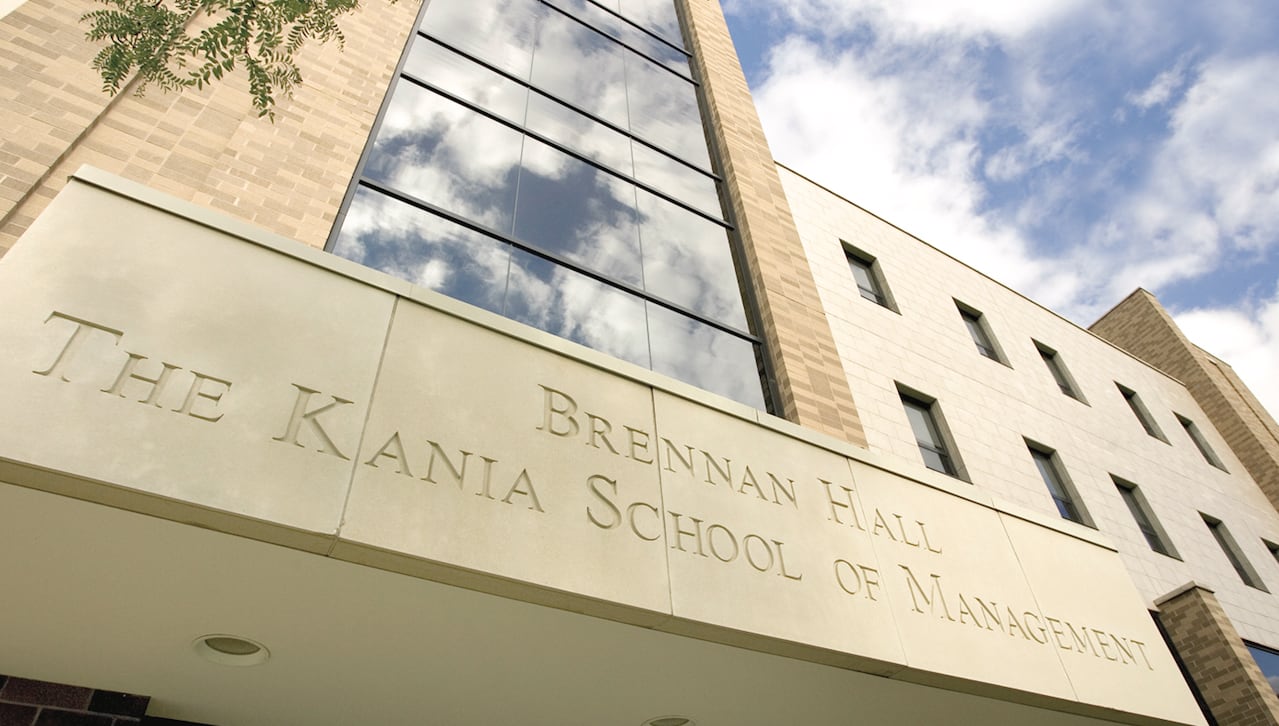
The University of Scranton’s marketing campaign promotes “opening doors” through the transformational Jesuit education students receive. Several alumni, who serve as professors at Scranton, wholeheartedly agree with the statement and have started a pilot program to “open doors” to local high school students, especially those from disadvantaged backgrounds.
The Business High School Scholars Program, which will begin this summer as a pilot program, builds on the University’s successful High School Scholars Program that allows high school students meeting academic requirements to take college courses at a reduced rate of $175 per credit, or $525 for a three-credit class. The Business High School Scholars Program seeks to group sophomore and junior high school students interested in pursuing a business degree at Scranton into a cohort, and, most importantly, to provide financial support to participants from economically disadvantaged backgrounds.
“I grew up
This sentiment is echoed by fellow area natives who are also Scranton alumni now teaching at the University. Together, they will teach additional classes specifically for the high school students and donate their compensation from these courses to provide scholarship support to participating students from economically disadvantaged backgrounds. Additional support will be offered by the University’s Jesuit Center.
The courses will be offered in the summer, early mornings or late afternoons in order to accommodate the schedule of high school students. The structure of the program will encourage students to progress through the curriculum as a
“Any high school student afforded this opportunity will be challenged to become their deepest, truest selves – for that is the person God needs to build a world of peace and justice for all,” said Rev. Richard Malloy, S.J., University Chaplain, who will also teach a theology course as part of the program. “At the University, we want to serve youth from all sectors of society. We want to help form the future of Northeastern Pennsylvania.”
The program is open to local high school sophomores and juniors with a G.P.A. of 3.3 (B+) or higher and who meet other program requirements.
An information session for the Business High School Scholars Program will be held on Wednesday, March 21, at 6:30 p.m. in the Rose Room of Brennan Hall on campus.
For additional information visit Scranton.edu/bhsscholars, email Rebekah.bernard@scranton.edu or call 570-941-5918.
The University will pilot a new Business High School Scholars Program this summer for sophomore and junior high school students.
College students from across Northeast Pennsylvania gathered at The University of Scranton on Saturday to attend the annual Ignite Student Leadership Conference and hone their leadership skills.
Award-winning entrepreneur and author Justin Jones-Fosu provided the keynote address at the conference.
“For me this is about the totality of who you are and not just about what you do as a student or what you do as a leader – but who you are as a person,” said Jones-Fosu, who travels the world spoken and has given more than 450 presentations at 250-plus organizations.
Jones-Fosu discussed four traits that he feels make leaders successful. The traits are being humble, empowering, relational and optimistic. When it came to being relational, he wanted students to become people for others.
“Give your all, fight for those that you serve,” Jones-Fosu said.
Students from The University of Scranton, Bloomsburg University, Marywood University, Misericordia University, Luzerne County Community College, Northampton Community College and Lackawanna College attended the 26, 50-minute-long concurrent sessions on multiple leadership topics held throughout the day. The format allowed participants to choose the educational sessions they wanted to attend. The topics ranged from the importance of self-care to workshops about safe-zones.
Originally named the Royal Leadership Conference, the Ignite Student Leadership Conference started eight years ago, founded by the University’s Center for Student Engagement with the goal of engaging students to become future leaders.
College students from across Northeastern Pennsylvania gathered at The University of Scranton to ignite their leadership skills.

Information Technology and the Library are jointly conducting the national Measuring Information Service Outcomes (MISO) survey over the next two weeks.

The University of Scranton recently unveiled the official Shamrockin' Eve 2018 t-shirt design.


In 2009, the University held its first Shamrockin' Eve. The event was founded by a group of young alumni who wanted to reconnect with Scranton and each other prior to their five-year class reunion. It quickly evolved into an opportunity for current seniors and recent graduates to contribute to the success of future University students.
This year's event will take place March 9 from 8:30 to 11 p.m. in the Byron Center. All alumni from the classes of 2009-2017 are invited to participate. Alumni can visit regonline to register for the event; the cost of alumni admission is $35. Students must register on campus.
For more information, visit scranton.edu/shamrock or contact Alex Maier, assistant director of Annual Giving, at alexandra.maier@scranton.edu.
Register Today For Shamrockin' Eve 2018.
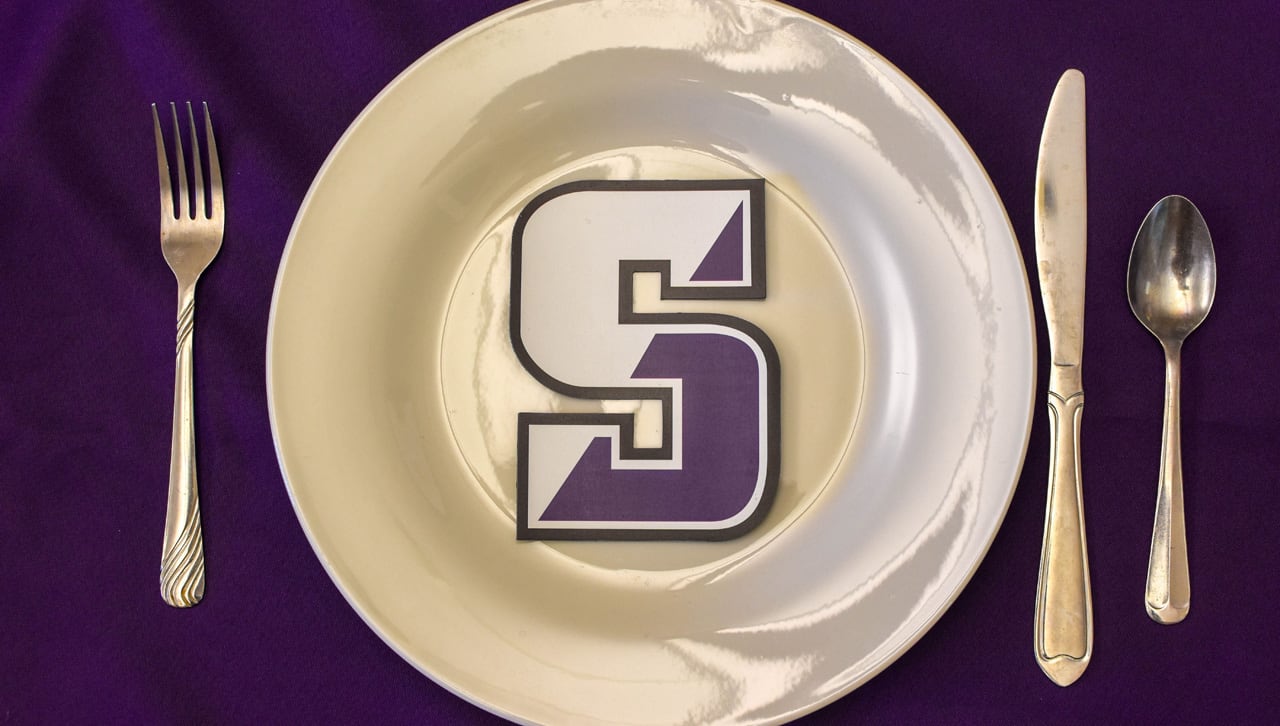
The University of Scranton NEPA Dinner Series will continue at 6 p.m. March 6 at Market Street Grill, 223 W. Market St., Scranton, Pa, 18508.
The dinner, open to all alumni, parents and friends of the University, will include a choice of soup or salad, an entree and dessert at a rate of $30 per person. Visit regonline to register for the dinner, or contact Lynn King Andres '89, associate director of Alumni and Parent Engagement, at lynn.andres@scranton.edu.
Royals To Gather At North Scranton Eatery.
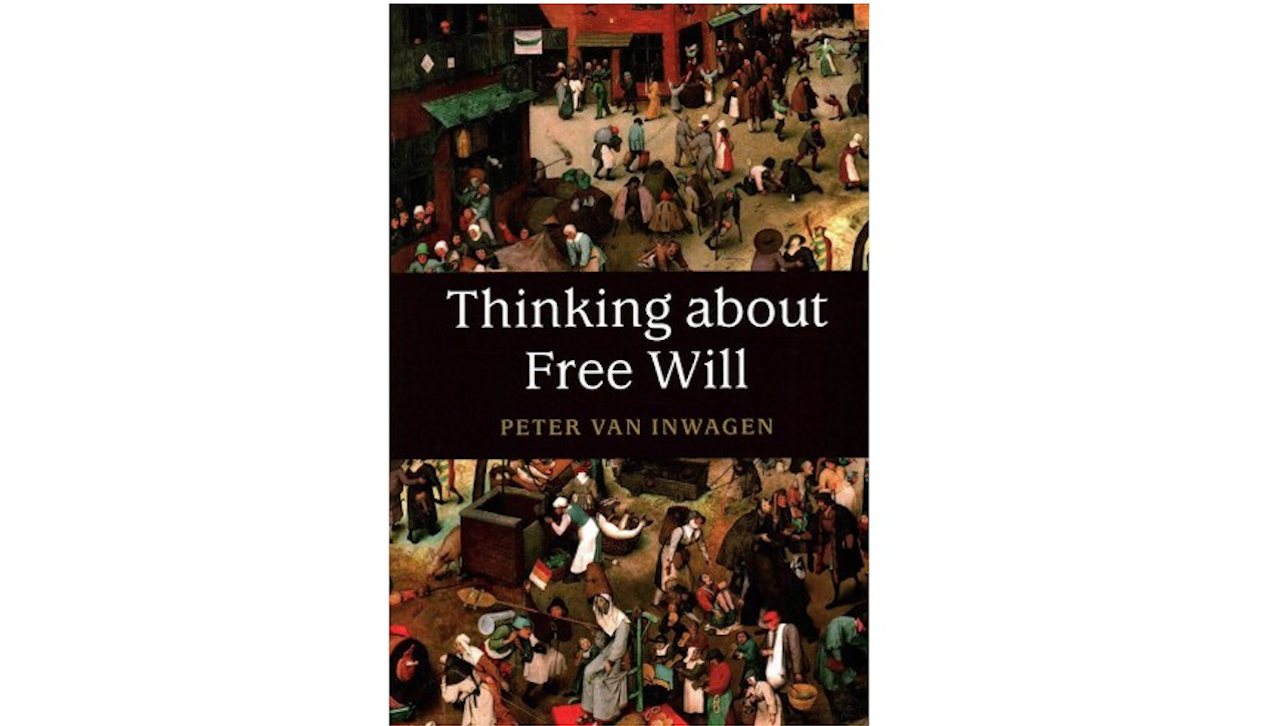
The University of Scranton’s chapter of Phi Sigma Tau, the international honor society in philosophy, will host the second annual undergraduate philosophy conference March 2 and 3 on campus. The Phi Sigma Tau Philosophy Conference, which is presented free of charge and is open to the public, will feature a keynote presentation by Peter van Inwagen, Ph.D., the John Cardinal O’Hara Professor of Philosophy at the University of Notre Dame, as well as selected student presentations.
A highly-regarded philosopher of metaphysics and religion as well as the philosophy of action, Dr. van Inwagen will discuss “Does Ought Imply Can?” at 5 p.m. on Friday, March 2, in the Heritage Room of the Weinberg Memorial Library. Dr. van Inwagen is the author of numerous articles published in academic journals as well as nearly a dozen books. His latest book “Thinking about Free Will,” published in 2017 by Cambridge University Press, examines moral responsibility and free will in the context of causal determination. Students in the honor society read this book and invited him to provide the keynote address at the conference.
Students selected to present papers include three University of Scranton students and three students from other colleges. Scranton students presenting are: Michael Powell of Conklin, New York; Anne Kennedy of Conshohocken; and Erica Westlake of West Chester. The three other students presenting are: John Mayers, William Patterson University; Daniel Shussett, Gettysburg College; and Benjamin Slightom, Ball State University.
All conference presentations are free of charge and open to the public. For additional information, contact Andrew LaZellla, Ph.D., associate professor of philosophy and moderator of the Phi Sigma Tau honor society chapter at Scranton, at 570-941-7757 or email andrew.lazella@scranton.edu.
The University will host the second annual Phi Sigma Tau Philosophy Conference March 2 and 3 on campus.
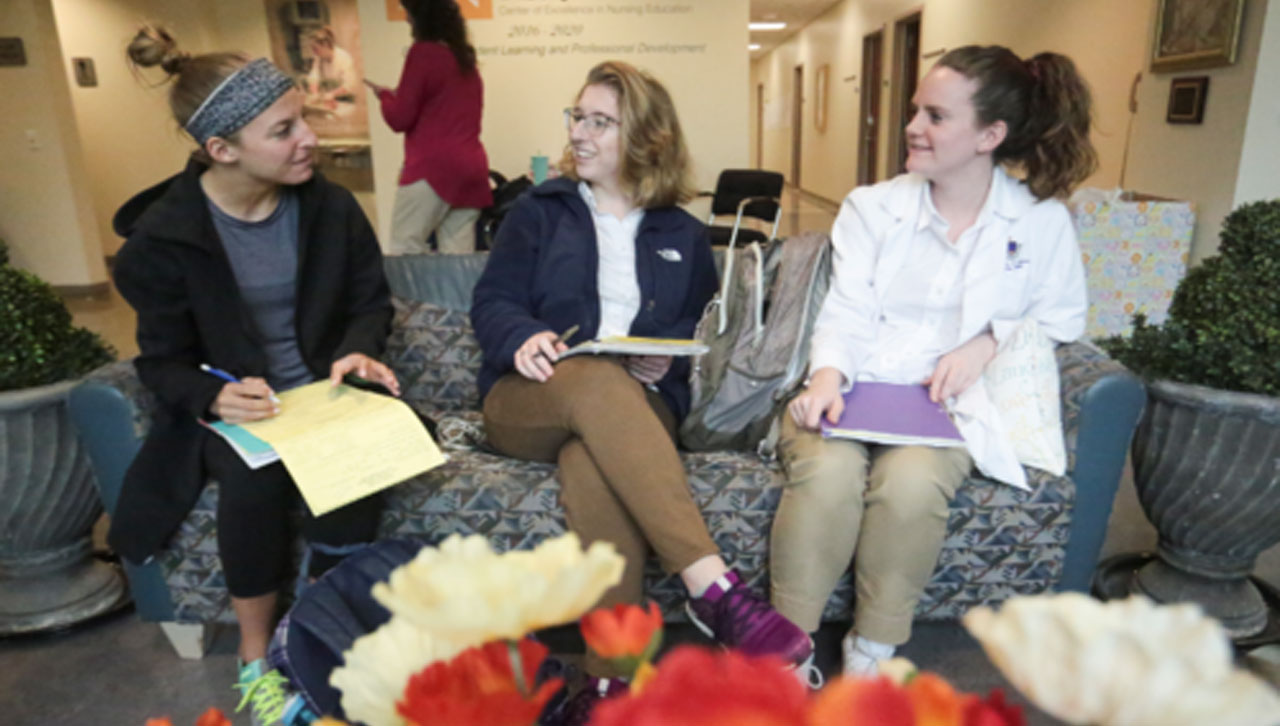
University of Scranton students will be mentoring Scranton High School students to teach them about
The Megan Cullen-Brown SMART (Scranton Mentors Actively Reaching Teens) mentoring program is an action made by the Campus Ministries’ Center for Service and Social Justice to help engage local students that are not adjusting well to high school. The Scranton High School mentees meet with their University of Scranton student mentors every Friday from February until April to view presentations.“The presentations will be around things like
The 18 student mentors make the presentations with the goal in mind to connect with the high school mentees. The student mentors trained with faculty members during the previous fall 2017 semester.“College students identified things that they felt were most pressing to a freshman or sophomore in high school,” Vaccaro said.
There is a graduation ceremony in May for the high school mentees and their families are invited. At the
James McCabe, a junior at The University of Scranton, was a mentee in the SMART program while he was at Scranton High School.“
The SMART program has returned after a hiatus and is currently running for the spring 2018 semester.
University of Scranton students mentor Scranton High School students on self image and reaching a higher education.
The Asian Studies program will host several events on campus during the spring semester to highlight Asian culture and raise awareness about Asian holidays. The first of these events, an Asian New Year Celebration Workshop, took place Feb. 21 and allowed students, staff, faculty and area residents to create their own New Year artwork. Activities, assisted by University students from both Chinese and Japanese classes and members of Asia Club and Asian Studies Honor Society, included calligraphy, Chinese painting and Japanese origami.
Asian Studies, Asian Studies Honor Society and Asia Club will host a Chinese Lantern Festival, where attendees can create and decorate their own lanterns, on Thursday, March 1, at 7 p.m. on the second floor of The DeNaples Center. Participants can make a wish and take the lantern home after decorating it or leave the lanterns on display on the 2nd floor of The DeNaples Center through March 9. After March 9, the attendees are encouraged to take their lanterns home for a year of prosperity.
The Asian Studies Spring Lecture Series will feature presentations by Kathryn Hemmann, Ph.D., from George Mason University and Ori Tavor, Ph.D., from the University of Pennsylvania. Dr. Hemmann will discuss “Strong Female Characters: Gender, Gaming, and Digital Cultures in Japan” and Dr. Tavor will present “Designer Babies and the Ethics of Human Enhancement: A Confucian Perspective.” The event, co-sponsored by the Asian Studies Program, the Department of World Languages and Cultures, the Philosophy Department, and the Department of Latin American Studies and Women’s Studies, will take place on Thursday, April 12, at 11:30 a.m. in the Pearn Auditorium of Brennan Hall.
Holi, the Indian Festival of Colors, is planned for Saturday, April 21, at 1 p.m. on the Dionne Campus Green. The event will include authentic Indian cuisine and a variety of activities to celebrate the Hindu spring festival and the upcoming Asian Pacific American Heritage Month of May.
All events are free of charge and open to the public. For additional information, call 570-941-7643 or email asianstudies@scranton.edu.
The University’s Asian Studies program has planned multiple events during the spring semester to highlight Asian culture.
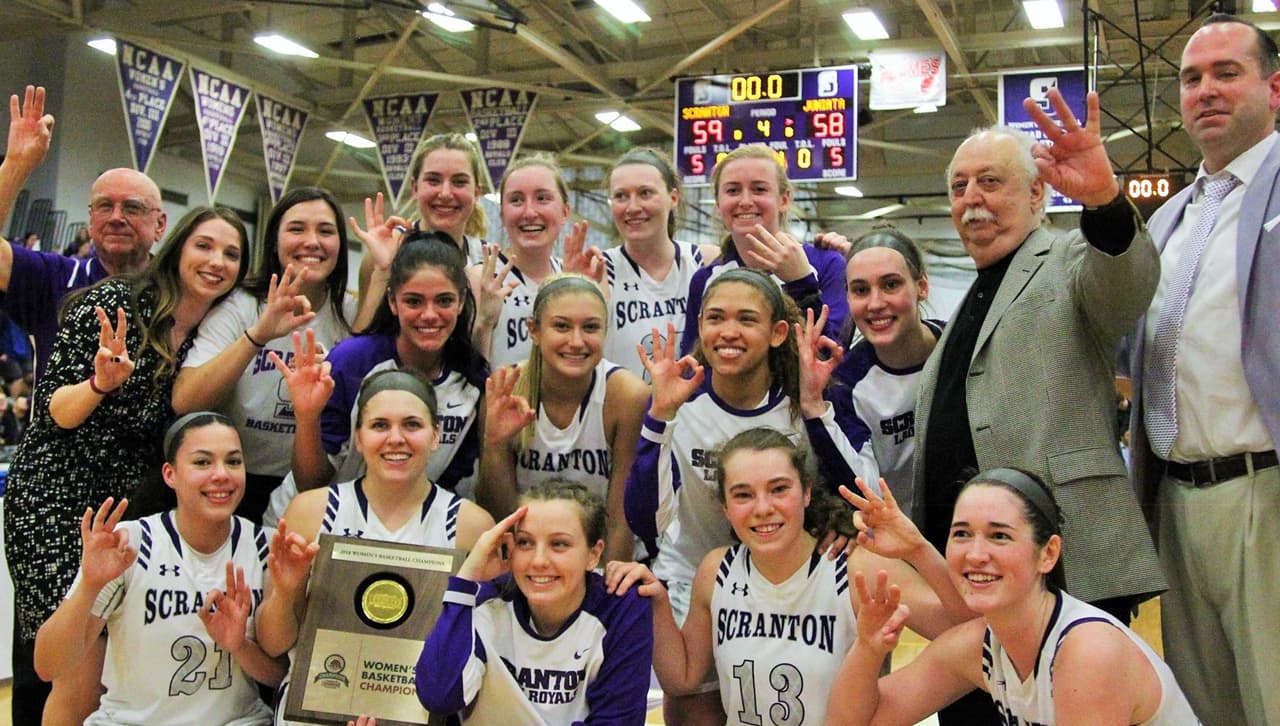
The University of Scranton women's basketball team won its third straight Landmark Conference championship on Saturday.

As part of the Faculty Seminar Series, George Aulisio, associate professor, presented his latest research. Read more about his research below.
I am researching the philosophy of mind, and incorporating aspects from metaphysics, general science, and the philosophy of science to try and offer explanations for a number of interrelated puzzles in the philosophy of mind. One puzzle, in particular, is the tension between having a mind that meets the conceptual standards of how we perceive our minds while still allowing for the mind to be causally efficacious.
To elaborate, the 17th-century French philosopher René Descartes conceptualized the mind as something completely different than the brain. The stark difference that Descartes drew leads to what we call the problem of interaction. One way to resolve the problem of interaction is to reduce the mind down so that it is identical to the brain, but reducing the mind down to the brain comes at a price. Arguably, there’s no satisfactory way to explain the qualitative aspects of mental life and what we commonly refer to as free will by way of reduction to the brain. In other words, we tend to lose the mind’s essential characteristics when we shift all of our focus to the brain.
The puzzle involves determining how we can save the mind’s unique characteristics while keeping it causally connected to the brain, and do all of this without violating our best scientific knowledge. I argue that our best hope of making this possible is by embracing the non-reductive theory of emergence, or the view that there are non-reducible properties or phenomena that arise from complexity. In these theories, the mind would be an emergent phenomenon of the brain. This is only one step, however, we also have to expand our view of causation to also incorporate holism, a worldview that tells us larger system can have causal effects on its parts.
As part of the Faculty Seminar Series, George Aulisio, associate professor, presented his latest research. Read more about his research below.

The Institutional Research Office is administering the National Survey of Student Engagement (NSSE) to University of Scranton freshman and seniors during Spring 2018. The Institutional Research Office has administered this widely-used survey six times since 2005 and considers it to be one of the most useful ways to gauge students' engagement and satisfaction with their college experience.
Over 500 academic institutions participate in the NSSE annually, and Scranton compares its results with peer institutions to see how we rank. Results are made available to the University community via reports that are posted on the Institutional Research Office's web page. To see prior year's reports, please click here.
An invitation to freshman and seniors to participate in the survey was sent from the Provost on February 14. Several email reminders will be sent through February and March. Freshman and seniors can also access the survey link in the University of Scranton portal on the Student Tab. In appreciation for your effort, all students who complete the survey by April 30 will be entered into a drawing to win one of two (2) Amazon gift cards worth $300 each.
The Institutional Research Office is administering the National Survey of Student Engagement (NSSE) to University of Scranton freshman and seniors during Spring 2018. The

The Institutional Research Office is administering the National Survey of Student Engagement (NSSE) to University of Scranton freshman and seniors during Spring 2018. The Institutional Research Office has administered this widely-used survey six times since 2005 and considers it to be one of the most useful ways to gauge students' engagement and satisfaction with their college experience.
Over 500 academic institutions participate in the NSSE annually, and Scranton compares its results with peer institutions to see how we rank. Results are made available to the University community via reports that are posted on the Institutional Research Office's web page. To see prior year's reports, please click here.
An invitation to freshman and seniors to participate in the survey was sent from the Provost on February 14. Several email reminders will be sent through February and March. Freshman and seniors can also access the survey link in the University of Scranton portal on the Student Tab. In appreciation for your effort, all students who complete the survey by April 30 will be entered into a drawing to win one of two (2) Amazon gift cards worth $300 each.
The Institutional Research Office is administering the National Survey of Student Engagement (NSSE) to University of Scranton freshman and seniors during Spring 2018. The
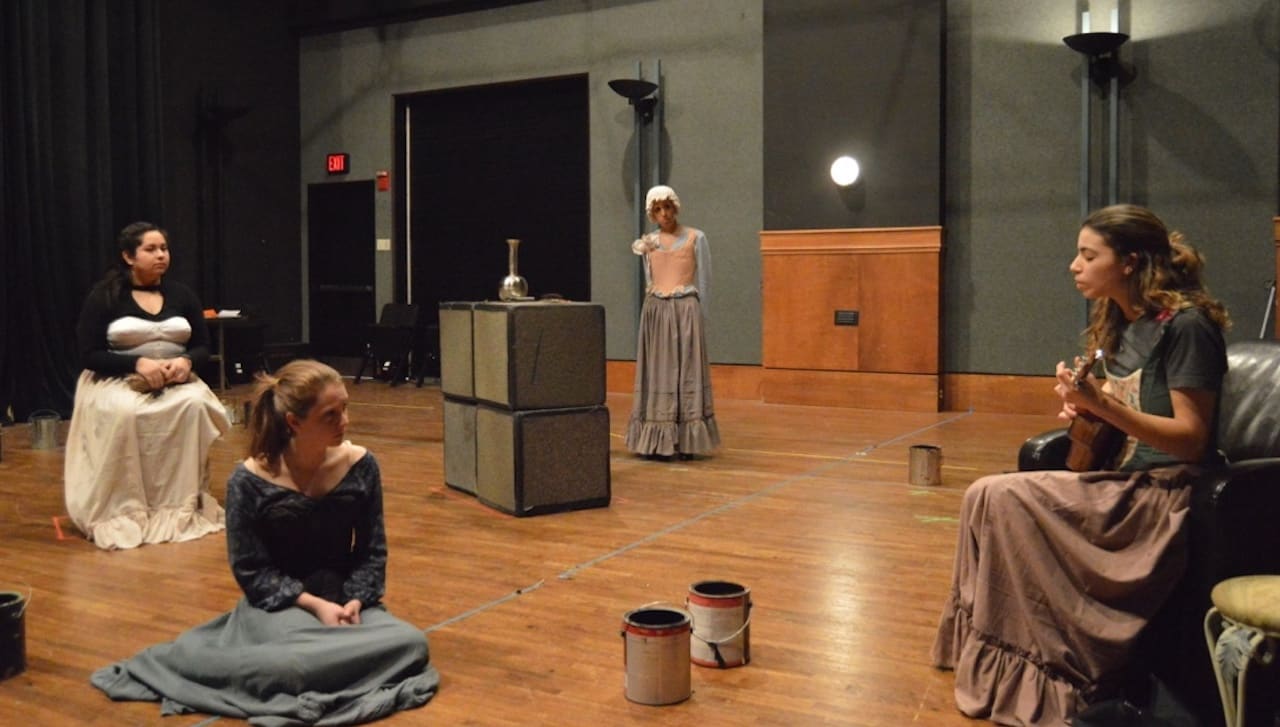
The University of Scranton Players will present Jen Silverman’s play “The Moors,” directed by Estefanía Fadul. The show will run Thursday through Sunday, March 1-4, in the Royal Theatre of the Joseph M. McDade Center for Literary and Performing Arts. Thursday, Friday and Saturday performances begin at 8 p.m., and Sunday shows begin at 2 p.m.
“The Moors” follows two sisters and their dog living on the English moors as they wrestle with desires and expectations of love and power. This dark comedy premiered at Yale Repertory Theatre in 2016 and opened off-Broadway in New York City in February 2017 at The Playwrights Realm. Silverman is the recipient of the Yale Drama Series Award and the Helen Merrill Award.
The production features Sophia Cornejo of Hazleton as Agatha; Ali Basalyga of Scranton as Huldey; Shaye Santos of Wrightstown, New Jersey, as Emilie; Julia Consiglio of Oceanside, New York, as Marjory; Conor Hurley of Woodside, New York, as The Mastiff; and Reilly Charles of Rockaway Park, New York, as A Moor-hen. Basalyga is a graduate of West Scranton High School and Cornejo is a graduate of Hazleton Area High School.
Additionally, the production showcases design and direction from award-winning guest artists. The creative team for “The Moors” includes Heidi Hoffer, set designer; Janice Tellier, costume designer; Dave Yezefski, lighting designer; Sinan Refik Zafar, sound designer; and Estefanía Fadul, director. Hoffer is currently a Fulbright Specialist in Islamabad, Pakistan working at Theatre Wallay, and she has previously been awarded the 2010-2011 Fulbright Scholar Award to South Africa. Fadul is the recipient of the 2017 Bill Foeller Fellowship at the Williamstown Theatre Festival in addition to the 2017 O’Neill/NNPN National Directors Fellowship.
Tickets may be purchased or reserved by calling the box office inside the McDade Center, 570-941-4318, or online at thescrantonplayers.com. Tickets are $10 for adults and $7 for senior citizens, students, and University of Scranton faculty and staff.
For more information, contact players@scranton.edu or find us on Facebook, Twitter, and Instagram.
The University of Scranton Players will present “The Moors” by Jen Silverman Mar. 1-4 at the McDade Center for Literary and Performing Arts.
More than 40 University of Scranton faculty and staff members attended a Political Dialogue Facilitation Training Workshop on campus in January. The training, which included instruction in a reflective, structured dialogue method led by Essential Partners and principles of Ignatian dialogue led by the University’s Jesuit Center, is part of an ongoing “Bursting our Political Bubbles” civic engagement initiative aimed at addressing political polarization. The University will host student “Dialogue across Differences” sessions Mar. 26, Apr. 9 and Apr. 25. From left are: From left: Jessica Durkin, administrative assistant, Office of Community and Government Relations; Jessica Nolan, Ph.D., associate professor of psychology; Amy Simolo, faculty specialist, Center for Teaching and Learning Excellence; Rev. Patrick Rogers, S.J., executive director, the Jesuit Center; Jean Wahl Harris, Ph.D., professor of political science; Teresa Grettano, Ph.D., assistant professor of English and theatre; Mary Jacksteit, Essential Partners; Jose Sanchez; assistant director, Cross Cultural Centers; Jennifer Laporta, J.D., executive director, Office of Equity and Diversity; Gretchen Van Dyke, Ph.D., associate professor of political science; Cyrus P. Olsen III, Ph.D., associate professor of theology and religious studies; and Julie Schumacher Cohen, director, Office of Community and Government Relations.
The political dialogue civic engagement initiative is sponsored by The Jesuit Center together with The Ellacuría Initiative, the Center for Teaching and Learning and the Political Science Department, with additional support from the Office of Community and Government Relations, the Office of Equity and Diversity, the Provost’s Office, the Division of Student Formation and Campus Life and faculty from various academic departments.
University hosts Political Dialogue Facilitation Training Workshop for faculty and staff as part of an ongoing civic engagement initiative.
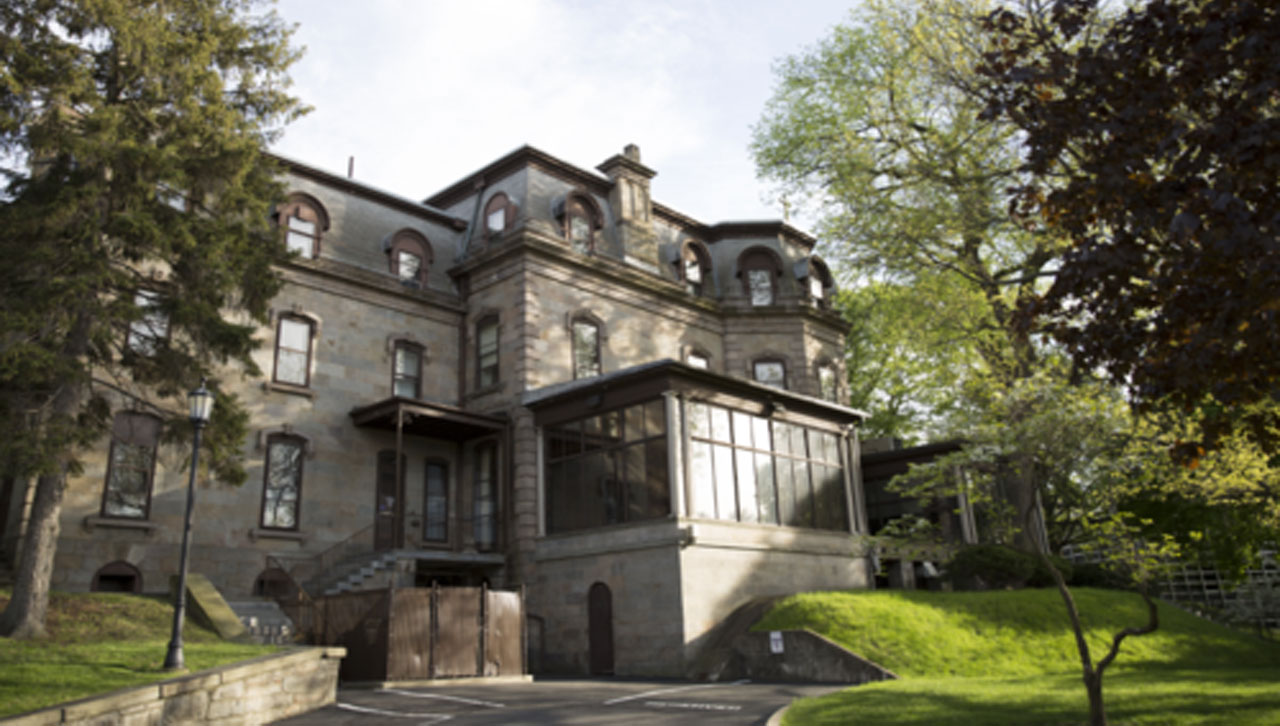
The Office of Human Resources is pleased to announce that Frank Locatell from Transamerica will be on campus for individual retirement counseling sessions on Mon, March 5.

Create and decorate your own lantern on Thursday, March 1 from 7 p.m. - 9 p.m., 2nd floor of the DeNaples Center.
Walk-ins welcome. No RSVP needed. First come, first served, until all lanterns are given away. Create and decorate your own lantern. Have fun with friends.
Lantern Festival is one of the most celebrated Chinese festivals. Make a wish and take it home, or leave it on display at the student center until March 9 to share the cheery spirit with others (after 3/9, take it home to decorate your own space!). For more information, call 570-941-7643 (Asian Studies Office) or email: ann.pang-white@scranton.edu.
Create and decorate your own lantern on Thursday, March 1 from 7 p.m. - 9 p.m., 2nd floor of the DeNaples Center.

The Office of Equity and Diversity and the Diversity Initiatives Review Board (DIRB) is seeking applications for new Diversity Initiatives Grants.

Don't miss the Jostens College Ring Event!
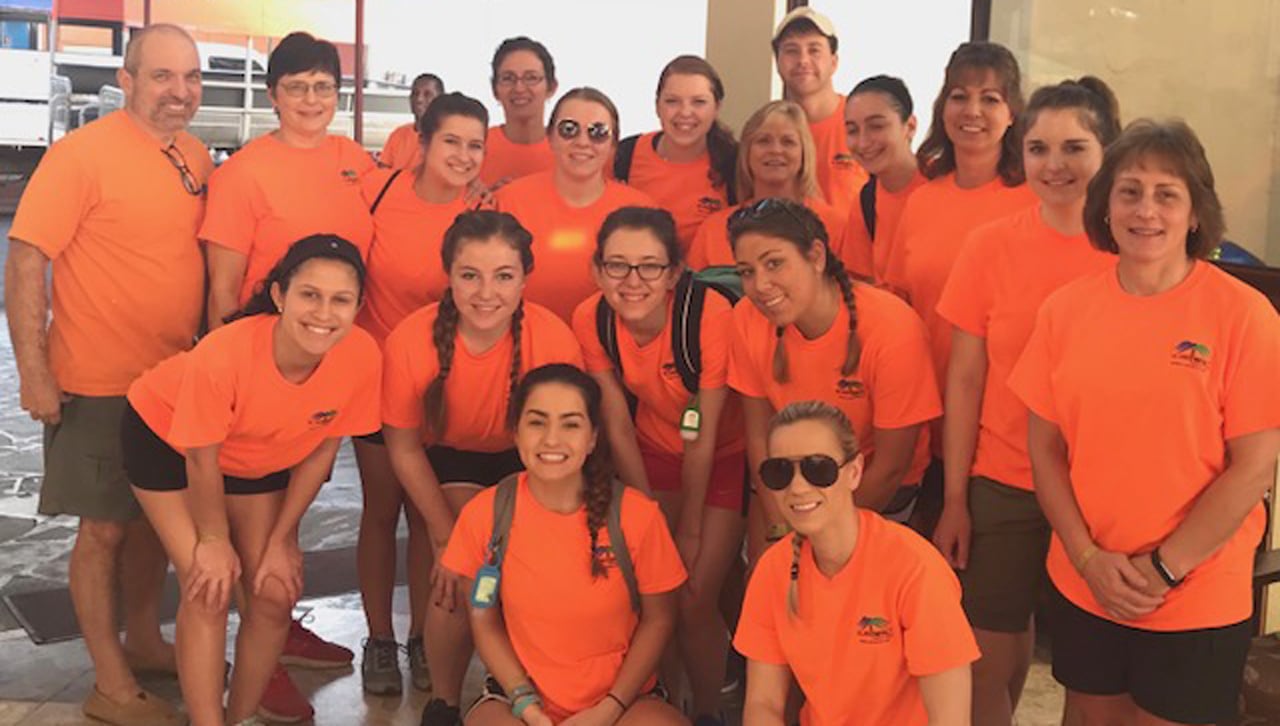
In collaboration with Island Impact Ministries and University of Scranton alumni, 11 nursing students and two faculty members traveled with a team of healthcare providers and other volunteers to the Dominican Republic in January 2018.
During this service-based mission trip, ambulatory medical clinics were set up on a daily basis in a variety of locations and medical care was provided to approximately 1,000 impoverished Dominican and Haitian residents, including hundreds of infants and children. Through several fundraising efforts and generous donations from the community, 30 large suitcases were filled with medications and a variety of health and hygiene supplies. The team plans to return again in 2020.
In collaboration with Island Impact Ministries and University of Scranton alumni, 11 nursing students and two faculty members traveled with a team of healthcare providers and other volunteers to the Dominican Republic in January 2018.

The Theta Iota Chapter of the Foreign Language National Honor Society, Alpha Mu Gamma, is in the process of enrolling new members. Requirements are the following: a) for full membership, two consecutive A’s or A-‘s in language courses (in the same language) at the Composition and Conversation (311-312) level or above; b) for associate membership, two consecutive B+’s or better in language courses (in the same language) at the Composition and Conversation (311-312) level or above, or a noteworthy academic record in more than one language. Applicants must have a cumulative GPA of at least 3.0. All applications are individually screened. Only completed semester grades are considered. Application forms are available from the Department Secretary, 301 O’Hara Hall, as well as from
The induction ceremony and luncheon will take place in The DeNaples Center 405 on Thursday, April 19, 11:30 a.m. to 1:00 p.m. Inductees will receive their certificates of membership and society pins; graduating seniors will receive their gold honor cords.
Deadline for applications and payment of fee: Wednesday, March 21, 2018. The membership fee of $65.00 includes the luncheon. Applications without fees will not be considered. Please make checks (cash accepted also) to the University of Scranton and drop off completed applications at O’Hara 301.
The Theta Iota Chapter of the Foreign Language National Honor Society, Alpha Mu Gamma, is in the process of enrolling new members.

The 10th annual Bochicchio Sports Character Initiative Conference will be held on Monday, March 5, in the Moskovitz Theater, DeNaples Center Fourth Floor.
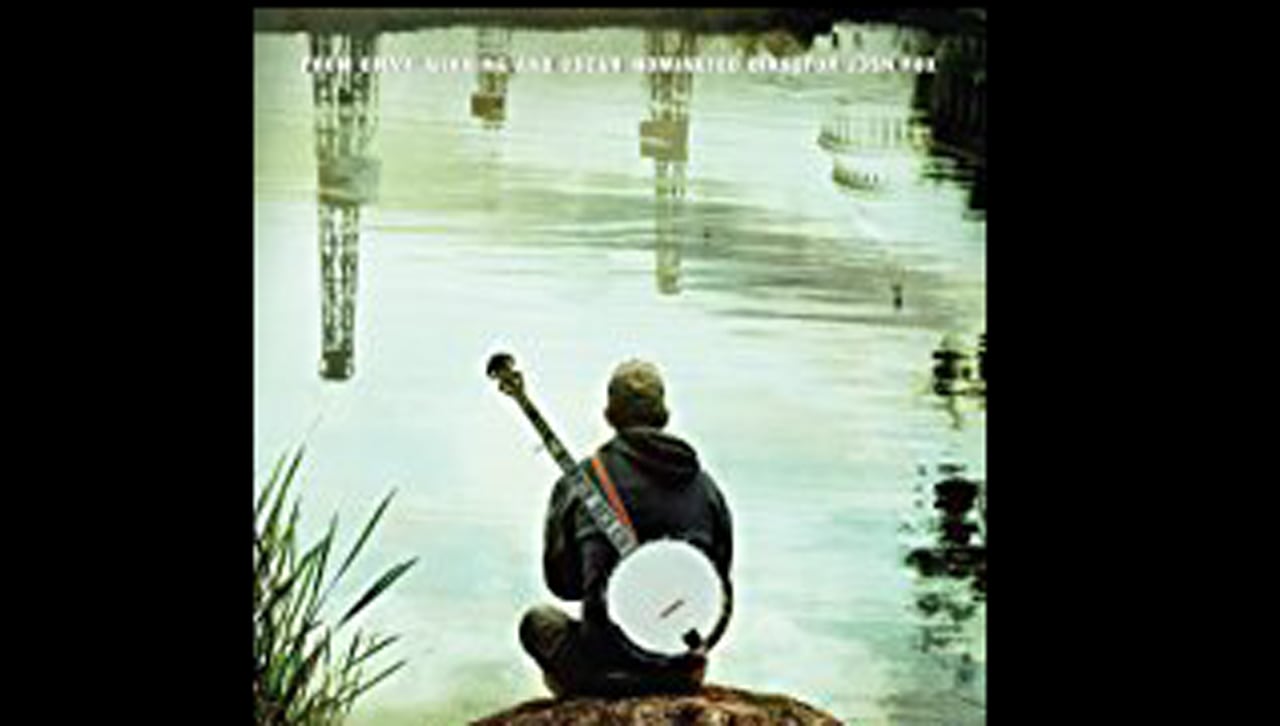
Gasland Part 2 Movie
A glimpse into the potential long-term environmental effects of hydraulic fracturing
Wednesday, Feb. 28, 2018
6:30 p.m.
DeNaples Center/Moskovitz Theater
Short Q&A session with Fossil Free Scranton
A glimpse into the potential long-term environmental effects of hydraulic fracturing
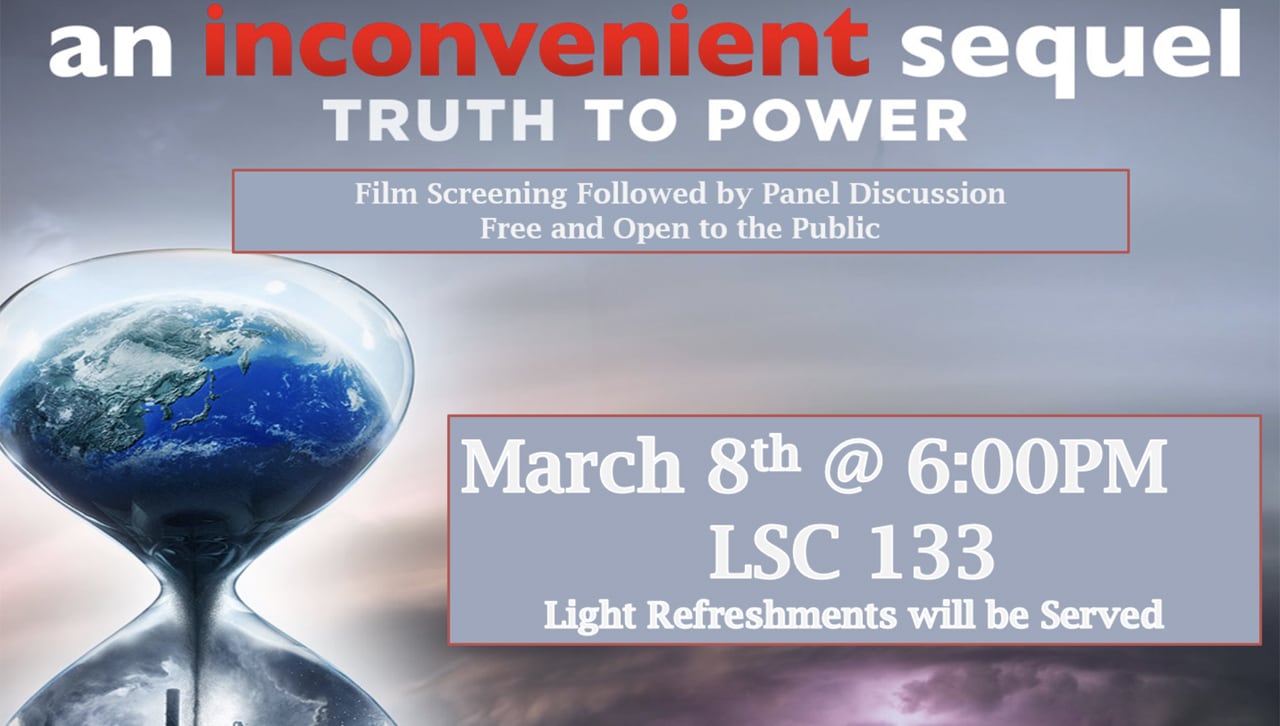
Film Screening followed by Panel Discussion
Free and Open to the Public
Thursday, March 8, 2018
6:00 p.m.
Loyola Science Center Room 133
Light Refreshment will be served
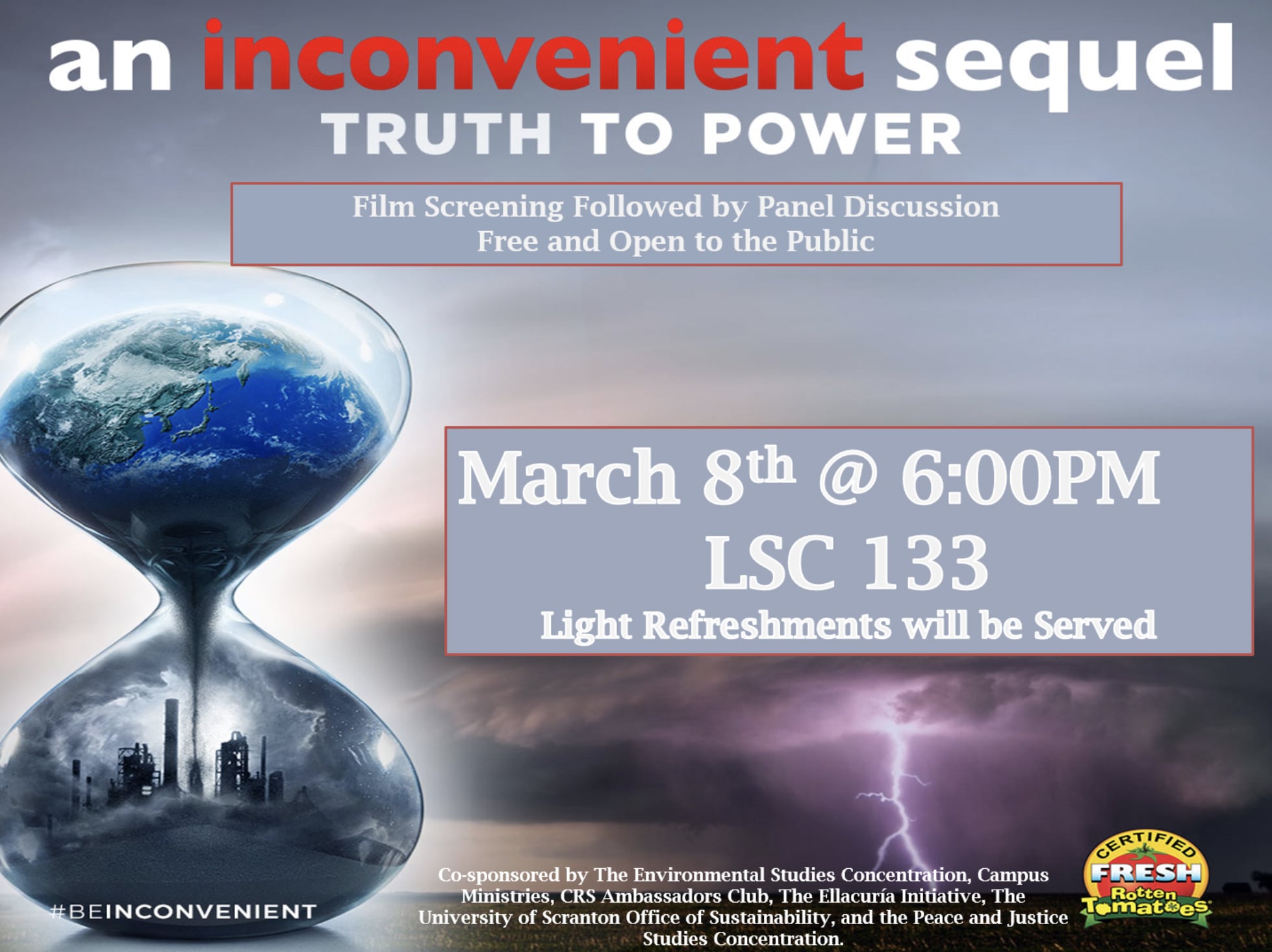
Film Screening followed by Panel Discussion

This article is from the Department of Latin American and Women's Studies Newsletter, which you can read here.
Linda Ledford-Miller began her career at the University of Scranton in the fall of 1985. At that time I had already been here for 6 years, but I had known her since 1978 or 1979 when we met as graduate students at Penn State. In the intervening
Linda immediately brought a burst of energy and spontaneity to a somewhat staid, all-male department, then known as Foreign Languages and Literatures. In an era in which language study was on the wane, Linda was, from the very beginning, a staunch and outspoken defender of foreign languages and cultural diversity. Early on she secured a $60,000 grant from the Culpepper Foundation to renovate our outdated language lab facilities, which she transformed into a center for technologically based language learning activities and directed for several years after returning from another Fulbright, this time to Guatemala.
For a number of years, Linda and I were the only Latin Americanists at the University of Scranton. During the 1990s, however, a number of new hires in a variety of disciplines, such as Janice Voltzow in Biology, came to the University with experience and interest in Latin America. Several veteran faculty members, such as Kevin Nordberg, Sharon Meagher, Stephen Casey and Bob Kocis, developed
The efforts of Linda and other advocates of Latin American Studies, together with the support of upper-level administrators in the late 1990s and throughout the decade beginning in 2000, resulted in the hiring of several outstanding dedicated Latin Americanists, such as Lee Penyak, Mike Allison and Yamile Silva, and made our dream of a strong program in Latin American Studies a reality. Among Linda's many contributions to the University of Scranton, this is the one that had the most direct positive influence on my career and for which I am most grateful. I am proud to have worked closely with her as a colleague and a friend for the past 30 plus years.
Read the full article in the LA/WS Newsletter here.
A Tribute to Linda Ledford Miller, professor of Latin American Studies.

Terra Preta Restaurant and Carl’s Prime (formerly Carl Von Luger) have freshly merged into Terra Preta Prime! With locally grown foods and the finest in USDA prime steaks, they offer the best of both restaurants. The new restaurant is located in the previous Carl's Prime space, 301 N. Washington Avenue, right on Courthouse Square. They are open for lunch and dinner, with brunch on Sundays. To even further cater to the downtown Scranton community, they offer free delivery during their weekly lunch hours. Check them out on Facebook and Instagram @terrapretascranton to hear about their daily special features and their website to view their full menu filled with delicious seasonal dishes made from farm-to-table ingredients!
Lunch Hours:
Mon.-Sat.: 11:30 a.m.-3 p.m.
Sun.: Brunch 10 a.m.-2 p.m.
Dinner Hours:
Mon.-Thurs.: 4 p.m.-9 p.m.
Fri. & Sat.: 4 p.m.-10 p.m.
Sun.: Closed
Terra Preta Prime
301 N. Washington Ave
Scranton, PA 18503
570-871-4190
info@loveterrapreta.com
Terra Preta Restaurant and Carl's Prime have merged into the new Terra Preta Prime.
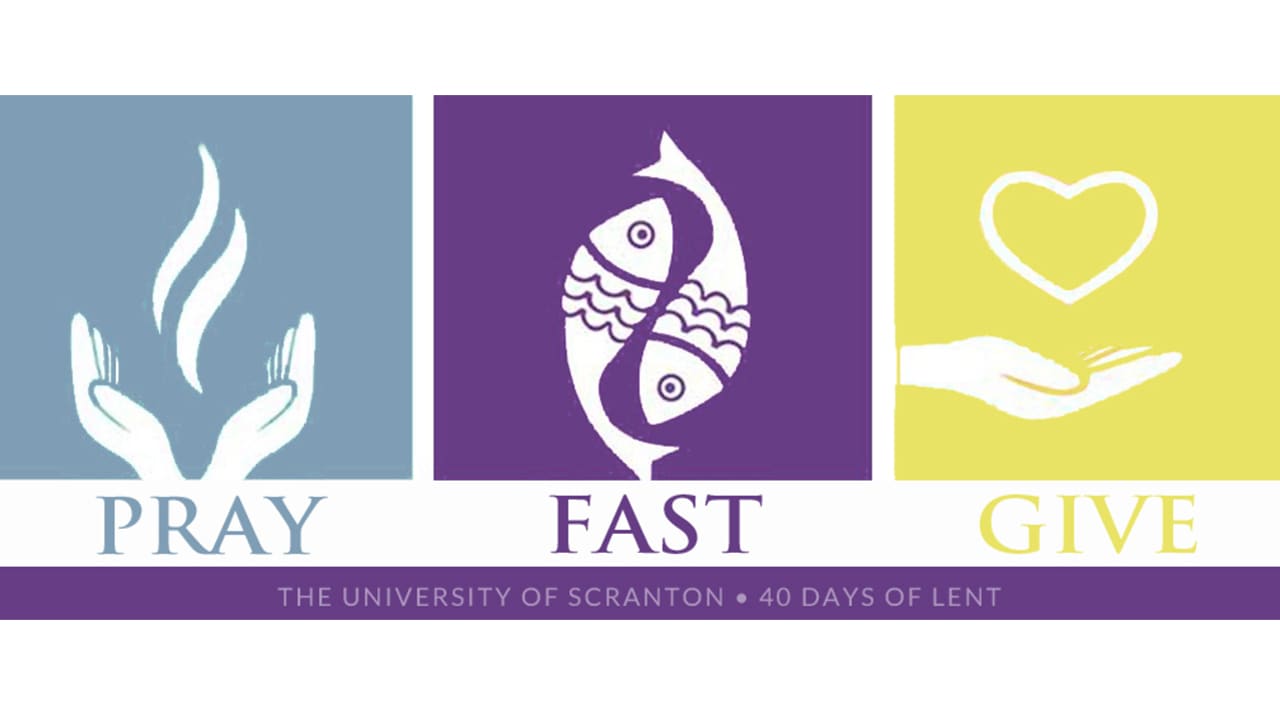
Feb. 14 Reflection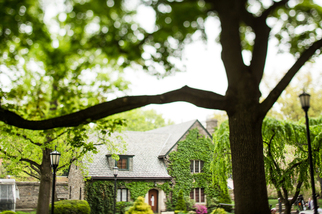
I’ll never forget an exchange I had in my catechism class with a Bronx teenager on Ash Wednesday 1995. It went something like this:
“Yo, Brother Pat (that’s what the students called me back then), why do we put these ashes on our foreheads? They make me look dirty!”
I agreed and responded accordingly: “Well, they’re supposed to make us look dirty because that is what our bodies will all become one day: dirt!”
My student’s question about this annual ritual was both fair and correct. The ashes do make us look a bit untidy and dirty. I offer as proof of that assessment the numerous times I’ve had complete strangers approach me on Ash Wednesday, tissues in hand, and sheepishly remark out of the side of their mouths that I have some dirt on my face and that I might want to wipe it off!
By marking our foreheads with an ashen cross we remember two important aspects of our Christian faith. First, the ashes themselves remind us that we are mortal and that we will die (remember man, remember woman, that you are dust and to dust you shall return). Ashes signify death, but when they are placed on our bodies for all to see, they tell the world that we who carry that “dirty little mark” on our foreheads realize that we are mortal and in need of a savior. Second, the ashes taking the form of a cross is significant because it reminds us that Jesus’ Passion, death, and resurrection covers our mortality and brings us to eternal life. The ashes are a mark of repentance, a sign of hope for the future, and a signal of our community’s renewed awakening to a deeper spiritual reality and a closer communion with God.
Rev. Patrick D. Rogers, S.J.
Executive Director of The Jesuit Center
Feb. 15 Reflection
Fasting during Lent, along with many traditions, has changed as I have grown from a small child to the college student I am today. As a child, fasting seemed like a horrible burden and something created to take the fun out of life. No Xbox? No candy? No soda? No chicken-wing pizza on Fridays? That is a recipe for a frustrated pre-teen. As I got older, however, fasting began to take on a new meaning.
With age, I realized that fasting gives us a sense of personal responsibility. Obviously, something as simple as giving up Starbursts or Instagram for Lent doesn’t come close to comparing to the suffering Jesus underwent, but the mere action of abstaining from something we enjoy gives us a glimpse of his suffering. As simple as it may seem, actively avoiding what I gave up each year makes me reflect on the deeper meaning and purpose of Lent.
I have come to understand that Lent is not meant to bother me by preventing me from enjoying some of my favorite things; rather, it is more a time of self-reflection. Lent gives me an opportunity to assess what I need to do to better myself as a Christian and as a person.
Jake Brown '21
Biology Major
Feb. 16 Reflection
Fasting God’s Way
How many times do we give up something tangible for Lent without considering whether the exercise of fasting, in and of itself, brings us closer to God?
Today’s reading, from the Book of Isaiah, reminds us that fasting while continuing divisive and sinful behaviors is of no real value. Rather, the changes that we must strive for are as much about what we are doing as they are about what we are not doing. The 40 days of Lent give us time to dwell on the idea that the love of God permeates each interaction with those who walk the Earth with us. We are called to channel God’s love by ministering to the oppressed, sharing what we have with the homeless and hungry, and forgiving others for the faults we see in them. It is also a time to learn how to give up the things that bind us into our own faults, and to pray that others can forgive those faults in us.
We are reminded that we are called to engage in deep reflection and to cultivate a contrite and humble heart. We are to give ourselves over to the love of the Almighty, to allow the Divine to work through us so that we can be the hands of God on Earth, reaching the oppressed, the broken, and lonely. We are called to give up our fear of moving into the darkest places to bring light. We are asked to trust that even in our own brokenness, we are worthy of God’s love and capable of sharing that love with others.
Indeed, Lent can be more for us than a time of avoiding certain things. It can be forty days of learning how to live into an entirely new way of being.
Patricia Wright, Ph.D.
Faculty, Department of Nursing
Feb. 17 Reflection

In today’s Gospel reading (LK 5:27-32), Jesus responds to the question of why he would eat and drink with tax collectors and sinners, saying, “Those who are healthy do not need a physician, but the sick do. I have not come to call the righteous to repentance, but the sinners.”
Do we see others with compassion, or are we quick to judge?
I vividly remember chaperoning a service trip and watching as one of our college students demonstrated the love and acceptance God asks of us. This trip, sponsored by the Center for Service and Social Justice, enabled our students to travel to the Father McKenna Center in Washington, D.C. This nonprofit social service agency serves the poor and homeless of the area in an effort to carry on the work of the late Rev. Horace McKenna, S.J., who was known as the "priest to the poor."
A special part of that day was when each of our students was paired with one of the men visiting the homeless shelter. The pairs were asked to talk to each other for about ten minutes, in order to get to know each other well enough to introduce one another to the larger group of about 100 homeless men and 12 students.
One of our students, Erica, proudly introduced us to her conversation partner, Tyrone. Even though Erica was a young student who grew up rather sheltered in the local Scranton community, she demonstrated such enthusiasm about this experience and embraced the opportunity to meet new people.
When it was her turn to introduce her new friend, she and her new buddy walked to the front of the room. Erica stood there proudly, next to a man whose imposing and hardened demeanor differed drastically from her own peaceful countenance.
Erica calmly shared with us that her new friend was recently released from prison after serving a long sentence. She told the group he was happy to be out of jail and hopeful that he could stay out of trouble. While touching his arm, Erica said, “I believe he can do this because he knows he made many mistakes, but he has learned from them." She continued, sharing some information about his troubled upbringing, but focused more on his desire to be a better person. And when she concluded, Erica asked us all to clap for him to show that we believed in him, too.
Erica made a new friend that day, and it was heartwarming to see one of our young students listen to and accept this man as someone who is like us all—a human forgiven by God for his wrongdoings and eager to live a meaningful life.
This Lenten season, let’s ask ourselves how we can see others with compassion, instead of being quick to judge them.
Betty Rozelle G'84
Assistant Director, Center for Career Development
Feb. 18 Reflection
What was the 40-day desert experience for Jesus and how is Lent a desert experience for us? The desert was a place of solitude, a place to spend quality time with God. Our world is a busy one, and we have the added distraction of ever-changing technology. How many of us could imagine not checking our phones for 40 minutes, let alone 40 days?
Lent can provide the same sort of quiet time for prayer that Jesus experienced in the desert. Jesus also fasted in the desert, which is the second Lenten practice. Fasting has always reminded me of Lent's special significance, especially on days like Ash Wednesday and Lenten Fridays. It is precisely in changing my normal routine that I am reminded to spend more time with God. Fasting or giving something up for Lent also reminds me of how much I have been given and how much I take these good things for granted. Fasting reminds me to be grateful for God’s gifts.
In addition to prayer, we are also called to preach the Gospel by living it. Helping those in need or giving alms, the third Lenten practice, is a concrete way of preaching through our actions. It shifts the focus off me because it’s not about me, and it puts the focus on loving God through helping my neighbors.
You may ask yourself why we observe Lent every year since we already know that Jesus died for us and rose from the dead. The short answer is that we humans need to be reminded of important things and we need to prepare once again for the worthy celebration of Easter.
Saint Ignatius Loyola advises in the Spiritual Exercises that as we celebrate Easter, we rejoice with the joyful Risen Jesus as we ask God to make us grateful and send us out to serve Jesus and transform the world.
Rev. Daniel Sweeney, S.J.
Faculty, Political Science
Feb. 19 Reflection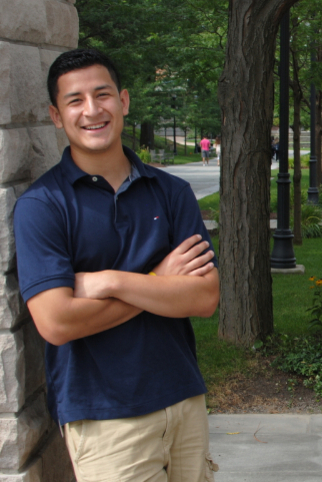
After several days of trekking Death Valley terrains and reflecting on contemplative themes, our group of 38 returned to our campsite from the Salt Flats exhausted, weary and distraught, to find an intense scene. 50 mph gusts of wind were destroying our tents, leaving us to question what would happen next. “What are we going to eat?” “Where would we sleep?” “I wonder if my things are still in that tent...” These thoughts pervaded our minds before we decided to leave our vans and enter the low visibility sand-filled atmosphere to salvage whatever was left. After a collective effort from everyone on the trip, we quickly packed our sand-filled belongings into the vans and were back on the road searching for a place of refuge from the storm that was enveloping us.
After our encounter with mother nature, our campus minister, Fred Mercadante, made a call to Holy Spirit Parish in Las Vegas, NV, asking for help. Unsure of what their response would be because it was late in the evening, we were already drafting a backup plan in case they were not able to accommodate our large group. Without hesitation, the parishioners opened their doors and lodged every single one of us. The next morning we were greeted with a bountiful breakfast and a display of kindness and service that was truly overwhelming and inspirational.
“For I was hungry and you gave me food,
I was thirsty and you gave me drink,
a stranger and you welcomed me…”
I was a witness to what it means to live the Gospel call to serve those most in need because I was one of them! The parishioners' willingness to help a group of dirty and tired Scranton retreatants still inspires me and informs my prayer life as I begin my Lenten journey. Experiences like these invite us to stop and reflect upon the moments when others have been neighbors, but it also allows us to be aware and open to the opportunities in which we can be neighbors for others.
Luis Melgar '18
Exercise Science
Feb. 20 Reflection
Indifference
In the First Principle and Foundation of his Spiritual Exercises, Ignatius instructs us that “we are to use the things of this world only to the extent that they help us to praise, reverence, and serve God, and we ought to rid ourselves of the things of this world to the extent that they get in the way of this end.” These things won’t be the same for all of us, and Lent offers us a time to take inventory of the roles certain objects, habits, or thoughts play in our relationship with God. In other words, Lent can be a time when we practice this Jesuit ideal of indifference most intentionally.
Read below Martha Serpas’ poem, “The Discipline of Non-Fulfillment for and after Margaret A. Farley,” which addresses the Easter season and the practice of the faith in similar ways as Ignatius did when discussing indifference.
The Discipline of Non-Fulfillment
for and after Margaret A. Farley
Eastertide, Margaret, and all
That we’ve given up comes back
To us at once, chicken and
Sausage gumbo, twelve-packs of Dixie,
Picayunes, and the man-god builder
Of trawl boards who
And coons from steel jaws.
At once the humid air rolls back
And northern light pours through.
Girls in pastel
To relieve pink azaleas
Of carrying the day
On their own. A crowded
Sea of greens, innocent water
Wedged by shorn banks below.
Eastertide, Margaret, and tide
Means something different here,
But wouldn’t you say it’s the same
Sweeping abundance overtaking
Shoals and inlets, joining lake and bay,
Drowning everything in between?
Don’t answer. I’ll focus on some small
Thing, a blue heron lifting from brown stubble,
Light off bleached barnacles, helicopter blades
Beating the marsh into submission.
No action hero will rappel down
In camouflage or lab white
To sew together the last scraps
Of duckweed and spoil, like the
Discipline of non-fulfillment,
You offered from the pulpit
Years ago, as if you were explaining
The abbreviated life of dogs
To children, laying a still,
Furry body down in its damp
Space and closing up the hole.
by Martha Serpas
from The Dirty Side of the Storm (W. W. Norton)
Teresa Grettano, Ph.D.
Assistant Professor, Dept. of English & Theatre
Director of First-Year Writing
Feb. 21 Reflection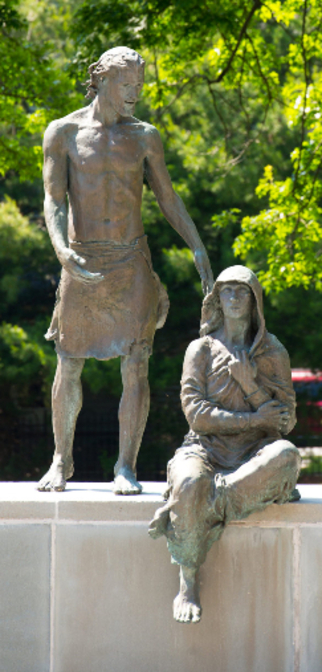
Have you ever experienced something so powerful, you don’t have the words to explain it to others?
My dad once shared with me wise words he had heard from a Jesuit: “Once you get to a point where your words fail, that’s when you’ve reached the heart of the matter.”
I traveled to Managua, Nicaragua last summer as part of an International Service Program (ISP) trip through Scranton’s Office of Campus Ministries. It was a powerful experience for me, and every time I contemplate what the Nicaraguan people gave me, my words fail me. I try to reflect on the generosity of the Nicaraguans, and if I let it, the gift of their kindness continues to impress and touch my heart. The house we built didn’t end up being the biggest gift given. The relationships we built with the family, the students, the workers, our bus driver, guard and translator were an even bigger gift. The patiently-translated conversations gave us a deeper connection. The hugs and laughs made it harder to leave. The children reminded us of simple happiness. The natural beauty inspired us to treat the environment better. The passion of the Nicaraguan people encouraged us to be proud of our heritage, as well. By our American standards Nicaraguans don’t have much to give in material goods. Our heads tell us they don’t have abundant possessions or wealth. That changes at the level of the heart.
Let your heart be open to the possibility of gifts you have to feel to understand. Let your heart decide riches, and make sense of how you can feel so showered in blessings from people who your head tells you have little or nothing to give.
The three themes of the Lenten season are Pray, Fast & Give. Don’t reduce Lent to simply fasting from your favorite foods, refraining from meat on Fridays, and praying throughout these 40 days (though these are good things, too). Don't forget about the third theme: Give. Try to model your Lenten attitude off of the Nicaraguan people. Give, and receive, with your heart.
Virginia Farrell '20
Art History Major
Feb. 22 Reflection
The Lord says to Simon Peter:
I have prayed for you that your faith may not fail,
And, once you have turned back, strengthen your brothers.
[Entrance Antiphon]
My brother and his family live near a sheep farm and every time I drive by there I slow down so I can observe the flock. They always seem content with life – a great place to live, nourishment all over the pasture, three ponds nearby for water, and lots of companions. “They’re ok,” I say to myself, and pick up speed continuing on my way.
The sheep motif runs throughout today’s scripture: Tend the flock of God in your midst [1 Peter], The Lord is my shepherd; there is nothing I shall want [Psalm 23], leading up to the Gospel of Matthew wherein Jesus calls Peter a rock, upon whom Christ will build his Church. Peter, the first Shepherd of the Church, confesses his faith in Jesus by saying: “You are the Christ, the Son of the living God.”
Every day in my work with our students I am reminded of the faith we all share. I see how they care for one another at choir rehearsal, or how they encourage each other in preparing to serve at liturgy. When I ask why they do what they do as music and liturgical ministers, more often than not it is because they identify with each other as members of a community of faith called by God to this place, at this time, in this moment, to serve, as Christ serves – to love, as Christ loves. What better example for our Lenten journey but to see how our students tend the flock of God in their midst, shepherd each other in Christ’s name, and call forth the building of the Church in their service to this university community of faith.
I’m thinking about those sheep . . .
M. Jayne Lucas
Director of Liturgy and Liturgical Music
Office of Campus Ministries
Feb. 23 Reflection
My Aunt Mo & Uncle Jerry are celebrating their 50th wedding anniversary this year – God bless them! They spend most of their time in Fort Myers, Florida, with other retired people spanning states from New York to Michigan. Today it's 88 and sunny down there – life is good!
Their lives are pretty simple at this point. Mo (the fun aunt) spends her days playing tennis, chatting with “the girls” at the pool, and cracking open a few cold ones as the sun dips into the Gulf each evening. Jerry (for those older than me, picture "The Fonz" from Happy Days) has his Sudoku, Hot Wheels collection, Publix chicken wings, and a 2015 Mustang GT.
Uncle Jerry hasn’t touched a drop of booze in decades, and a few years ago he suggested that Mo give up beer for Lent. I showed up for a visit that year, and although Lent can be a great opportunity to shake up our lives a bit, change our routines, and break some habits, Mo was just not her usual, fun-loving self. We went to 5 p.m. Mass on Saturday at St. Columbkille (beats Patrick and Brigid for cool Irish saint names…) and the priest encouraged us to rethink simply giving something up for Lent. “Embrace life, enjoy those around you, & do what makes you happy.” Though I seem to recall Mo jumping out of the pew and cheering, I’m sure her response was a bit more subtle, at least until we got to the parking lot.
I have always challenged my students, here and at Chaminade and Kellenberg high schools on Long Island, to think beyond giving up something relatively unimportant for Lent. Wanna give something up? How about hatred, gossip, betrayal, pettiness, cheating, excess, lying, grudges, negativity…and don’t just pick one, go big or go home – actually attempt to make a meaningful improvement in your life.
Wanna do something? Be yourself. Really, give it a shot – take off the masks, put aside the show, and become the truest self who you were created to be.
John Kirrane
Assistant Director, Residence Life
Feb. 24 Reflection
The word "
I offer this poem today as a way in which to pause and reflect - to process the magnitude of our blessed, complicated, and beautiful lives. I hope you enjoy.
"Thirst" by Mary Oliver
Another morning and I wake with thirst
for the goodness I do not have. I walk
out to the pond and all the way God has
given us such beautiful lessons. Oh Lord,
I was never a quick scholar but sulked
and hunched over my books past the hour
and the bell; grant me, in your mercy,
a little more time. Love for the earth
and love for you are having such a long
conversation in my heart. Who knows what
will finally happen or where I will be sent,
yet already I have given a great many things
away, expecting to be told to pack nothing,
except the prayers which, with this thirst,
I am slowly learning.
Selah
Ryan Sheehan, J.D.
Assistant Director, The Jesuit Center
Feb. 25 Reflection
All three readings today talk about the sacrifice of a son to prove one’s love. The philosopher Kierkegaard spent his whole life reflecting on the meaning of Abraham sacrificing his son Isaac to God. Now I am no theologian who can illuminate the mystery of redemption found in these readings, but all I can tell you for sure is what the readings are not saying.
If a father gives his son the keys to a red Ferrari on graduation day and then asks him to return the keys to prove that he loves his Dad more than he loves the gifts his dad gives him, that father does not deserve to be called “Dad” in any sense of the term. No father, including God, treats their children in that manner. Whatever the stories of Abraham and the Transfiguration mean, they most certainly are not about sacrifice, but undying love.
A friend from the DA’s office called me one Saturday morning about a student of mine who had been jailed for some minor offence. All he needed was his parents to post a small bail to get him out, but this student was too ashamed to call his folks. So I did, and I explained the situation to them. Of course they immediately came to rescue him and express their unconditional love for him, because that’s what parents do in imitation of God Himself. Even I, a priest with no children of my own, understand this simple fact about parental love.
Today we need to ask ourselves whether we do indeed believe that God is not someone who is out to TEST us to prove ourselves, but someone who is begging us to let Him love us unconditionally. All we have to do is say “thank you” in return for this free gift.
Ron McKinney, S.J.
Philosophy Department
Feb. 26 Reflection
Let nothing disturb thee,
Nothing affright thee;
All things are passing;
God never changeth;
Patient endurance
Attaineth to all things;
Who God
In nothing is wanting;
Along God Sufficeth.
St. Teresa de Ávila (1515-1582)
Virgin, Mystic, Ecstatic, Reformer, Doctor of the Church
From The Jesuit Center Staff
Feb. 27 Reflection
Ever since I was a young girl, I loved listening to the story of Jesus washing the feet of his apostles. The way he owned his truth and served others has been a guiding lesson for me throughout my life. This story came to mind as I was reflecting on the gospel for today. In Matthew Chapter 23:1-12, Jesus said:
"Call no one on earth your father; you have but one Father in heaven. Do not be called ‘Master’; you have but one master, the Christ. The greatest among you must be your servant. Whoever exalts himself will be humbled; but whoever humbles himself will be exalted."
What does this mean for us in our daily lives? Do we live in service to others and see ourselves as equals? Do we live in truth, knowing that we are all created equal in the image and likeness of God?
In 2010, I was going through a very tough time in my life. I needed to practice humility and serve others in order to reconnect with the truth of who I really am. I needed to be reminded of what is important in life. In that same year, a devastating earthquake rocked the country of Haiti and destroyed the lives of so many people. As God called me to serve, I immediately answered by going to Haiti to help in whatever way I could.
As I spent time with the people of Haiti, I saw suffering in ways I have never known before. I was humbled by their faith and honesty. As I was serving them, they were doing the same for me. Haitian people do not pretend to have more or be more than anyone else. They are secure in the knowledge that they are children of God, and that He will provide for them. They experience life as a precious gift from God, and they thank Him in so many ways…in a smile, a touch, in writing, and in song. Even in the midst of a crisis, knowing this truth allowed the people of Haiti to serve the needs of those who were there to help them.
When I looked into the eyes of the Haitian people, I was able to see the goodness within their souls. I saw their non-pretentious, faith-filled selves. I must admit that it is not as easy to see this truth when looking into the eyes of many Americans. So many people seem to live beyond their truth and forget their real purpose in life. When people reach out to others in need, they can hear the voice of God calling them to be humble and truthful. These experiences can touch their lives and change them forever. By living in their truth, they will be humbled. This is how the world can change for the better. This is what God wants for us all.
Feb. 28 Reflection
When my children were small, I had a famous line: “When I’m talking, you’re not talking." In my collection of “mom-isms,” I used this one quite a bit. I recall speaking the words over their chatter…typically when trying to give directions or explain something important. “Honey, you can’t hear what I am saying if you are talking at the same time. When I’m talking, you’re NOT talking.”
During their teenage years, important conversations typically started with, “Let’s turn the TV off." Silencing that distraction helped us really listen to each other and more easily hear what the other was saying.
One of my regular Lenten practices is turning the radio off in the car. At first, I started this as a way to “give something up." Living 50 minutes from campus, I have to admit that in the beginning it was torture. The silence can be deafening. I started using the time to talk to God. Out loud. (Yes…more than once, passersby thought I was nuts). I talked. And talked. And asked God for things. And asked God what I should do about difficult situations. And told God about things I was grateful for. And told God what I worried about.
One day, it hit me. God planted this message in my heart: “Honey, you can’t hear what I am saying if you are talking at the same time. When I’m talking, you’re NOT talking.”
A few weeks ago, my oldest son came home to have dinner with me while my husband was away. We prepared a lovely meal together. I will never forget the joy I felt when he stood up from the table, picked up the remote, and turned off the TV.
Let me end my reflection with this poignant saying from Mother Teresa of Calcutta:
"I shall keep the silence of my heart with greater care, so that in the silence of my heart I hear His words of comfort, and from the fullness of my heart I comfort Jesus in the distressing disguise of the poor. For in the silence and purity of the heart God speaks."
- Mother Teresa of Calcutta
Lynn King Andres '89, P'17
Associate Director, Alumni & Parent Engagement
March 1 Reflection
The season of Lent is our preparation for the most important feast of the Christian calendar, the Feast of the Resurrection of Christ. It is our Garden of Gethsemane; it is our Calvary; it is where we can forgo some of the pleasures of life to prepare ourselves completely to celebrate the joy of the feast. We prepare in many varied ways, but certainly the three main ways are by fasting, by almsgiving and by prayer.
The golden-mouthed orator Saint John Chrysostom, Archbishop of Constantinople, gave a sermon for this feast nearly 1700 years ago. It is read in most Eastern Christian churches at the end of the Vigil Liturgy each year. One small part reads as follows:
If any have toiled from the first hour,
let them receive their due reward;
If any have come after the third hour,
let him with gratitude join in the Feast!
And he that arrived after the sixth hour,
let him not doubt; for he too shall sustain no loss.
And if any delayed until the ninth hour,
let him not hesitate; but let him come too.
And he who arrived only at the eleventh hour,
let him not be afraid by reason of his delay.
For the Lord is gracious and receives the last even as the first.
He gives rest to him that comes at the eleventh hour,
as well as to him that toiled from the first.
We are already several weeks into our season of Lent. We may think that we have failed to fast, that we have avoided almsgiving and that we have not been living a life of prayer. There is no reason to despair, as Chrysostom tells us. Rather, we take the opportunity to begin now. We can now begin to fast, to feed the hungry, to clothe the poor, to educate the uneducated, and to get closer to God through prayer and in the liturgy of the Catholic Church. We can still reach our joy in the Resurrection by beginning now at the middle of the fast. We, as Christians, should not judge those who have joined late, nor should we feel superior for having begun at an earlier time; rather, we should welcome them on this path and give them all the support we can..
Lent is more than simply a season of preparation for a single feast. It is analogous to our life here on Earth. In our lives, we have sufferings and joys, times of feast and times of famine, times when we remain close to God and times when we fall away. But just as Chrysostom says for the Feast of the Resurrection, so it is true for our lives. If we have fallen, if we have failed to love our neighbor, to share our blessings, to avoid sin, to live a life of prayer, then God still shall give rest to those who have toiled only from the eleventh hour. Lent reminds us, no matter what hour of our lives that we happen to be in, that we still have time to live the life that we want to live, to live a life that brings us closer to God. We still have time to fast, to give alms, to pray, to forgive, to seek out God. As Lent prepares us for the joy of the Resurrection, so our life prepares us for the ultimate joy when we see God face to face.
Steven Dougherty, Ph.D.
Professor of Mathematics
March 2 Reflection
During Lent, I’ll occasionally be interviewing some of the young women and men who participate in the liturgical life of our community. Today’s offering comes from Harry Helbock, a senior communication major in the College of Arts and Sciences and a long-time lector on our campus.
Fr. Patrick: So, Harry, how and when did you get involved with the ministry of lecturing? Was that something you started here at Scranton?
Harry: No, I grew up in a house where participation at Mass as liturgical ministers was normal. My dad is a lector and my mom is a Eucharistic minister so that was just a part of how my family gave back to the Church. I began my participation in liturgy as an altar server when I was a boy, and when I was a junior in high school I began to lector at my parish’s weekly youth Mass.
Fr. Patrick: What kind of lector training did you receive once you got to the U?
Harry: Well, I contacted our Director of Liturgy, Jayne Lucas, and she met with me to go over the responsibilities of a lector and also listened to me read passages of scripture, and then gave me feedback about pacing and volume and such.
Fr. Patrick: How do you prepare for the liturgy when you are assigned to read the scriptures? As you know, some of those Old Testament names are pretty difficult to pronounce!
Harry: Yeah, I know they are, so that’s why you have to get there early and carefully look over the readings to make sure that any names you don’t understand can be worked out. I also like to read the scriptures out loud to myself to practice. It is really important that the readings are proclaimed well and that’s why you’ve got to practice.
Fr. Patrick: How has being a lector changed you spiritually?
Harry: Now that I’m in college I’ve really learned how to take it all in and really internalize what is being said in that scripture passage. When I was younger, I was focused more on not making any big mistakes and proclaiming the Word well. I still want to do a good job, but now that I have more experience, I understand scripture better and can see connections that I didn’t see when I was younger.
Fr. Patrick: On the lighter side, what’s the funniest thing that has happened to you as a lector?
Harry: Well, one time, as I was getting up to read, I tripped over myself and almost took a really bad fall right there in the main aisle! I caught myself though and just kept on going!
Fr. Patrick: What do you like about being a lector?
Harry: I love being able to do something for the Church. I’ve grown a lot spiritually here at the U through personal prayer and retreats, but lecturing for me is about giving back to the community and giving witness to my peers by participating.
Rev. Patrick D. Rogers, S.J.
Executive Director, The Jesuit Center
March 3 Reflection
Lent is often seen as a spring cleaning for the soul – an opportunity to renew our relationship with God and the Church. We recognize our sinfulness, our mortality, and seek the mercy of our Creator.
If the past 24 hours have taught me anything, it is that spring will not arrive simply because we think we are ready for it! I was already looking outwards, towards the warmer weather, and preparing for the next season: cleaning branches off the lawn, sweeping the driveway, putting the shovels in the shed – not to mention the not-so-gentle daily ooshings of the kids to stop jumping up and down on the sofas and to get out of the house!
But here we are again, confined to our homes, with swirling winds and snow stirring up outside. The winds will calm soon enough and the snow will melt, but not before a little more work is completed. The Spirit sent us a not-so-subtle reminder that we have to get our own homes in order before we venture out – before we look to the next season. We cannot rush the end simply because we think it will be easier, warmer, and less harsh. It is not how our spiritual lives work.
Reading the story of the Prodigal Son in today’s Gospel, the three main characters remind us of several (avoiding lengthy exegesis) simple truths during Lent.
We must take the time to repent as did the older son. We must look to God and ask for forgiveness. And we must avoid the bitterness and self-exclusion of the older brother and offer forgiveness where it is needed, including forgiving ourselves.
Soon enough we will rejoice with the risen Jesus. But for now there is still snow in the yard and work to be done in the house.
Easter is not here…not yet.
Ryan Sheehan, J.D.
Assistant Director, The Jesuit Center
March 4 Reflection
The Good News for Lent is what Paul preaches, the crucifixion of Jesus. It is the way that His Sacred Heart deals with man’s failure to love Him as He loves us. And His way is our way to deal with the failure to love, whether the failure is our own or that of others. For He is The Way. He allows His feet to be nailed so that He does not run away from those who hurt Him in hurting themselves by their lack of love.
He allows His hands to be nailed so that the unloving need not fear that He will hurt them in return. Rather, His arms are held open, waiting to embrace the ones He loves. Nor do His hands cover His Sacred Heart to protect His life. So His Sacred Heart is pierced and His life is poured out to overwhelm with love those who are lacking in love. To overcome the death of love, water is poured out to Baptize, to exchange birth into the love life of God for what is missing in the ones He loves. And for the nourishment of the new love life is poured out His Life, His Precious Blood, the medium of the message “Let anyone who thirsts come to me and drink.” (John, 7:37) His Sacred Heart gives the life that is present in His Body, His flesh that we eat in the Holy Eucharist, Holy Thanksgiving returning His Love. But His feet are nailed so that He cannot come to us to give us His Body, the Daily Bread that we pray for in the Our Father.
Do we hunger enough for His love to come to Him to receive daily the complete union with Him in His Love of Our Father? Do we fully accept the gift of His Sacred Heart which is the result of His crucifixion? Can we resist not only being loved into existence at every moment but being drawn into the Sacred Heart’s sharing with those He loves, the Holy Spirit, His love of Our Father?
Rev. J. Patrick Mohr, S.J.
Professor, Department of Philosophy
March 5 Reflection
On March 3rd 1868, Blessed Pope Pius IX signed the decree that marked the beginning of the Diocese of Scranton.
Yesterday afternoon, the Diocese marked its 150th Anniversary with a special Mass at the Cathedral of St. Peter. Today, let us offer up a special prayer for the Diocese of Scranton and ask for God’s continued blessings on all of its parishes, missions and works.
From the Jesuit Center Staff
March 6 Reflection
Dear Friends,
As we celebrate the sesquicentennial anniversary of the Diocese of Scranton, let us take a moment to offer a prayer of thanksgiving for all the blessings we’ve received from the Diocese, especially our profound connection with its bishops.
Our current bishop has personal ties of affection to the University and at one time took graduate theology classes here. He also served on our Board of Trustees. So today, let us offer up a prayer for our chief shepherd and spiritual leader, the Most Reverend Joseph C. Bambera, D.D., J.C.L., Tenth Bishop of Scranton.
Rev. Patrick D. Rogers, S.J.
March 7 Reflection
Today’s reflection comes as a result of an interview I did with senior lacrosse player Timmy Gray '18.
Throughout our conversation, I asked Timmy to reflect on questions pertaining to the blessings and challenges of being formed in the Ignatian charism that is a hallmark of a University of Scranton education. For student-athletes at the University, this formation program is called “The Royal Way.” It helps them strive for excellence on and off their place of competition while forming them to be women and men of good conscience and character.
Timmy Gray '18 is an Exercise Science major and a goalie on our men’s lacrosse team.
Fr. Patrick: So, Timmy, what is “The Royal Way?”
Timmy: It’s a program for all athletes here at the University, and it's a program that helps student-athletes come together as a team through the building-up of character. “The Royal Way” is not only about competing hard and giving it your best shot every day, but about how we do things on our teams. One of the touchstones of “The Royal Way” states, “We demand mutual respect, tough love and total care from one another.” Those values are hard to live up to sometimes, but they remind us that doing the right thing, while it is often very tough, is worth it in the end.
Fr. Patrick: Does every student-athlete have to participate?
Timmy: Yeah, as far as I know every athlete signs the large “Royal Way” Touchstone poster at the beginning of the year and in doing so pledges to do their best to live up to these high ideals. That signed document hangs in the Long Center gym, which is great because everyone in our community can see it. When I look at it I am reminded that we are called to seek the magis (the more) in all that we do because we represent more than ourselves or our team, we represent our community.
Fr. Patrick: Is there one aspect of “The Royal Way” that you find particularly appealing?
Timmy: Yes, and it’s the last part. At the bottom of the document, it says, “Wherever we go, whatever we do- WE ARE ROYALS.” I feel blessed to represent the University and am honored to wear a Scranton uniform because we really are one community.
Fr. Patrick: How do you and your team engage “The Royal Way?”
Timmy: Well, we often talk about Jesuit values in our team meetings and, like all the other teams here at the University, we do community service. We regularly participate in the Thanksgiving Food Drive run by the Friends of the Poor, and the guys love it. “The Royal Way” is much more than community service, though, because we want to honor God in all that we do. Think about it - we are able to put AMDG (Ad Majorem Dei Gloriam, For the Greater Glory of God) on our basketball court and on our jerseys! We can literally wear our values on our sleeves, and that means a lot to me.
Fr. Patrick: What value represented in “The Royal Way” most resonates with you?
Timmy: That’s easy: “We compete with an attitude of gratitude and greatness, striving to win each day our way." As a senior, I’m grateful for all that I have because I know that I didn’t get to where I am on my own. My parents, coaches, friends, and teammates have all helped shape me as a person. Competing with my teammates is great because they are awesome guys, and I feel blessed to be on the team.
Fr. Patrick: Thanks for sharing your thoughts, Timmy. Good luck with the season!
Timmy: Thanks, Fr. Patrick!
March 8 Reflection
Simple Prayer for the Midway Point of Lent
May we give up noise -pray- so as to enter into deeper prayer for ourselves and the life of the world.
May we give up food and consuming -fast- so that others may eat and have something at all.
May we give up judgment, sarcasm, the unkind word or remark
-give instead- a word to lift us up and get us through it all.
From the Jesuit Center Staff
March 9 Reflection
Today marks the 450th anniversary of the birth of Saint Aloysius Gonzaga, S.J. Because he died giving care to plague victims at the age of 23, Aloysius is the patron saint of students and youth, Jesuit Scholastics, plague victims and AIDS victims and caregivers.
To mark this milestone, the Society of Jesus begins today a Jubilee Year to honor this great saint and patron of youth. Fr. General Sosa, S.J., has invited the whole Society, including its communities and institutions, to find ways to celebrate St. Aloysius’ life by drawing attention to the rich contributions young people bring to society, the Church and the Society of Jesus. Read Fr. Sosa's Invitation Here
To begin our jubilee year, I asked Brian Kilner '20 (a graduate of Gonzaga High School in Washington, D.C.) to offer his thoughts about St. Aloysius Gonzaga.
Enjoy,
Fr. Patrick
March 10 Reflection
Rev. Patrick D. Rogers, S.J., sits down with Elizabeth Dugan '18, Occupational Therapy major and Psychology minor, to discuss her experience as a cantor.
Fr. Patrick: Hi, Elizabeth, it’s good to have you here at the Jesuit Center. So, let’s get down to brass tacks … when did you first begin to cantor at Masses? Were you in high school or here at the Univeristy?
Elizabeth: Actually, I first began to cantor at my home parish when I was in the sixth grade.
Fr. Patrick: Wow, that’s really awesome and a lot of responsibility for a young person, so good for you! Since you’ve been participating as a cantor for some time now, do you have a special way of preparing yourself to lead us in song on Sunday?
Elizabeth: I prepare for a Sunday liturgy by attending the music ministry’s weekly rehearsals. If there are hymns or psalms that I am not familiar with I will take pictures of the music and record the song while we are practicing so I can go back and listen to it. I also find myself randomly singing songs that are in the Masses during the week, as corny as that may be, especially if it is a hymn that really strikes a chord with me or one that I really enjoy.
Fr. Patrick: Has singing at Mass helped you grow in your spiritual life? If so, how?
Elizabeth: Singing at Mass has definitely impacted and supported my spiritual life. I have realized that singing the hymns is having a conversation with God, just like praying. For me, the combination of music and scripture helps to foster my spiritual growth. I have been able to see in different theology classes how many scripture passages have inspired artists in their music and how the scripture is incorporated and used in the music played at Masses.
Fr. Patrick: I don’t know if you’ve heard this, but the great St. Augustine is given credit for saying, "Those who sing pray twice." How do you encourage your fellow students to PRAY MORE, i.e., sing at Mass?
Elizabeth: One thing I always try to do is smile whenever possible. Also, last semester I read "Why Catholics Can’t Sing" by Thomas Day for my Intro to Christian Worship course. In that book, Mr. Day explains that cantors should back off of the microphone when they hear that the congregation has a strong communal sound. I have started trying to implement this technique and have noticed a difference in the congregation’s participation in singing during Masses.
Fr. Patrick: All of us have had funny things happen to us during Mass. Can you share with us one of your funny moments?
Elizabeth: One funny moment happened last year. I remember looking at the microphone before Mass and thinking it looked kind of loose. Later, toward the middle of the Mass, the microphone fell out of the stand and onto the floor with a big thud! I continued with the Mass parts without the microphone and just pretended like it was there until I could pick it up before the communion hymn. It was a very interesting Mass that Sunday!
Fr. Patrick: Thanks for taking the time to tell our University Community about you singing ministry, Elizabeth. Enjoy your spring break and I’ll see you in a week or two!
Elizabeth: Thanks, Father. I hope you have a great break as well!
March 11 Reflection
A SPIRITUAL EXERCISE FOR LENT
It strikes me that today’s Second Reading, from the Letter to the Ephesians (2.4-10), fits fruitfully together with the Contemplation on the Incarnation (#101-109) in the Spiritual Exercises. St. Ignatius bids us imagine Father, Son, and Holy Spirit taking a long look at the world, seeing humanity’s self-destructive course, and deciding, “Let us work the redemption of the human race.” "Work" is the word that then connects creation, redemption, resurrection and salvation as God’s Plan, his "Handiwork" proclaimed in Ephesians as follows for our meditation:
“It’s a wonder God didn’t lose his temper and do away with the whole lot of us. Instead, immense in mercy and with an incredible love, he embraced us. He took our sin-dead lives and made us alive in Christ. He did this all on his own, with no help from us! Then he picked us up and set us down in highest heaven in company with Jesus, our Messiah.
Now God has us where he wants us, with all the time in this world and the next to shower grace and kindness upon us in Christ Jesus. Saving is all his idea, and all his work. All we do is trust him enough to let him do it. It’s God’s gift from start to finish! We don’t play the major role. If we did, we’d probably go around bragging that we’d done the whole thing! No, we neither make nor save ourselves. God does both the making and the saving. He creates each of us by Christ Jesus to join him in the work he does, the good work he has gotten ready for us to do, work we had better be doing.”
(Excerpt from The Message New Testament)
Fr. James Redington, S.J.
Jesuit Center Fellow
March 12 Reflection
The conversation between Jesus and the father in today’s Gospel is fascinating and rather strange. The father begs Jesus to help his dying son. Jesus’ response seems impatient, somewhat irritable. “You people...” he says, “you people won’t believe unless you see signs and miracles.” Doesn’t this seem a bit harsh? The father hasn’t seen signs and miracles, and he’s not there to ask for some proof that will make him believe. He just wants his son not to die. He has left him, knowing he might never see him alive again, and traveled for at least a day because he thinks that Jesus can save him. Surely he wouldn’t have done that unless he did believe? But he hasn’t got time to argue with Jesus – “what do you mean? I’m here, aren’t I?” He just wants help for his kid. So he ignores Jesus’ rebuff and repeats: “If we don’t hurry, he’ll die – please, let’s go!”
Jesus says, “Go home; your boy is going to be fine,” and the father doesn’t argue, he doesn’t insist that Jesus needs to be there; he believes him, John says, and he does as he’s told and heads home. Again, doesn’t this look like belief? Wasn’t Jesus being too hard on him with his “you people . . .?” But then the father meets his servants, hurrying to him with the good news. He learns that the fever turned just when he was with Jesus . . . It seems that the timing qualifies his son’s healing as a “sign and a wonder” because then, John tells us, then he believes.
Belief, it would seem, isn’t a simple proposition: either you believe or you don’t, case closed. Like the father’s, our faith is a complicated thing, a layering of need, of hope, of trust, of experience, of conviction. Jesus knows what a mess our faith is, how unsimple, how tangled. Sometimes we believe because we want to, or need to, or because it gives us something to hang-on to. Sometimes we believe because we are compelled to, or because something meets our standards for an adequate reason to believe. Like the father’s, if we are willing to risk the journey towards Jesus, our faith can begin as grasping at straws and grow into something that can draw in those around us.
Lent, when we try to get clear of some of the jumble of our lives, can be a time to look at our faith in the company of Jesus, who knows all about its tangled messiness, and who always wants to show us the truth about ourselves, and to heal us.
Dr. Maria Poggi Johnson
Faculty, Theology and Religious Studies
March 13 Reflection
Just as water brings life to all areas of the world, so too does God’s love bring new life to the people of the world.
In the first reading today we see Ezekiel being led by an angel around the temple, from which water is trickling. As the angel measures around the temple, Ezekiel finds himself in deeper and deeper water, until a river has formed. The angel tells Ezekiel, “wherever the river flows, every sort of living creature that can multiply shall live.”
In the Gospel reading Jesus visits a pool where many sick people are gathered. Jesus finds one man, who has been sick for 38 years, and tells him to “Rise, take your mat, and walk.” However, because it was the Sabbath the man was not allowed to carry his mat, and so he was questioned as to who told him to do so. When the man eventually tells people that it was Jesus who had healed him and told him to carry the mat, the people began to persecute Jesus.
Lent is often seen as a dry spell. Fasting, giving things up, and the somber mood at Mass as we lead up to the Passion and death of Jesus. But, come Easter, the floodgates are open and the Risen Christ brings salvation to the world! God’s love can heal us, make us grow, and help us thrive and multiply. We see throughout the Gospel readings during Lent that Jesus shows his love for the poor and sick by performing miracles and teaching, even though with it comes the scorn of the authorities and people that would eventually put him to death. That’s how greatly God’s love flows out to all of us. Let us use this time to wade a little deeper into the water and immerse ourselves in it.
Joseph Sorbera, III '08
Member, Alumni Society Advisory Board
March 14 Reflection
As the Gospel says, "Amen, amen, I say to you, the Son cannot do anything on his own." Why is it that people today either do not believe in God, or think they do not need Him in their lives? There is a great deal of chaos in our daily lives and life tends to get busier all the time. It seems as though people do not make the time for God. Our God is a loving God who knows our every move before we do, and yet people still do not believe. Even Jesus Himself says in the Gospel quote mentioned above that He "cannot do anything on his own," yet somehow we, as humans, think that we can.
Some people tend to turn to God when they are going through a difficult time, whether it be the loss of employment or the loss of a loved one. Yet, when time passes and they think everything is OK again, they no longer need God in their lives. Seemingly, they only seek God when it is convenient for them or during troubled times. Apparently, they do not think about the "day of resurrection" when we are accountable for ourselves.
In my opinion, I think that everyone should make the most of every day, be kind to others, help others whenever/wherever they can, be the best people our good Lord made them to be, and utilize the talents our good Lord has blessed them with.
There’s one other saying that I would like to reference – “Let go and let God” – but do NOT let go of God!
March 15 Reflection
A few years ago, I arrived home after a long, busy day at the University and found a small package that had come with that day’s mail. The return address told me that my best and dearest college friend had sent me a surprise, but hadn’t mentioned that something would be arriving. What I unwrapped that night was a small plaque, which reads: “Good friends are like stars – you don’t always see them but you know they’re always there.” In the quietness of this Spring Break week, as I thought about the readings for this day, I walked to my kitchen and saw that little plaque yet again, not even knowing at this point how many times I have relied on that simple message as a reminder of a special friendship. Moreover, in a mere ten days we will commemorate Palm Sunday and begin our annual Holy Week reflections, leading us to the joy and hope embodied in our Lord’s Resurrection at Easter. As I think ahead to these closing rituals of Lent, I now see powerful stories in which friendship is tested and its challenges are underscored, as fundamental lessons in our Christian faith. How quickly those lessons and revelations are approaching, even if we see inevitable hints about them, as today’s readings suggest.
In our first reading from Exodus, we encounter Moses, one of our God’s best friends in the Old Testament. Moses desperately tries to convince God not to take His wrath out on those wayward, misguided, depraved Israelites, after they had made “for themselves a molten calf” and proceeded to worship and make sacrifices to it, as if it was their God! Incredibly, Moses must remind God of that indelible covenant of friendship made previously to “your servants Abraham, Isaac, and Israel, and how you swore to them by your own self, saying, ‘I will make your descendants as numerous as the stars in sky; and all this land that I promised, I will give your descendants as their perpetual heritage.’” Yes, those very stars (and a bit of land) ultimately symbolize the promise of everlasting friendship and love between us and God, even if some really abhorrent human behavior at times causes us to lose sight of that bond, at least temporarily.
Today’s Gospel reading is from John’s fifth chapter. In it we encounter Jesus chastising Jewish leaders for not accepting that He performed miracles as testimony of the fact “that the Father has sent me” to finish His Father’s work. Jesus had just healed the invalid at the Pool of Bethesda, and very shortly would be persecuted to death. Those same Jewish leaders would argue that Jesus not only performed miracles on the Sabbath (violating the Law of Moses), but claimed to do so supposedly in the name of some “Father.” We know that Jesus was referencing the same God who Moses befriends and with whom Moses upholds the significance of that perpetual covenant, for our God and all those descendants who maintain their belief in Him—including us. Yet, as Jesus aptly noted, those same Jewish leaders no longer had “the love of God in [their] hearts.” In turn, they had lost their capacity to realize the promise of God’s abiding friendship and love found in the stars, even as it shone brightly in the humanity of His Son standing directly in front of them.
Gretchen J. Van Dyke
Associate Professor of Political Science
March 16 Reflection
Saint Jean de Brébeuf, S.J. (March 25, 1593 – March 16, 1649), was a French Jesuit Missionary who traveled to New France (Canada) in 1625 only to be martyred there on this day in 1649. St. Jean de Brébeuf, S.J., spent most of his time in New France working with the Huron People. A brilliant linguist, St. Jean learned the Huron language and culture, writing extensively about each to aid other missionaries. In 1649, Brébeuf and another Jesuit missionary were captured when an Iroquois raiding party took over the Huron village where they were living. Together with a number of Huron converts to the faith, the missionaries and their friends were ritually tortured and killed on March 16, 1649.
Throughout the torture, Brébeuf was reported to have been more concerned for the fate of the other Jesuits and of the captive Native converts than for himself. Eyewitnesses of the event claim that as part of the ritual, the Iroquois strung together a half dozen or so iron hatchets and heated them in a fire and then placed them on Fr. Brébeuf’s shoulders. They wrapped his torso with resinous bark and set it afire and they also poured boiling water over his head to mock the baptismal rite. Despite his many tortures, St. Jean exhorted his friends to believe in the promise of heaven given to those who suffer for Christ. In 1925 Brébeuf was beatified and was one of eight 17th Century Jesuit missionaries to New France canonized in 1930.
St. Jean de Brébeuf, S.J., is also credited with two interesting cultural contributions to the world.
Brébeuf is credited with composing the Huron Carol, Canada's oldest Christmas song, written sometime around 1642. Brébeuf wrote the lyrics in the native language of the Huron People as an early example of Christian enculturation.
For sports fans in general, and lacrosse fans specifically, St. Jean is credited with coining the name of the Native American game that we now call lacrosse. When Brébeuf wrote down his observations about this game to his Jesuit superiors, he wrote that the sticks the players used reminded him of a bishop’s crosier, or la crosse in French.
The Jesuit Center
March 17 Reflection
St. Patrick’s Day is always an intriguing day for people like myself, who share a name with the day’s patron saint. I’ll often hear family members and friends say, “It’s your day,” or “Happy you day,” and I’m never quite sure how to respond. I did not know much about my name other than the fact that I was named after my uncle who passed away a short time before I was born. After further investigation, I found that Patrick comes from the Latin name Patricius, which means “nobleman,” an interesting choice for the saint who originally grew up as an Irish slave. St. Patrick was actually born in Roman Britain (present-day Scotland) and chose to become a priest and return to Ireland after escaping slavery. He is most well-known for converting much of Ireland to Christianity.
Today, St. Patrick’s Day brings about thoughts of parades and shamrock shakes, but its origin is to celebrate the man who brought Christianity to Ireland. The adjective of that coveted McDonald’s milkshake is a central symbol for St. Patrick: the shamrock. St. Patrick used the popular Irish clover to illustrate the Holy Trinity to the people of Ireland. Today’s verse before the gospel reads, “Blessed are they who have kept the word with a generous heart and yield a harvest through perseverance.” I think this verse captures the true essence of St. Patrick, an Irish slave who became a priest and courageously returned to preach to the country that enslaved him. St. Patrick’s perseverance serves as an example of how we can continue to live out our Lenten goals as we celebrate his feast day. Regardless of our plans on this festive Saturday, let us all keep in mind the Jesuit value of “finding God in all things” as we commemorate St. Patrick, especially if it comes in the form of a shamrock shake.
Rev. Patrick Rogers, S.J.
Executive Director, The Jesuit Center
March 18 Reflection
We need to learn how to recognize one another. We need to notice those whom we do not hold in high esteem, those we consider different or less than “us.” We need to learn how to see. It’s hard to see sometimes. Often, our vision is clouded. We cannot notice the truth. We fail to see the wonder and beauty that’s right in front of our faces.
Something beautiful happened a few weeks ago. Gerber chose the new “Gerber Baby,” Lucas, a beautiful child with Down syndrome.¹ Can you see him? Can you see how wonderful and glorious he is? How wonderful and glorious the family that welcomes and loves him is?
Too often, we don’t see those who are different from “us,” whoever “us” is. Jesus was always reaching out to “them,” those who are different, those who are considered less than “us.”
In today’s Gospel, Greeks want to see Jesus. Greeks. These folks are different from the covenant people, the people of the law. These Greeks are God-fearing folks who live Judaism’s complicated Law as best they can “from within their limitations.”²
These Greeks are seen as inferior. They aren’t “really” the people of the covenant. Those people aren’t “us,” aren’t the people Jeremiah tells us have God’s Law written on their hearts. “They” aren’t God’s people. “We” are!
These Greeks approach the disciple with a Greek name, Phillip. He and Andrew take the Greeks to Jesus.
Jesus sees these Greeks. He speaks and they hear the truth. Something in us must die, something in us must be transformed when we see Jesus. Maybe that’s why some people don’t want to come to Mass. Are we afraid of what seeing Jesus in the Eucharist will call us to do, call us to be?
These Greek “outsiders” hear the voice from heaven proclaiming God’s glory. The glory of God in Jesus. The glory of God in those different from “us.” God doesn’t see White/Black/Latino/Asian; Male/Female; American/Mexican; German/Jew; North Blue/South Gray; Christian/Non-Christian; Roman/Jew/Greek. Yet, our divisions are old and deadly.
God wants us to see how we are united gloriously in Christ. We are all invited to become one in Christ. That’s glory. That’s truth. That’s peace and love and justice for all.
Create a clean heart in me, Lord. Help me to see. Make me notice those in my life who seem different. Make me see people like Lucas. And then, yes then, maybe I will begin to see your glory, shining from the Cross to the glory of the Resurrection on to the power of Pentecost.
Rev. Richard Malloy, S.J.
University Chaplain
March 19 Reflection
In a very Catholic family, the feast of St. Joseph was a most special day for a child with that name. Always near the middle of Lent, March 19 provided that child a one-day redirect from the daily chapel visitations, and the scents of candles, incense and musty statue veils. For that one day, and only in that child’s mind, these were replaced with a rich family gathering filled with aromas of fresh-baked pastries from his Austrian immigrant grandmother’s oven. But Saint Joseph was the person honored, not the child with that name, and that made every March 19th a very special day.
In today’s Gospel, Matthew describes Joseph as a “righteous man." He is presented as a person who felt betrayed by his pregnant fiancé, but sought separation in a manner that would not shame the woman he surely loved. Joseph’s character and commitment to others becomes evident when he accepts the role of “foster father” for Jesus, and as he and his wife, Mary, nurture the child, boy and man into adulthood, into the man who would ultimately give his life to redeem mankind.
Matthew 1:16 presents Joseph as a person of honor who committed his life to his family, apparently asking for little, and receiving little recognition beyond the accounts in today’s Gospel. The values presented in these accounts, through Joseph, neatly frame the lives of men and women who are so deeply committed to their families. For them, their success is reflected in the success of their children. You hear it in their conversations, you see it in their eyes. These people ask for little beyond the comfort of knowing their families are well.
Perhaps we can take some time today to think about how our social and economic structures impact parents and their incredible responsibilities. How should our ethical and moral frameworks guide us to develop structures that will mitigate and reverse growing inequality in our nation and across the world? How do our priorities, plans and actions support the commitments and sacrifices of parents, who, like St. Joseph, ask for little as they perform this sacred work? Matthew’s Gospel assigns great honor to the people who maintain these values. All of us must do the same.
Joseph H. Dreisbach, Ph.D.
Interim Provost
March 20 Reflection
“Have patience with all things but first of all with yourself.” - Saint Francis De Sales
Patience is indeed a virtue. And losing one’s patience is probably easier than maintaining a soothing calm. Today’s first reading talks about the loss of patience in the children of Israel. My siblings and I are experiencing right now the art of maintaining our patience, and while sometimes we win, many times we lose.
My 88-year-old parents live in Philadelphia. Today, Tuesday 20 March 2018, is the last day they will own their 5,000 square-foot, 100-year-old home on the Philadelphia Main Line; tomorrow it will be sold. This has been their home for the past 44 years, bought in March 1974, my freshman year at The University of Scranton. Last May, they became ill at the same time. They went to the hospital, were moved into a rehab center, and then upon discharge, took residence in an assisted living facility to regain their strength and to assess their future. The five children made that decision knowing they could not move back home. It was a trying time that continues today.
Think of the transitions of the past ten months with my parents, my two brothers, my two sisters, our spouses, children and myself. Think of the emotions and the mental pain my parents are experiencing as they give up the only home they ever owned. Over the past four weeks, we have cleared out their home and it has been tough. My mother is not doing well with the change, and my father is bitter for getting old. It is a tough dynamic many families face and that time for us is right now.
And because of the tough circumstances we face as a family— change in lifestyle, loss of personal control, feeling of helplessness and despair—patience can run thin, right or wrong, it simply can run thin.
Pope Francis once said, “The patience of God is a mystery. How much patience He has with us! We do so many things, but He is patient.”
Let this be a reminder to not only my family, but to all of us, to practice the art of patience, even at the most trying of times, and reflect on how many times God has been patient with us.
Richard H. Breen, Jr., Colonel, US Army (R), '77
President, Alumni Society Advisory Board
March 21 Reflection
Reminders — every day we are inundated with reminders. The morning alarm bellows to remind us it is a new day. Endless cell phone dings remind us of school activities and upcoming appointments. For the past 30 days, every time I head to the candy jar for my 3 p.m. chocolate binge, I stop in my tracks. Why? Because giving up chocolate is my Lenten fast.
As I place the candy back in the jar, I am reminded to be aware. To be aware of my surroundings and my responsibility of upholding our Jesuit ideals, to be aware that there is a higher power with a plan for all of us, and to be aware that the troubles of my day pale in comparison to those of so many others.
In those moments at the candy jar I always have conversations with God, often offer a quick prayer, and sometimes do the math to figure how many days are left in Lent, anyway? Those conversations are fleeting, but important, and carry with them perspective. Who knew chocolate could be so powerful?
In 10 days, Easter Sunday will arrive (and with it a seemingly endless supply of chocolate). In the days after the Lenten season, may we challenge ourselves to find reminders of God’s presence in the small things and to be thankful, prayerful and reflective.
Frani Mancuso '93
Director of Conference & Event Services
March 22 Reflection
Let us reflect on the powerful message given in John’s Gospel today, words spoken by Jesus who knew that the time of His death was approaching, who knew the type of death He would endure, who spoke these words in complete trust and absolute faith, "Anyone who keeps my word shall never die." Reflecting the faith that Abraham demonstrated as he built an altar to sacrifice his beloved son, Jesus Christ knew He was now to be the son, the sacrifice, whose blood would soon be shed.
Holy Week is nearly upon us, a time of reflection, discernment, prayer and penance; ultimately, it is a chance for us to unite our suffering with Christ’s passion and enter fully into the promise of OUR resurrection. My traditional meditation during Holy Week is to reflect on the "last words," those words spoken from the cross, that cross which became His greatest pulpit. Stripped, humiliated, abandoned, weak from His journey from Gethsemane to Calvary, His blood pouring out for our sins, Christ spoke the words "I THIRST." These two words, so powerful that Mother Theresa wished them to be written next to every crucifix in every convent chapel where members of her order live, ring out across the milllenia for us to hear and wonder, what did Christ thirst for as He hung there on the cross, suffering and betrayed? Love? Atonement? Better yet, when have we seen Him thirsty and responded to his plea?
If Christ’s Spirit lives in all of us, how are we to respond to those who are forgotten in our own time? The abandoned? The lonely? The poor immigrant at our door? When we see those most in need, do we remember the words of Christ on the cross (I THIRST), or do we just cross the street?
As we inch closer and closer to Holy Week, let us remember our Christian duty to help heal this broken world: FIND HIM. QUENCH HIS THIRST.
Kathryn S. Boock
Tech Support Center Analyst, Technology Support Services
March 23 Reflection
On this last Friday before we begin Holy Week, let us take a moment to relax and pray this simple yet powerful prayer attributed to St. Francis of Assisi.
The Peace Prayer of Saint Francis
Lord, make me an instrument of your peace.
Where there is hatred, let me sow love;
Where there is error, truth;
Where there is injury, pardon;
Where there is doubt, faith;
Where there is despair, hope;
Where there is darkness, light;
And where there is sadness, joy.
O Divine Master, grant that I may not so much seek
To be consoled as to console;
To be understood as to understand;
To be loved as to love.
For it is in giving that we receive;
It is in pardoning that we are pardoned;
It is in self-forgetting that we find;
And it is in dying to ourselves that we are born to eternal life.
Amen.
The Jesuit Center Staff
March 24 Reflection
Geoff Morten ’18 hails from the great state of Maryland and is a Counseling and Human Services major. I asked Geoff to stop by The Jesuit Center to talk about how his Lenten devotions were going and how they’ve impacted his overall spiritual life.
Fr. Patrick: Hey Geoff, it’s good to see you!
Geoff: It’s good to see you too!
Fr. Patrick: So, welcome back to the Jesuit Center. I haven’t seen you in a while so remind me - what did you give up for Lent and has it been difficult to keep your Lenten observances this year?
Geoff: This Lent I did two things. I gave up something but I wanted to do something positive as well. As for giving up, I gave up using curse words for Lent because I wanted to represent myself to others as a Christian in a more intentional way. However, if I did say a curse word I immediately said a Hail Mary to counter the curse. It was important for me to do this because I need to remind myself that I want to be closer to God and if I’m using curse words all the time I’m just drawing away from God’s loving presence.
My positive devotion this Lent also involved language because I wanted to add at least one compliment to others every day and to seek out opportunities to compliment others. This Lent, I really concentrated on making my language more positive and loving towards people.
Fr. Patrick: So, I have to know… how many Hail Mary’s have you had to say so far? (laughing)
Geoff: Some, but not too many! (laughing) I learned a lot about myself and how language can have an effect on my overall attitude. I certainly say more random prayers for people these days and that’s always a good thing.
Fr. Patrick: Why do you give something up or do something positive for Lent? Do you do this every year and how is this practice good for your spiritual life?
Geoff: Well, Lent is a specific time when we are asked to give things up. Giving things up focuses your attention and makes you more aware of God’s Spirit working through you. We are also asked to do positive things like giving alms. For me, Lent is a time to intentionally work on my relationship with God and, like I said before, to intentionally represent myself to others as a Christian. I do give up something during Lent every year because Jesus spent 40 days in the desert fasting and praying. When we give something up for Lent, we are remembering Jesus’ desert experience and acknowledging that material “things” are not what we should be pursuing. Sacrificing things in one’s life says we aren’t tied to the things of this world.
Fr. Patrick: How has your spiritual life changed over the course of this Lent?
Geoff: I’ve changed because I feel better about how I’ve been communicating with people and my language is more loving and Christian. I’ve learned how one can witness to God’s love by doing simple things with kindness, like giving compliments to people.
I’ve changed spiritually as well and I’m definitely more attentive to the ways in which language has made me more mindful of God and how God is influencing me.
Fr. Patrick: Last question: which men’s basketball team is going to win the NCAA Men’s National Championship this weekend?
Geoff: UMBC was awesome, and since I’m from Maryland, that was a pretty cool thing to experience. Because they aren’t in the tournament anymore, I’ll stick with the Jesuit Schools and go with the Ramblers of Loyola Chicago!
March 25 Reflection
When I first arrived in Tanzania, it was at a time when the people still had great expectations about their future and their dreams of building a society based on “familyhood,” namely Ujamaa. Fifteen years later, we moved from economic crises to total economic collapse and all those dreams and hopes were ashed. In the aftermath, many turned hostile and a founding father relinquished power.
On Palm Sunday we follow this same movement from great expectations of welcoming a king in the opening gospel to the apparent calamity of the cross in the passion narrative. Those waving branches in he opening gospel have their dreams and expectations dashed, and many of them disappear or turn hostile.
But Paul, in the epistle of the liturgy, challenges us to move to an understanding that the cross is not the calamity; rather, our false expectations and dreams are the calamity and should be dashed. Paul proclaims that our false definitions of human success, our false visions of human meaning and our false sense of human security, all of which we cling to, should in fact be dashed.
In these few verses, Paul underscores the authentic sense of what it means to be God and what it means to be human in God’s image. Self-emptying love and clinging to nothing, symbolized by the cross, is, for Paul, the foundation for defining authentic human dreams of meaning, expectations and hopes. The generous giving of ourselves for the other is what we should long for. It is the expectation that we should hold for ourselves, and if it is, it can never be dashed except by ourselves. And so, as we move forward in the movement of Holy Week, in the constellation of mysteries that we will be celebrating, let us remember that one of them, central to our sense of hope and expectation, is what it means to be truly human, with true and holy expectations.
Fr. John Sivalon, M.M
Associate Professor, Theology and Religious Studies
March 26 Reflection
Today’s reflection is given by Cassandra Card, Class of 2020, who is a nursing major from West Milford, NJ. When not studying for her classes, Cassandra is involved with the Student Nurses Association and plays intramural sports. She is also preparing to receive the sacrament of confirmation this Easter, so I asked her a few questions about her spiritual journey here at The University of Scranton and how her engagement in the RCIA program has helped her discern the call to receive the sacrament of confirmation at this time.
Fr. Patrick: Why are you interested in getting confirmed at this time?
Cassandra: My mom pushed my siblings to make their confirmations and now they don’t go to church at all. She said she would let me decide if I wanted to be confirmed or not. I didn’t feel the need to do it in high school, but being at the University, I am constantly surrounded by people who love their faith and I really loved the sense of community that it brought. I decided I wanted that same connection.
Fr. Patrick: That’s awesome, Cassandra. How has your faith life grown since you’ve begun the confirmation process?
Cassandra: Before I decided to make my confirmation, I didn’t necessarily look for God in the things around me or in myself. Of course I always believed God was there, but I never sought Him out. Now I see Him in any loving relationship, which could be between parents and their children, siblings, friends, and even helping those in need. I’m also convinced that St. Ignatius was right and that God can be found in all things. Through the eyes of faith, I now see God’s Spirit working all around me.
Fr. Patrick: What aspect of your training has been most interesting to you? What have you learned about our faith that you didn’t know before?
Cassandra: What has interested me the most was the concept of agape, or, total self-gift. I had never heard about this type of loving relationship before beginning my journey to confirmation and it changed the way I understand my relationship with God. Before, I saw God as an all-powerful judging force but now, because I better understand how Jesus’ life, death, and resurrection is a total self-gift, I see God more as a loving parent.
March 27 Reflection
Pressure. The pressure of the world, of work, making ends meet; the pressure I put on myself. Where is God in all of this pressure? What I have discovered, this Lent especially, is that God is right there, waiting for me to surrender this pressure to Him. I can let this pressure create a gap between me and God, or I can let Him stand in the gap between me and all of these pressures. True that they are comfortable, easy, familiar. But while we stay hidden in the pressure, we are missing our calling:
The Lord called me from birth,
from my mother’s womb he gave me my name.
He made of me a sharp-edged sword
and concealed me in the shadow of his arm. (Isaiah 49:1-2)
Let’s compare for a moment our pressure with the pressure Jesus may have felt at the Last Supper, knowing that once set into motion, the events to come would end in His death. Jesus’s own words of acceptance speak to us:
Now is the Son of Man glorified, and God is glorified in him. (John 13:31)
God has so much more in store for us, if we are willing to swap our way for His Way. He does not even ask us to rely on our own strength each day. He asks us to give it all to Him, and He will supply what is needed from His own unending strength:
And I am made glorious in the sight of the LORD,
and my God is now my strength! (Isaiah 49:5)
When is God glorified? When we surrender our will to Him. Who will provide the strength we need? God as promised us that He will. Are we willing to trust that the same God who gave us our names and our life’s breath can also stand in the gap for us and fight the pressure, the battles of each day, while we wait on Him?
“I do believe, help my unbelief!” (Mark 9:24)
Rebekah M. Bernard '01, G'18
Information and Technology Specialist for Admissions
March 28 Reflection
“The Lord GOD has given me a well-trained tongue that I might know how to speak to the weary a word that will rouse them. Morning after morning he opens my ear that I may hear.” With the rise of social media and 24-hour news, we all consume a massive amount of information and content each day in person and online. With that, however, we now live in a society that, while super transparent, is not always representative of our values. It is easy to fall into the trap of just taking it all in and becoming a passive observer.
Today’s reading reminds us that our Lord is with us each day, empowering us to share his word so that it might help others. And, while we all communicate with many words in many fashions each day, we need to ask ourselves whether we proactively spread the word of Christ. Are we willing to share our beliefs, our faith, irrespective of what we may encounter? Do we have courage to stand for what we believe in? The first reading reminds us that it is our role to stand up for our faith, even when it’s challenging to do so. “I gave my back to those who beat me, my cheeks to those who plucked my beard; My face I did not shield from buffets and spitting.” Most importantly, we are reminded that God is always with us and will provide us strength. “He is near who upholds my right; if anyone wishes to oppose me, let us appear together.”
As we enter the final days of Holy Week, we have a wonderful opportunity to spread God’s word by proactively finding moments to stand for Him and let his voice shine through the daily “noise”.
Patricia A. Byrnes Clarke '86
Board of Trustees
Holy Thursday Reflection
“Do you realize what I have just done for you (Jn 13.12)?” Jesus asks this question of His disciples just after He washed their feet, and just before the institution of the Eucharist, thus at a pivotal moment in salvation history. He asks this question of His people throughout salvation history, for in the first reading God established the Pasch, the great memorialization of a beginning in time marked by a display of His salvific power (Ex 12.17), which is always a liberation from captivity — from slavery in Egypt first, and then from sin. In the first redemption, God purchased His people through the blood of a ewe’s offspring; in the second, He redeems His people with His own Blood, called precious because it is the price of humanity’s freedom (1 Pt 1.19). The awesome and unbloodied sacrifice of bread and wine fulfills the sacrifice of the lamb that Moses commanded.
Jesus tells us that if we love Him, we shall do what He commands (Jn 14.15), and Paul tells us what He commands — take His Body, drink His Blood and bear witness to His awesome power and infinite love (2 Cor 11.24) — so that we can take the place that God had intended for us before the world began — that part of the Heavenly Company the Devil and his followers vacated. Though God knew we would fall, the Creator of galaxies, pulsars and light abided with us throughout time, into which He Himself intervened for the sake of us poor sinners. What great love! Let us examine ourselves and put aside whatever separates us from God and our brothers and sisters everywhere! Let us take, indeed, the Body and Blood of Jesus Christ, and pray we become worthy of our rightful place in the presence of the great I AM (Ex 3.14)!
Robert W. Shaffern, Ph.D.
Professor of Medieval History
Good Friday Reflection
I cried in the garden where Jesus was betrayed and I got angry standing in the Praetorium where Pilate condemned Jesus to death. I walked the path that Jesus walked to his crucifixion (the Via Dolorosa or, the Way of Sorrow) and stood on the very ground where he was crucified. However, there was a place I visited in Jerusalem that day that literally brought me to my knees, for just a few yards away from the place of Jesus’ crucifixion lay a simple slab of stone where tradition holds that the dead body of Jesus was laid and prepared for burial.
As pilgrims from around the world swirled around me in that holy place, I knelt down and placed my hands on that piece of rock. My body began to quiver and tears began streaming down my face. Suddenly, I realized in the deepest part of my heart that Jesus’ Passion wasn’t just an abstract event that happened so many years ago. No, this place wasn’t abstract and this rock was not a mirage. This place was real and it was on this rock, the one right in front of me, where the tortured and broken body of my Savior had been laid.
I imagined what Mary, the mother of Jesus, would have felt as she held his blood-soaked body in her arms, tears falling from her eyes onto his still, beautiful face. I imagined the pain and suffering she and the other women felt as they washed, anointed, and wrapped his lifeless body, and I cried with them, feeling the pain of his death as if it had just happened.
The ransom Jesus paid so long ago, understood only in the abstract by me up until that point in time, suddenly hit home and I understood, as I have never understood before, the price that Jesus paid to free us from our sins, to free me from my sins. It was a painful grace for me to endure, but its lingering sweetness abides with me always and gives me comfort in the face of any storm.
Fr. Patrick Rogers, S.J.
Executive Director, The Jesuit Center
Holy Saturday Reflection
Easter was my Grammy’s favorite holiday. We always gathered at her house on Easter Sunday after Mass for plenty of her delicious cooking, and of course, baskets full of chocolate.
On Holy Saturday in 2014, Grammy passed away. Her health wasn’t perfect, but her passing was a bit sudden. I felt guilty because I was living in Massachusetts at the time and I hadn’t spent many of her final days with her. Truthfully, I didn’t realize they were her final days.
When my family asked me to offer the Eulogy, I was hesitant at first. I was afraid I would get choked-up and emotional. I agreed to do it, though, and I am so glad I did. I talked about how proud she was that I went to The University of Scranton and I joked about the day I asked her, “What’s a Jesuit?” I talked about her brutal honesty, telling the story of the first time I got a “big girl” haircut and her reaction was, “I always liked you with longer hair.” I talked about what a strong woman she was. Losing my grandfather at a young age left her to raise six children alone, and not long after that, she lost a son tragically, the uncle I never met. Nothing was more important to her than faith and family, and those two things got her through the toughest of times. They got us through losing her, too.
That Easter changed future Easters for our family. I understand why my dad and my aunts find it hard not to be sad when we gather for Easter dinner, but I can’t say that I feel the same way. Instead, I feel her presence stronger than ever at this time of year and it fills my heart with comfort and warmth.
May your faith and your family bring warmth to your heart this Easter, and always.
Ashley M. Alt '09
Interim Executive Director of Annual Giving & Communication
Easter Sunday Reflection
Today, we celebrate with great joy the feast of the resurrection of Jesus, a feast which is at the very heart of our lives as Christians. Today is the most solemn memorial in the entire year of the central mystery of our redemption: Jesus Christ, who has been crucified, has been raised from the dead!
The fact of Jesus’ resurrection has meaning for us here and now. The fact that Jesus rose from the dead is not just the story of one man’s personal triumph over death. For the wonderful news of Easter morning is this: We, who share in the death of Jesus Christ by our baptism, will be raised to life as well. Saint Paul says it best: “Through baptism into his death we were buried with him, so that, just as Christ was raised from the dead by the glory of the Father, we too might live a new life.”
The Easter candle, which was lit last night at the Vigil, reminds us in this Easter season that it is the risen Christ who is our light. We, too, share in the light of God’s glory through Jesus, who is Himself the light of the world. Jesus Christ, who has been raised in glory, dispels the darkness of our hearts and minds. He has risen to conquer for us death and sin and hatred and anxiety and loneliness. He has redeemed our suffering. In all of the brokenness and messiness of our lives, He is our Easter light and our peace. Darkness is gone forever, because even the darkness, now touched by Easter grace, can lead us to light.
Let the beautiful song of the Easter proclamation, sung at the Easter Vigil, be ours today:
“Rejoice, O earth, in shining splendor,
Radiant in the brightness of your King!
Christ has conquered! Glory fills you!
Darkness vanishes forever!
Rejoice, O Mother Church! Exult in glory!
The risen Savior shines upon you!
Let this place resound with joy,
echoing the song of all God’s people!”
Rev. Herbert B. Keller, S.J.
Interim President, The University of Scranton
Read devotionals by the University community here.

Lenten Devotional - February 20
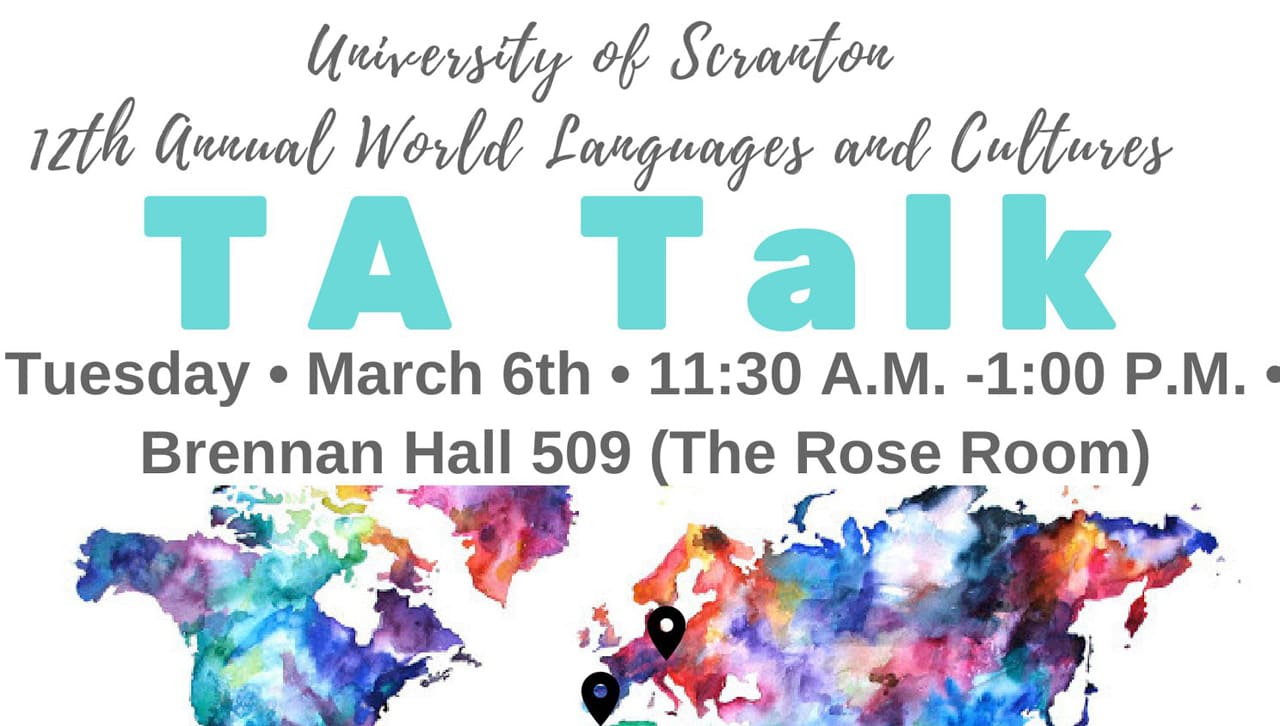
You are invited to attend the 12th annual World Languages and Cultures TA Talk featuring our Fulbright Teaching Assistants from Morocco, Germany, and Mexico. The TAs will share about their countries, cultures, and languages on Tue., March 6 from 11:30 a.m. - 1:00 p.m. in the Rose Room in Brennan Hall 509. All are welcome. Lunch is provided, but space is limited, so please RSVP by Feb. 27. Contact Hannah Jackson at 570-941-4711 or hannah.jackson@scranton.edu with questions or to RSVP.
You are invited to attend the 12th annual World Languages and Cultures TA Talk
Twenty-two University of Scranton education majors are serving as student teachers during the spring semester at nine local schools in the following seven school districts: Forest City Regional, Riverside, Mid Valley, Carbondale Area, Scranton, Valley View and Wayne Highlands.
The following is a list of undergraduate and graduate students who are serving as student teachers during the spring semester and the schools to which they have been assigned.
Micheal T. Ayres of Baltimore, Maryland will student teach at Mid Valley Secondary Center;
Mary H. Brennan of Browndale will student teach at Honesdale High School;
Jessica T. Briante of Sleepy Hollow, New York, will student teach at Valley View Elementary Center;
Siena M. Cardamone of Mayfield will student teach at Valley View Intermediate School;
Lauren Coggins of Clarks Summit will student teach at Mid Valley Secondary Center;
Jesssica L. D’Aquila of Brookfield, Connecticut, will student teach at Mid Valley Secondary Center;
Marissa DiBella of Scotch Plains, New Jersey, will student teach at Valley View Middle School;
Nicole M. DiVivo of Mahwah, New Jersey, will student teach at Carbondale Area Elementary School;
Jessica Earley of Milford will student teach at Valley View Elementary Center;
Emma Gilroy of Scranton will student teach at Valley View Elementary Center;
Sadie Guthrie-Kretsch of Scranton will student teach at Mid Valley Secondary Center;
Colleen Lange of Lincoln Park, New Jersey, will student teach at Mid Valley Secondary Center;
Céline A. Langlard of France will student teach at Mid Valley Secondary Center;
Aileen Moore of Yonkers, New York, will student teach at Valley View Elementary Center;
David W. Moss of Scranton will student teach at Mid Valley Secondary Center;
Jessica Muccigrosso of Brooklyn, New York, will student teach at Dunmore Elementary Center;
Monica E. O’Malley of Scranton will student teach at Riverside Junior Senior High School;
Briana M. Pugliese of Basking Ridge, New Jersey, will student teach at Forest City Regional High School;
Christy Rose of Montclair, New Jersey, will student teach at Valley View Middle School;
Kevin M. Steinke of Scranton will student teach at Valley View Middle School;
Katelyn M. Talty of Rockville Center, New York, will student teach at Valley View Middle School;
Samantha Wojcik of Brooklyn, New York, will student teach at Carbondale Area Elementary School.
University of Scranton graduate and undergraduate education majors began serving as student teachers at nine local schools this semester.

Guerrilla Girls on Tour are internationally acclaimed feminists, activists and artists dedicated to the creation of collaborative art with the intention of educating, entertaining and transforming audiences. Donna Kaz, also known as Aphra Behn, of the Guerrilla Girls on Tour, will be at The University of Scranton on March 1 to present “PUSH/PUSHBACK – Nine Steps to Make a Difference with Art and Activism.”
The event, which is free of charge and open to the public, will begin at 5:30 p.m. in the PNC Auditorium of the Loyola Science Center. The program is co-sponsored by the Women’s Studies Program, the Jane Kopas Women’s Center, the Multicultural Center, the Schemel Forum, the Art and Music Program and the Hope Horn Gallery at The University of Scranton. It is free and open to the public. Copies of Kaz’s recent book “UN/MASKED: Memoirs of a Guerrilla Girl on Tour” will be available to purchase at the event.
The Guerrilla Girls on Tour formed in 2001 and mix a variety of comedic techniques such as parody, sketch, improvisation, song and dance into a distinct feminist theater style. Since the group’s formation, each member wears gorilla mask when at public events and takes on the pseudonym of a woman artist. The group has toured through 41 states and 17 countries, offering more than 200 performances and workshops in theaters, classrooms, art galleries, community centers and cafes.The group is not affiliated with the Guerrilla Girls.
For more information about “PUSH/PUSHBACK – Nine Steps to Make a Difference with Art and Activism,” contact Jamie Trnka, Ph.D., director of women’s studies and professor of world languages and cultures, at jamie.trnka@scranton.edu or by phone at 570-941-4370.
The University will host PUSH/PUSHBACK: The Guerrilla Girls on Tour presentation of “Nine Steps to Make a Difference with Art and Activism.”

The University of Scranton has appointed Jean Lenville as associate dean of the Weinberg Memorial Library. She first joined the University’s library staff in 2012 as assistant dean and has served as interim associate dean since January 2016.
Prior to coming to the University, Lenville worked for 10 years at Harvard University’s Widener Library, where she was responsible for acquiring, managing and providing services for serials and electronic resources. She held professional library positions at the University of Richmond and George Mason University. She also worked at Boston College and Loyola Marymount University Law Schools.
Lenville earned her bachelor’s degree from Emerson College and her master’s degree in library science from Simmons College. Lenville was a member of the Leadership Lackawanna class of 2013, where she worked on the Phoebe Snow Dining Car Project.
At the University, Lenville is currently serving as a member of the Middle States Self Study Steering Committee.
The University of Scranton has appointed Jean Lenville as associate dean of the Weinberg Memorial Library.
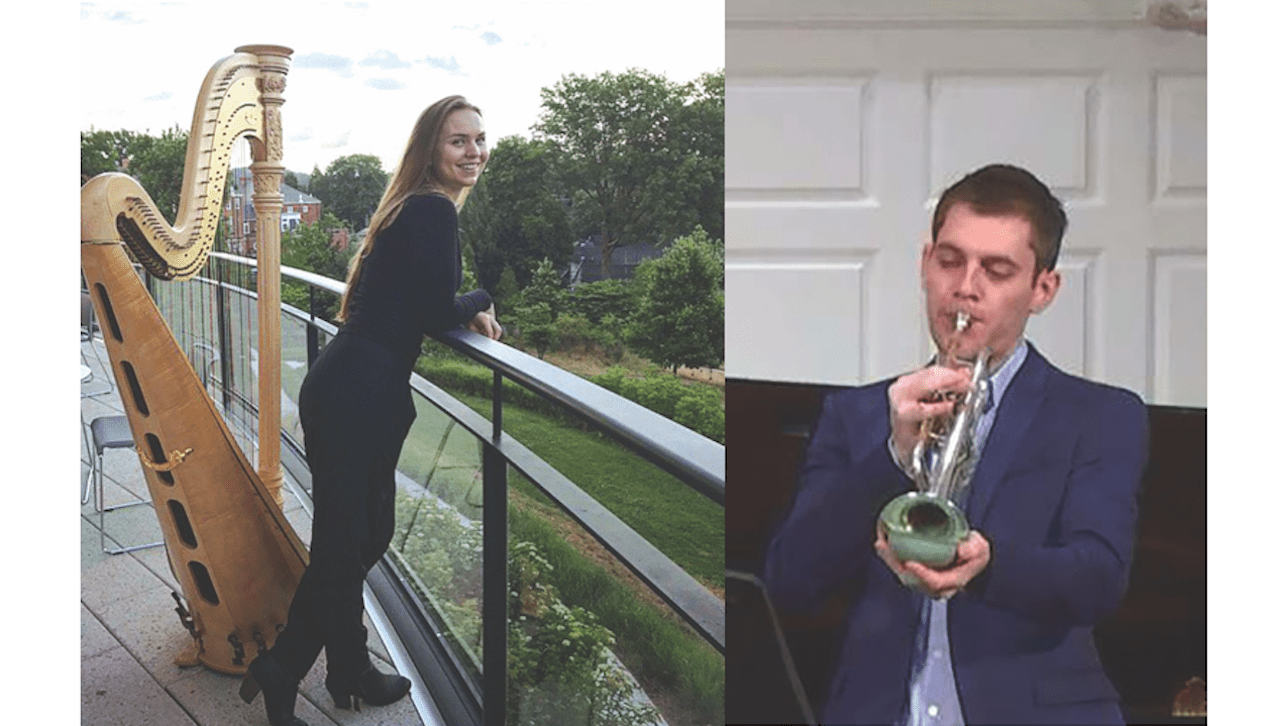
Performance Music at The University of Scranton will present a recital by harpist Marg Davis and trumpeter Jon Shadle on Saturday, March 3.
The concert will begin at 7:30 p.m. in the Houlihan-McLean Center, Mulberry Street and Jefferson Avenue, downtown Scranton. Admission is free, with seating on a first-come, first-seated basis.
Davis is returning to the University just months after performing at Performance Music’s 50th Annual Noel Night concert in early December. There, Performance Music Conductor and Director Cheryl Y. Boga was deeply impressed with the young harpist’s down-to-earth professionalism.
“She’s a great artist, but also a great workman. She walks in and she’s just no fuss, no muss. Low maintenance, very high quality,” Boga said of Davis, whose brother, Michael Davis, recently brought his vintage jazz ensemble, the New Wonders, to the University.
When Boga told the harpist that she’d enjoy collaborating again, Davis mentioned that she and Shadle were about to undertake a spring tour. At the recital, the duo, who also are a couple, will feature unpublished, Hungarian compositions for trumpet and harp, plus transcriptions of classic European chamber pieces for piano and voice.
In addition, the recital will include Davis performing solo harp pieces written by 18th-, 19th- and 20th-century French, British and Dutch composers.
While harp and trumpet tend to be an underutilized combo, Boga promised audiences will be enchanted by the depth of skill and musicality that Davis and Shadle bring to the combination of the instruments.
“The different colors of the interplay of those instruments, particularly in this concert hall, which has really neat acoustics to it, is just gorgeous,” Boga said. “Harp in this hall has a magic, as does trumpet. Putting them together is pretty awesome, so we’re excited to have them here.”
Davis and Shadle first met while studying at The Juilliard School, then eventually formed a chamber music duo. Besides their undergraduate degrees from Juilliard and their graduate work at the Yale School of Music, they’ve studied and performed at many high-profile summer music festivals, including the Aspen Music Festival, Norfolk Chamber Music Festival, Bowdoin International Music Festival and Chautauqua Music Festival.
Besides regularly performing recitals and concerts along the East Coast as a duo, they each have performed throughout the United States and abroad as soloists and ensemble musicians. In addition, both Davis and Shadle teach masterclasses, workshops and private lessons.
Committed to spotlighting little-known works for trumpet and harp and transcriptions of other chamber pieces, the duo also composes original music for their contemporary band, Astoria Window, which will soon release its debut EP.
For further information on the recital, call 570-941-7624, email music@scranton.edu or visit scranton.edu/music. For more information on Davis and Shadle, visit music.yale.edu and juilliard.edu.
Harpist Marg Davis and trumpeter Jon Shadle will perform March 3 at 7:30 p.m. in the Houlihan-McLean Center at the University.
P.W. Costello, Scranton artist and master penman, became a national figure in the early 1900s for his work in engrossing, the calligraphic embellishment of documents. An avid reader of Shakespeare, Costello loved theater and classic literature, which served as the backbone of his work with portraitures.
Through April 23, “Distinguished for Their Talents – Theatrical Portraits by Scranton Master Penman P.W. Costello, 1905-1930” is on display in the Heritage Room of Weinberg Memorial Library.
Thomas W. Costello, great-grandson of the artist, discussed the artist, the collection and its inspiration.
“He loved theater. And he loved classical literature. He was an avid reader. Many people in Scranton knew him as both an engrosser and a portrait artist, particularly if they were the subject of one of his engrossed documents that included a portrait. Those who frequented one or both of his restaurants, lined with framed drawings, knew him primarily as a portrait artist,” said Thomas Costello.
P.W. Costello was born in the Minooka section of Scranton in 1866, the son of poor Irish immigrants. He had no formal training or education as an artist, instead honing his skills by reading and studying art books. At the time Costello began his engrossing work, there were only about 200 engrossers in the country.
Using photographs of prominent stage figures for reference, Costello created hundreds of pen portraits in black ink and umber or rose-colored watercolor pigments. Cross-hatching, stippling and brushed, layered washes were trademark elements of his portrait work.
“It took him a couple decades to develop a style. The exhibit shows his refinement of a cross-hatching technique that he mastered by the early part of the century,” said Thomas Costello.
Costello’s peers in the profession considered him to be one of the best engrossers and illustrators in the country. He was a self-taught artist whose career in Scranton spanned a total of 45 years. Through correspondence courses and detailed, published art instructions, he dedicated himself to the education of young pen artists.
On Tuesday, March 27, at 6 p.m. in the Heritage Room of the Weinberg Memorial Library, Thomas Costello will speak on his great grandfather’s career, and Michael Friedman, Ph.D., professor of English and theatre at The University of Scranton, will speak on Shakespearean performance at the turn of the 20th century.
To learn more about Scranton’s master penman, visit scranton.edu/library/costello to read Thomas Costello’s biographical essay, “The Life and Art of P.W. Costello” and to view a digitized version of the exhibit.
For additional information, call 570-941-6341 or email archives@scranton.edu.
“Distinguished for Their Talents – Theatrical Portraits by Scranton Master Penman P. W. Costello, 1905-1930" exhibit featured in library.

What club are you an officer for?
I’m the president and founder of the Compassion for Animals Club here on campus. Our mission is to spread a message of kindness towards all creatures, even those who often are overlooked. We aim to be a voice for the voiceless within the Scranton community.
What is the most difficult aspect of being a club officer?
Being able to take a group of individuals, who often don’t know each other, and form them into a group of friends. Although it is difficult to bring people out of their shells, it is the most rewarding part of the job as well. I love looking at my club members and seeing friendships form and connections being made. Not only is this important for club morale, but it also helps with making the club the best it can be. Students work better as a cohesive team when they feel a bond of friendship.
What are three essential skills for any officer, in your opinion?
I think that a club leader should be passionate, cooperative and resilient. An officer has to be completely passionate about the mission of the club for there to be
How has being a club officer translated into your everyday life?
Being a club officer has given me the confidence and the skills necessary to be successful in any leadership position I would potentially take on. I learned to not be afraid to speak in front of large crowds and to voice my opinion. I learned how to organize large meetings and events while still guiding the members. I learned how to work with others efficiently. I learned that I’m stronger than I thought I was and that I can achieve my goals if I work hard enough for them. I encourage every student to join a club and run for office if they have the chance. Leaders in these small settings make the best leaders on and off campus.
Leadership Experience Q and A with Christina Brannon '20

Black History Month Celebration!
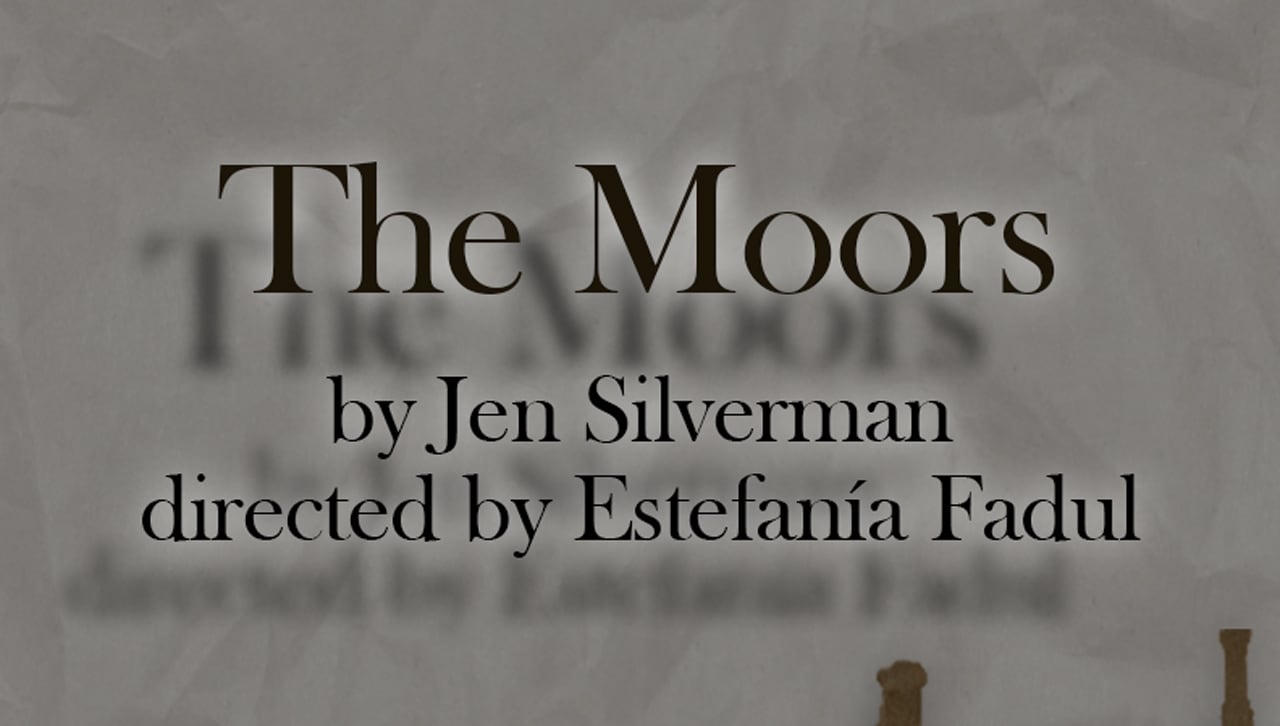
SCRANTON, Pa.- Feb. 19, 2018- The University of Scranton Players will present Jen Silverman’s play “The Moors,” directed by Estefanía Fadul. The show runs March 1-4 in the Royal Theatre in the Joseph M. McDade Center for Literary and Performing Arts. Thursday, Friday and Saturday performances begin at 8 p.m., and Sunday shows begin at 2 p.m.
“The Moors” follows two sisters and their dog living on the English moors as they wrestle with desires and expectations of love and power. This dark comedy premiered at Yale Repertory Theatre in 2016 and opened off-Broadway in New York City in February 2017 at The Playwrights Realm. Silverman is the recipient of the Yale Drama Series Award and the Helen Merrill Award.
The production features Sophia Cornejo as Agatha; Ali Basalyga as Huldey; Shaye Santos as Emilie; Julia Consiglio as Marjory; Conor Hurley as The Mastiff; and Reilly Charles as A Moor-hen. Basalyga is a graduate of West Scranton High School and Cornejo is a graduate of Hazleton Area High School.
Additionally, the production showcases design and direction from award-winning guest artists. The creative team for “The Moors” includes Heidi Hoffer, set designer; Janice Tellier, costume designer; Dave Yezefski, lighting designer; Sinan Refik Zafar, sound designer; and Estefanía Fadul, director. Hoffer is currently a Fulbright Specialist in Islamabad, Pakistan working at Theatre Wallay, and she has previously been awarded the 2010-2011 Fulbright Scholar Award to South Africa. Fadul is the recipient of the 2017 Bill Foeller Fellowship at the Williamstown Theatre Festival in addition to the 2017 O’Neill/NNPN National Directors Fellowship.
Rehearsing are: Left to Right: Sophia Cornejo, Ali Basalyga, Julia Consiglio and Shaye Santos.
Tickets may be purchased or reserved by calling the box office inside the McDade Center, 570-941-4318, or online at thescrantonplayers.com. Tickets are $10 for adults and $7 for senior citizens, students, and University of Scranton faculty and staff. Second weekend is free for first-year students.
The University of Scranton Players is an academic theatre program that brings exceptional theatre to Northeastern Pennsylvania every season. The Players’ productions feature University of Scranton students in a mix of classical and contemporary works under the direction and mentorship of award-winning faculty and guest artists. The Players are celebrating 25 years in the McDade Center this season.
For tickets, contact the Players box office at 570-941-4318 or visit us at thescrantonplayers.com. For more information, contact players@scranton.edu or find us on Facebook, Twitter, and Instagram.
From March 1st to the 4th The Scranton Players will be performing 'The Moors."
The Spiritual Exercises of St. Ignatius of Loyola give shape to the spiritual lives of Jesuits and many other Christians. But might these different ways of praying, meditating, and reading scripture be helpful to members of other faiths as well? In response to the call of Fr. Adolfo Nicolas, SJ, the thirtieth Superior General of the Jesuits (2008-2016) to explore how the Ignatian Spiritual Exercises can be fruitfully appropriated by non-Christians, A World on Fire analyzes the prospects for adapting the Spiritual Exercises in order to make them accessible to members of other faith traditions while still maintaining their core meaning and integrity.
Erin Cline examines why this ought to be done, for whom, and what the aims of such an adaptation would be, including the different theological justifications for this practice. She concludes that there are compelling reasons for sharing the Exercises with members of other religions and that doing so coheres with the central mission of the Jesuits. A World on Fire goes on to examine the question of how the Exercises can be faithfully adapted for members of other religions. In outlining adaptations for the Hindu, Buddhist, and Confucian traditions that draw upon the traditional content of the Exercises supplemented by the texts of these religious traditions, Cline shows how Ignatian spirituality can help point the way to a different kind of inter-religious dialogue – one that is not bound up in technical terminology or confined to conversations between theologians and religious leaders. Rather, in making the Spiritual Exercises accessible to members of other faith traditions, we are as Pope Francis puts it, "living on a frontier, one in which the Gospel meets the needs of the people to whom it should be proclaimed in an understandable and meaningful way."
A World on Fire will be of interest to comparative theologians and scholars working on inter-religious dialogue, religious pluralism, contemplative studies, and spirituality, as well as Jesuit priests and other practitioners who employ the Spiritual Exercises in their ministry.
Professor Cline will give a presentation on this work to the University Community on Thursday, Feb. 22, 2018 in the Kane Forum (Leahy Hall 235). Her presentation will begin at 7:00 p.m. and light refreshments will be served.
A World on Fire analyzes the prospects for adapting the Spiritual Exercises in order to make them accessible to members of other faith traditions while still maintaining their core meaning and integrity.
Come stop by Chipotle in Dickson City on Monday, Feb. 19, from 4-8 p.m. and support The University of Scranton's Leahy Physical Therapy Clinic!

Deadline to complete the Financial Aid Office’s non-University owned off-campus housing survey is Wed., Feb. 28. A $250 Amazon Gift card will be provided to a randomly selected respondent.
Off-Campus Housing Expense Survey

The Office of Equity and Diversity and the Diversity Initiatives Review Board (DIRB) is seeking applications for new Diversity Initiatives Grants.
The University of Scranton’s Master in Health Administration (MHA) program will be nationally recognized by The Commission on Accreditation of Healthcare Management Education (CAHME) and Canon Solutions America for its sustainability initiatives in the context of corporate responsibility and Jesuit pedagogy. The University’s MHA program will receive the prestigious CAHME/Canon Award for Sustainability in Healthcare Management Education and Practice at the March 25th CACHE Congress in Chicago.
Each year, CAHME recognizes excellence in graduate healthcare management education with CAHME- accredited programs and in partnership with leading healthcare organizations. These valued programs are recognized for driving innovation, improving the student experience, and expanding the presence of graduate healthcare management education. Now in its second year, the CAHME/Canon Solutions America Award for Sustainability in Healthcare Management Education and Practice focuses on recognizing universities that are committed to pushing public health forward through dynamic and diverse sustainability-driven activities with proven results.
The University MHA program links sustainability with social justice, public health, and health disparities through alumni engagement, international experiences, and community project work.
“Global and environmental health issues are complex and universities teaching future leaders in healthcare, as well as corporations serving in this field, have a responsibility to ethically and effectively address health issues. As educators at a Jesuit university, we take this responsibility very seriously and are deliberate in our efforts to teach our students to be leaders in addressing issues of social justice and sustainability in order to better serve all people, and especially to care for those who are the most vulnerable,” said Debra Pellegrino, Ed.D., dean of the Panuska College of Professional Studies, which houses the health administration program at Scranton. “We are grateful CAHME and Canon are taking the lead in recognizing sustainability in health administration programs with this award, which is so important for the future of healthcare, and we are honored that the University was selected to receive the 2018 award.”
“We are so grateful for Canon’s support of this award, as it recognizes programs that are advancing the quality of graduate healthcare management education,” said Anthony Stanowski, DHA, president and CEO of CAHME in a news release announcing the award. “Canon is an important partner in this work.”
“It’s an honor to announce The University of Scranton Master in Health Administration as our 2018 Sustainability in Healthcare award winner,” said Peter Kowalczuk, president of Canon Solutions America. “Together with CAHME, we are truly committed to helping improve the quality in academic healthcare management education and promoting continuous evolution in the preparation of future healthcare leaders. Canon Solutions America congratulates The University of Scranton on this great achievement and we look forward to their program pushing personal and professional growth for its students while embracing diversity in the health education community.”
According to CAHME, the mission of the University’s master in health administration program helped to secure the award. The program’s mission is to provide local, regional and international students a comprehensive and interdisciplinary set of core competencies and values for health administration jobs in a variety of healthcare organizations. Additionally, the program contributes scholarship to its disciplines, especially applied research, publications and presentations.
The innovative curriculum of the University’s MHA program includes a “Fit for the Profession” component to ensure readiness for profession, said Steven Szydlowski, D.H.A., program director of the University’s MHA program. In addition, sustainability components imbedded in the curriculum include administrative residency project for sustainability in healthcare as part of the program’s 8-credit Administrative Residency course (HAD 581), which is required course for all MHA students. Dr. Szydlowski said projects cover global, environmental, financial, social sustainable issues and involve developing and implementing a sustainability project in an applied healthcare setting. Elements of sustainability are also addressed in other elective courses, as well as through other initiatives such as study abroad experiences.
CAHME is an interdisciplinary group of educational, professional, clinical, and other health sector organizations devoted to quality improvement of education for healthcare management and administration professionals. Additionally, CAHME accreditation establishes the standard of measurement of graduate healthcare management education for the world community.
To learn more about Canon Solutions America’s partnership with CAHME, visit here.
About CAHME:
CAHME serves the public interest by advancing the quality of graduate healthcare management education in the United States and Canada. CAHME is the only organization recognized by the Council on Higher Education Accreditation to grant accreditation to individual academic programs offering a professional master’s degree in healthcare management education. CAHME Accreditation is the benchmark for students and employers that ensure the integrity of healthcare management education. For more information, visit Cahme.org.
About Canon Solutions America, Inc.
Canon Solutions America provides industry leading enterprise, production, and large format printing solutions, supported by exceptional professional service offerings. With the technology offerings of the Canon and Océ brands, Canon Solutions America helps companies of all sizes improve sustainability, increase efficiency, and control costs through high volume, continuous feed, digital and traditional printing, and document management solutions. A wholly owned subsidiary of Canon U.S.A., Inc., Canon Solutions America is headquartered in Melville, N.Y. and has sales and service locations across the U.S. For more information on Canon Solutions America, please visit csa.canon.com.
The University’s Master in Health Administration program to receive the CAHME/Canon Award for Sustainability in Healthcare Management.

Barry X. Kuhle, Ph.D., associate professor of psychology at The University of Scranton, proposed to his wife on Valentine’s Day, but his research shows despite all the romantic hype of the holiday, in reality many couples ironically break up on Valentine’s Day because there are so many pressures and expectations. The hype, he says, actually moves many to think of all the reasons they don’t want to remain in the relationship.
Men do most of the dumping, and his research on cues to commitment suggests that there are many reasons men end relationships on the day that most express their love:
According to Dr. Kuhle people in their 20s may break up because they feel they have plenty of time to find better options. Thirty-somethings often have a goal in mind and cut their losses quickly if they don’t like their prospects. Those 40 and older may feel pressure to find the right mate. There are so many reasons to blame good old Cupid, it seems. Even teenagers feel the sting of his poor aim.
Dr. Kuhle’s research focuses on the evolved psychological mechanisms that underlie commitment and jealousy in romantic relationships. He is also interested in the evolution and development of menopause and sexual fluidity in women.
The research of psychology professor Barry X. Kuhle, Ph.D., shows all might not be celebrating on Valentine’s Day.
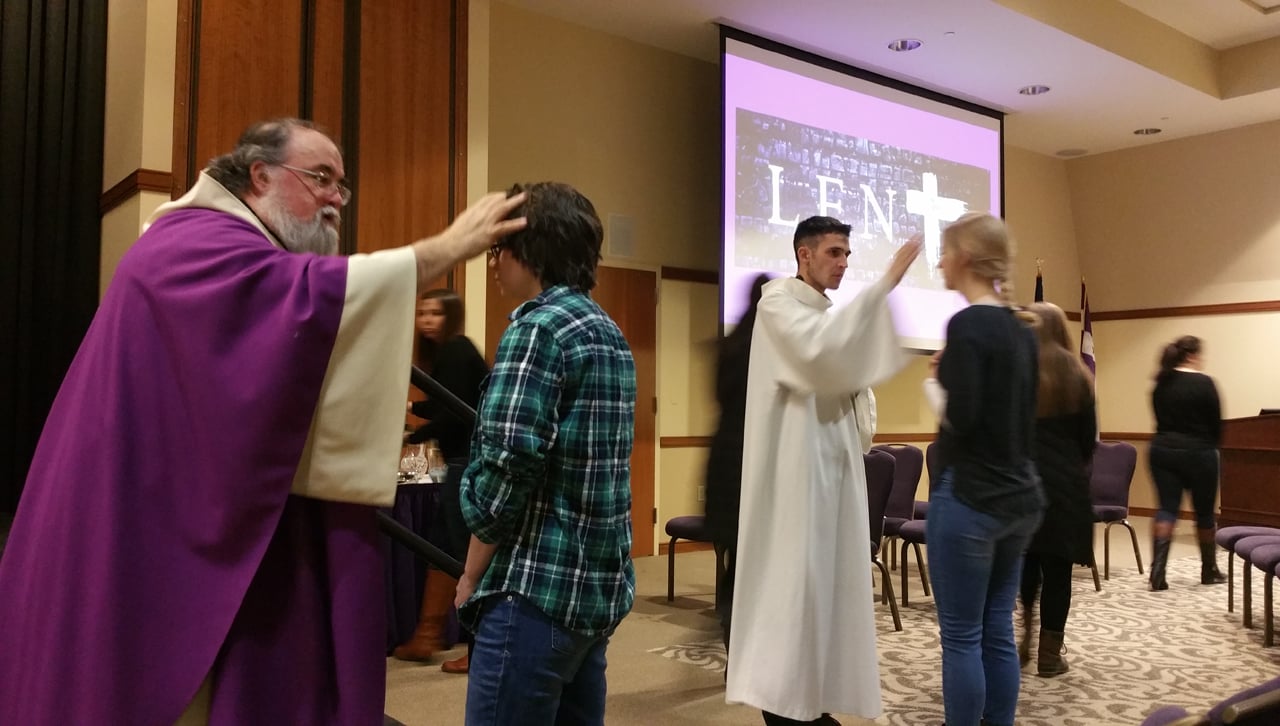
A reflection by Rev. Patrick D. Rogers, S.J., executive director of The Jesuit Center.

The University of Scranton will test its emergency notification system on Thurs. Feb. 15.
The University uses Everbridge to send notices of emergencies, school closing and delays to members of the campus community via employee office phones, Scranton email addresses and numbers registered by employees and students to receive these notices by voice or text.
Members of the University community wishing to register, verify or update contact information for emergency notices may do so through the My.Scranton portal by using the ENS Registration tab or the “Local Contact/Emergency Notification System Registration” link in the Emergency and Password Information box on the home tab.
The University’s emergency text alerts originate from 893-61 or 878-44. The email address for alerts is alerts@scranton.edu and phone alerts will also display 570-941-5427. Students, faculty and staff are asked to save these to their contacts in order to identify future emergency notification alerts.
The University of Scranton will test its emergency notification system on Thurs. Feb. 15.

The Jesuit Center would like to invite you to take part in a Lenten reading group. The purpose is simple. We would like to bring together a small group of people for some good, meaningful conversations during Lent.
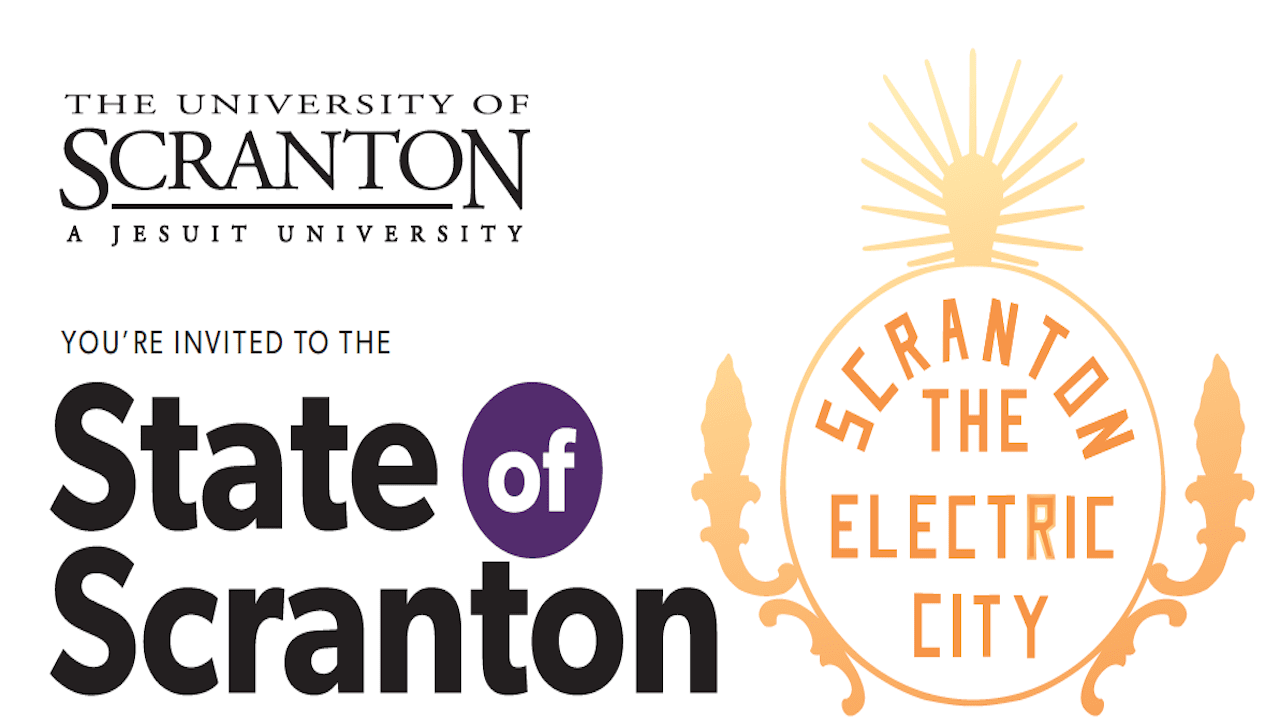
Through campus and guest speakers, the State of Scranton seminar series serves to engage the varied opportunities and challenges facing the Greater Scranton area.
Thursday, March 8, Brian Ebersole, the Senior Director of Springboard Health, Geisinger, will be presenting a discussion on "How will Scranton be the healthiest place in the country?" Springboard Health was founded in 2016 as a breakthrough approach to solving critical national and global health challenges. The seminar will provide an overview of Springboard Health's work and also explore opportunities for community-based research and other collaborations.
Date: March 8
Time: 11:30am-1:00pm, light lunch provided.
Location: Rose Room, Brennan Hall
RSVP: jessica.durkin@scranton.edu or 570-941-4419
This series is presented by Campus Ministries' Center for Service and Social Justice and the Office of Community and Government Relations in cooperation with the Jesuit Center, Faculty Senate, Staff Senate, and the Ellacuría Initiative.
The State of Scranton Seminar Series returns on Thursday, March 8, with presenter Brian Ebersole.

“Broad-based property ownership was necessary for a democratic republic to exist and sustain itself and not to fall apart,” said Joseph R. Blasi, Ed.D., the J. Robert Beyster Distinguished Professor at Rutgers University, at Schemel Forum World Affairs Luncheon held recently at The University of Scranton.
A former top policy advisor on employee share ownership and profit sharing to the Clinton presidential campaign, Dr. Blasi explored the concept of economic inequality in his lecture titled “The Citizen’s Share: Reducing Inequality in the 21st Century.”
“Dr. Blasi has built his stellar career on idealism. I would say a pragmatic idealism. His look to employee ownership is an important approach to arriving at economic fairness. He is widely considered the world’s leading expert on the subject of how workers and companies can share profits and ownership to strengthen the middle class. He has advised leaders in many parts of the world on that subject, working with both Republicans and Democrats all over the country,” said Sondra Myers, director of the Schemel Forum.
Dr. Blasi provided brief background of his book, “The Citizen's Share: Putting Ownership Back Into Democracy,” published in 2013. He discussed the American history behind owning shares and reviewed companies that have gone global within the past few decades.
“You can create as many corporations as you want and as many shares as you want. Profit sharing is the way of the modern world. A number of American entrepreneurs have gone global, very quickly, and have started thinking of this idea of broad-based property ownership. One of the first was the Pillsbury family,” said Dr. Blasi.
The author also discussed the importance of what his ideals mean for each individual, as well as on a larger scale, specifically in Lackawanna County.
“The people who are able to have economic liberty now are people who own capital. They own stock, bonds and real estate, and they live off of the income from that capital. These are the members of the population that have economic liberty,” said Dr. Blasi. “The rest of us are not in that situation. And this impacts you because today 77 percent of all wealth and property in the hands of the richest 10 percent.”
Dr. Blasi teaches undergraduate and graduate courses on corporate governance at Rutgers University. He is a research associate at the National Bureau of Economic Research and has written a total of 13 books.
The World Affairs Luncheon Seminar series is sponsored by Munley Law.
For more information on Schemel Forum programs and memberships, contact Sondra Myers, Schemel Forum director, at 570-941-4089 or sondra.myers@scranton.edu.
'Reducing Inequality in the 21st Century' discussed at the University’s Schemel Forum World Affairs Luncheon Series.

|
The Jane Kopas Women's Center is excited to announce the continuation of our Safe Zone Training Workshops!

Have you thought about quitting tobacco? A group can help. Come to the tobacco cessation group to learn about the many on-campus resources to help. The program is made possible by a generous gift from CVS Health.
Mon., Feb. 12
5:30 p.m. - 6:30 p.m.
410 WEINBERG MEMORIAL LIBRARY
Open to students, staff
Sponsored by the Center for Health Education & Wellness
For more information contact chew@scranton.edu.
Have you thought about quitting tobacco?
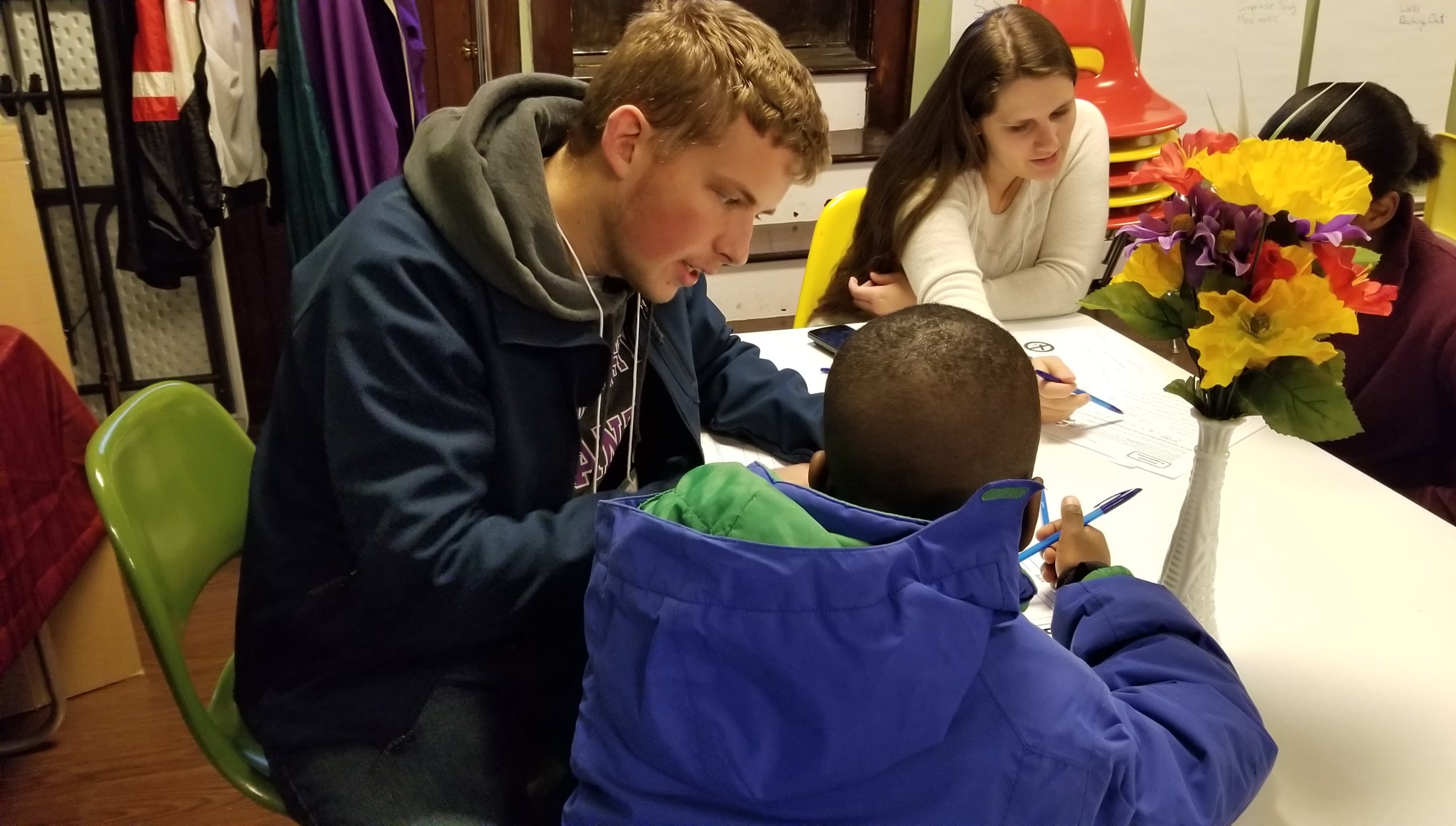
In an interview with the New American Economy, Dr. Helen Wolf shares the work of University students who formed a tutoring program for local refugee youth. You can find the article here.
The Executive Director of Campus Ministries, Helen Wolf, was interviewed by the New American Economy about the University's refugee solidarity work.

Learn about Major Erik Johnson's journey from soldier to occupational therapy student to Army Chief Medical Officer and his current mission of integrating gaming into occupational therapy at Walter Reed.

Campus Ministries together with the Commuter Student Association held the second annual Commuter Retreat from Jan. 19 to 20 at Chapman Lake.
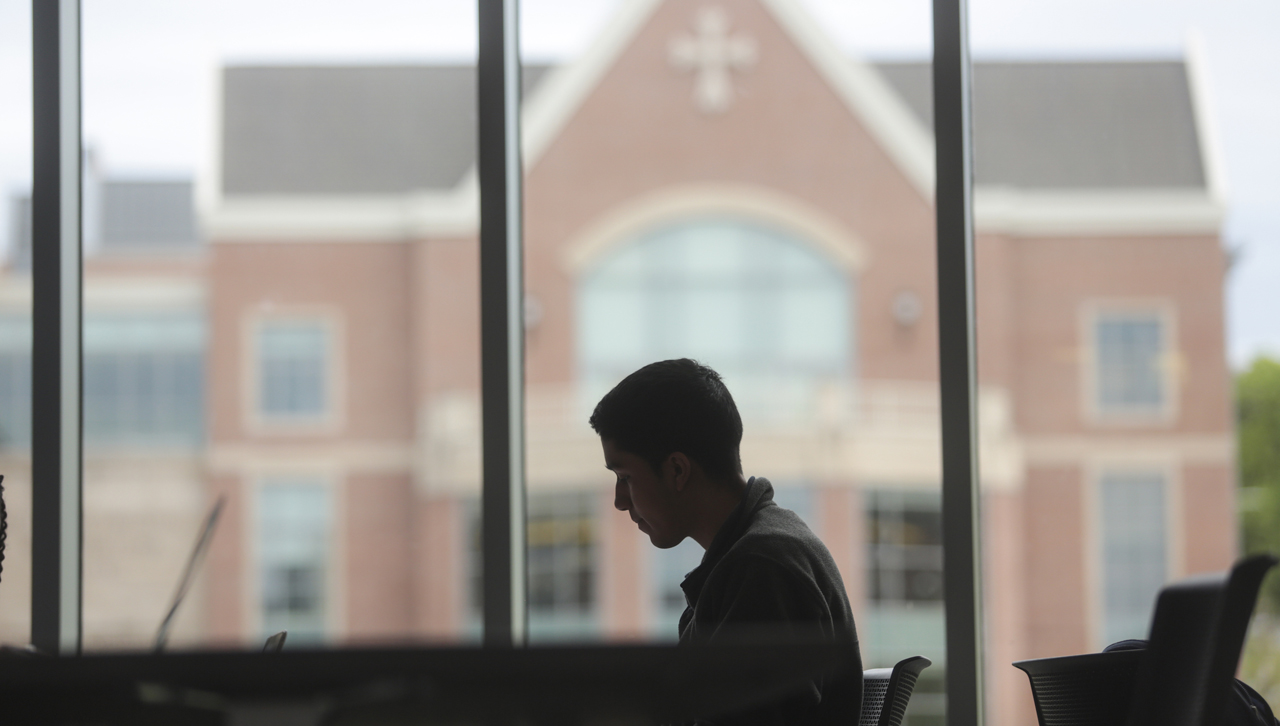
2018-2019 Available Scholarships
Check out: scranton.edu/financialaid
Click on Scholarships and Grants; Additional Scholarship Opportunities. Refer to application for deadlines.
Deadline: April 27, 2018
The Times-Shamrock Communications Scholarship
Leslie Fay Scholarship
Cinram Manufacturing Scholarship
The Fleet PA Services Scholarship
The United Gilsonite Laboratories Scholarship
TRL Associates Scholarship
The John and Lucille Guzey Scholarship
The James Burns Memorial Scholarship
Neal Fasula Scholarship
Irving Grossman Scholarship
Joseph Gallagher Scholarship
Purple Club Scholarship
Need information on scholarships for the upcoming academic year? Read on.

Take Back The Night is an international event which strives to raise awareness of and end sexual and interpersonal violence.
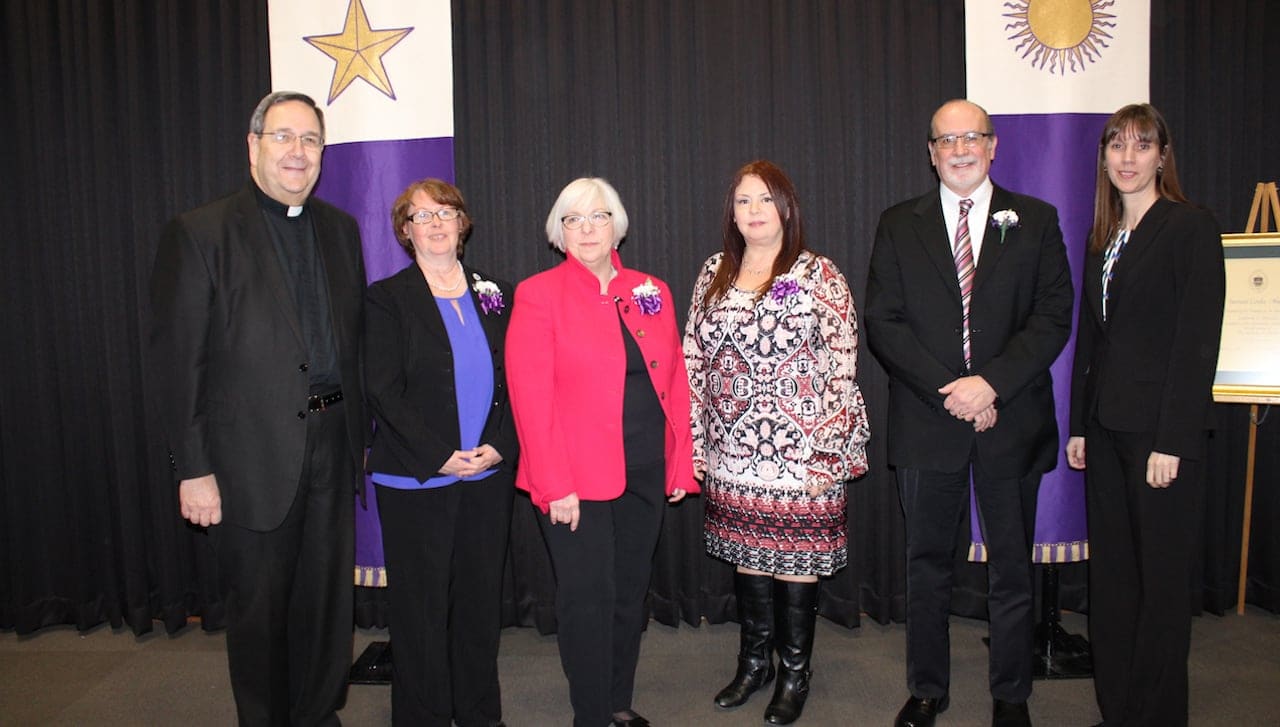
Rev. Herbert B. Keller, S.J., interim president at The University of Scranton, delivered the State of the University address and honored staff members with Sursum Corda Awards at the Spring Convocation, which took place in the McIlhenny Ballroom of the DeNaples Center on Feb. 1. New staff members who joined the University between Feb. 17, 2017 and Feb. 1, 2018, were also recognized at the convocation.
Sursum Corda (Lift Up Your Hearts) Awards recognize members of the University’s professional/paraprofessional staff, clerical/technical staff and maintenance/public safety staff who have made outstanding contributions to the life and mission of the University. This year’s recipients were: Tim Barrett, supervisor of electrician and mechanics trades; Margaret Hynosky, associate director of financial aid; Catherine Mascelli, assistant director of the Center for Health Education and Wellness; and Jennifer Pennington, administrative assistant for the Office of Equity and Diversity.
Father Keller thanked the recipients for the “significant contribution” each has made and continues to make “to the life of this Jesuit University.” He also said in his remarks that it was a “privilege” to work with faculty and staff of the University and noted many examples he observed of “both the big things and the little things” they do to “make the University the special place that it is.”
Father Keller said that with just 6.7 percent of the world’s population being able to obtain a college education, the work being done at the University is both “a blessing and a responsibility.”
Drawing from a recent Boston College publication, Father Keller said “those who are Jesuit educated are called to participate in the transformation of the world. A person cannot be considered whole without an educated solidarity with other human beings, in their fears and hopes and especially in their needs.”
Discussing the meaning of Jesuit education at “the deepest level,” Father Keller said “Jesuit education seems to inspire students to want more and to seek to live with enthusiasm. And, because we believe the world in infused with the grandeur of God, one will want to transcend oneself and get to our ultimate meaning and it’s there that one will find God. That is why this Jesuit University is here and, as servants of this mission, that is why we are here.”
The University presented Sursum Corda (Lift Up Your Hearts) Awards to four staff members at a convocation held on campus.

Through Mar. 9 Art Exhibit: “Berenice D’Vorzon: Works on Paper.” Hope Horn Gallery, Hyland Hall. Free during gallery hours. Call 570-941-7624 or email darlene.miller-lanning@scranton.edu.
Through Apr. 23 Art Exhibit: “Distinguished for Their Talents – Theatrical Portraits by Scranton Master Penman P. W. Costello, 1905-1930.” Heritage Room, Weinberg Memorial Library. Free during library hours. Call 570-941-6341 or email archives@scranton.edu.
Mar. 1 5:30 p.m. Art Presentation: PUSH/PUSHBACK: The Guerilla Girls on Tour! “Where Do Ideas Come From?” featuring The Guerilla Girls. Co-sponsored by the Women’s Studies Program; the Department of World Languages and Cultures; the Jane Kopas Women’s Center; the Multicultural Center; the Art and Music Program; Schemel Forum; and the Hope Horn Gallery at The University of Scranton. PNC Auditorium, Loyola Science Center. Free. Call 570-941-7624 or email darlene.miller-lanning@scranton.edu.
Mar. 1-4 8 p.m. Thursday, Friday and Saturday; 2 p.m. Sunday. Performance: “The Moors” presented by The University of Scranton Players. McDade Center for Literary and Performing Arts. Fees vary. Call 570-941-4318 or email players@scranton.edu.
Mar. 3 7:30 p.m. Performance Music: “In Recital” featuring Marg Davis, harp, and Jon Shadle, trumpet. Houlihan-McLean Center. Free. Call 570-941-7624 or email music@scranton.edu.
Mar. 5 noon. Schemel Forum’s Munley Law World Affairs Luncheon Series: “Understanding the Americans Who Joined ISIS” presented by Alexander Meleagrou-Hitchens, Ph.D., research director, program on extremism, George Washington University. Rose Room, Brennan Hall. Registration required. Fees vary. Call 570-941-6206 or email alicen.morrison@scranton.edu.
Mar. 7 7:30 p.m. Performance Music: “General Recital” featuring The University of Scranton Performance Music students. Houlihan-McLean Center. Free. Call 570-941-7624 or email music@scranton.edu.
Mar. 19 noon. Schemel Forum’s Munley Law World Affairs Luncheon Series: “Shared Past, Divergent Courses: Zionism and Palestinian Nationalism, Part 3, The Israel-Palestinian Conflict, 1979-Present” presented by: David N. Myers, Ph.D., president/CEO of the Center for Jewish History and Sady and Ludwig Kahn Professor of Jewish History, UCLA; and Hussein Ibish, Ph.D., senior resident scholar, Arab Gulf States Institute, Washington, D.C. Rose Room, Brennan Hall. Registration required. Fees vary. Call 570-941-6206 or email alicen.morrison@scranton.edu.
Mar. 20 7 p.m. Latin American Film Festival: “Orfeu Negro” Brazil 1959. Pearn Auditorium, Brennan Hall. Free. Call 570-941-7778 or email yamile.silva@scranton.edu.
Mar. 22 6 p.m. Northeastern Pennsylvania Reading Association “Using Children’s Literature to Teach for Social Justice” presented by Debra Pellegrino, Ed.D., dean, Panuska College of Professional Studies, The University of Scranton. Room 227, Leahy Hall. Call 570-941-6305 or email diane.muniz@scranton.edu.
Mar. 23 9 a.m. Computer Programming Contest for high school students. Loyola Science Center. Registration required. Call 570-941-7774 or email robert.mccloskey@scranton.edu.
Mar. 24 9 a.m. Preview Day for accepted students to The University of Scranton’s class of 2022. Various locations on campus. Call 570-941-7540 or email admissions@scranton.edu.
Mar. 25 7:30 p.m. Performance Music: “In Concert” featuring The Mannes School of Music Brass Ensembles, Mark Gould, director with The University of Scranton Singers and organist Timothy E. Smith. Houlihan-McLean Center. Free. Call 570-941-7624 or email music@scranton.edu.
Mar. 27 6 p.m. Art Exhibit Reception: “Distinguished for Their Talents – Theatrical Portraits by Scranton Master Penman P. W. Costello, 1905-1930.” Thomas Costello, P. W. Costello’s great-grandson, will speak on Costello’s career and Michael Friedman, Ph.D., professor of English, The University of Scranton, will speak on Shakespearean performance at the turn of the 20th century. Heritage Room, Weinberg Memorial Library. Free. Call 570-941-6341 or email archives@scranton.edu.
Schemel Forum Courses
Wednesdays: Mar. 7, 21, 28 & Apr. 4, 11, 18 6 p.m. Schemel Forum Evening Course: “The Sixties: Making Sense of a Formative Era” presented by David Friedrichs, distinguished professor of sociology, criminal justice and criminology, The University of Scranton, and faculty members from other academic disciplines. Weinberg Memorial Library. Registration required. Fees vary. Call 570-941-6206 or email alicen.morrison@scranton.edu.
Mondays: Mar. 19, 26 & Apr. 9, 16, 23, 30 6 p.m. Schemel Forum Evening Course: “The Habsburg Monarchy 1519-1918” presented by Sean Brennan, Ph.D., associate professor of history, The University of Scranton. Weinberg Memorial Library. Registration required. Fees vary. Call 570-941-6206 or email alicen.morrison@scranton.edu.
The following is a list of University of Scranton events that are open to the public for the month of March 2018.
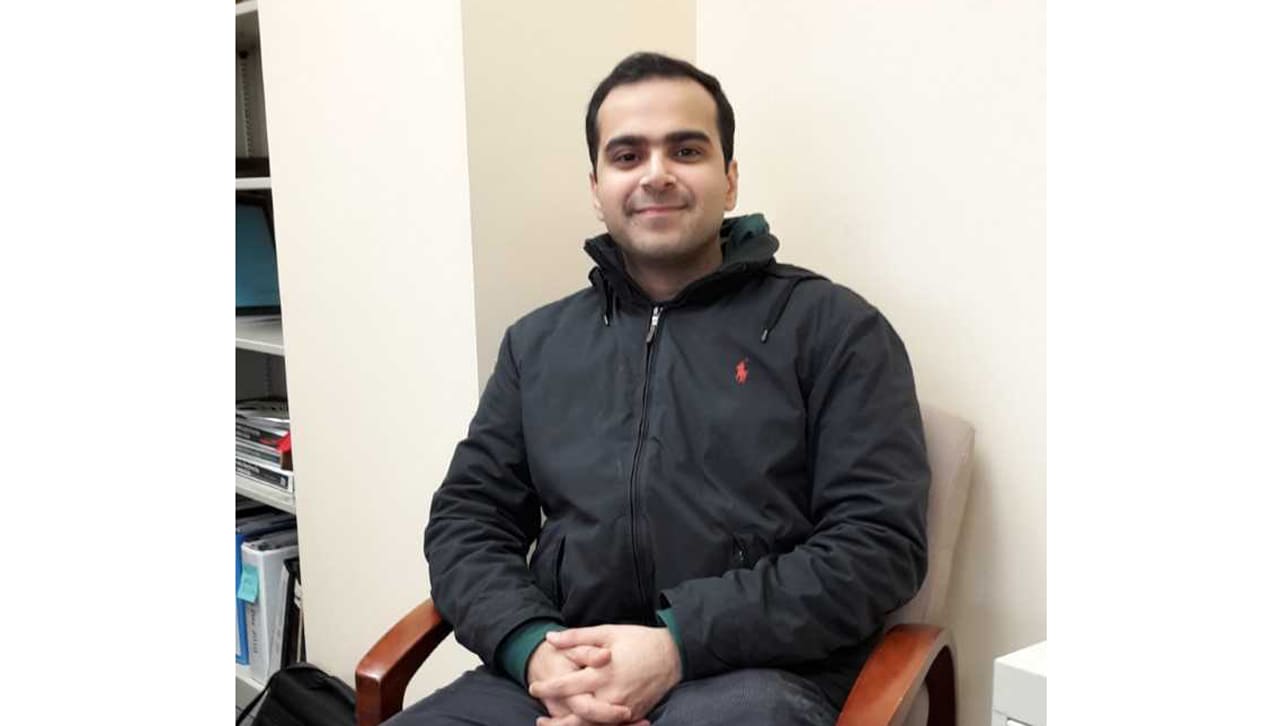
Hurr Hamdani ’18, graduate student in Scranton’s MBA program, will present at the first spring Global Insights program on Thursday, February 22 at 11:30 a.m.
Evan Qiang, a 10th grade student from Wissahickon High School, Ambler, came in first place in The University of Scranton’s 19th annual Northeast PA Brain Bee competition. Jeremy Harman, an 11th grade student from Wyoming Area High School, came in second place, and Matthew Trotter, a 12th grade student from Forest City Regional High School came in third place.
The competition for high school students in grades nine through 12 was held in February on the University’s campus. It was offered free of charge and was sponsored by the Neuroscience Program at the University and the Scranton Neuroscience Society.
All questions for the competition were drawn from “Brain Facts,” a book about the brain and nervous system published by the Society for Neuroscience.
For more information about next year’s Northeast PA Brain Bee competition, contact Robert Waldeck, Ph.D., neuroscience program director and associate professor of biology, at 570-941-4324 or robert.waldeck@scranton.edu.
Visit the University’s Community Relations website for information about other academic competitions and K-12 programming offered at The University of Scranton.
The University of Scranton hosted the 19th annual Northeast PA Brain Bee for high school students on campus in February.
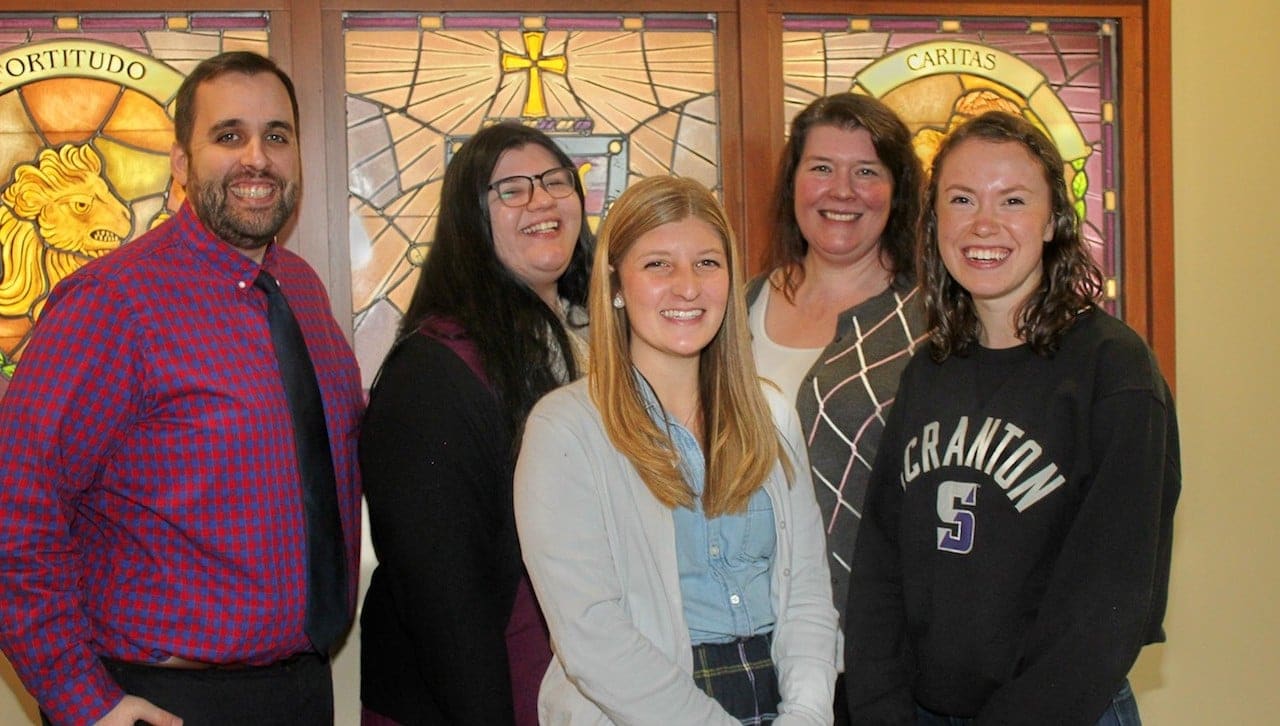
The IGNITE Student Leadership Conference, hosted by The University of Scranton’s Center for Student Engagement, is open to University students as well as students attending a college in Northeast Pennsylvania. Justin Jones-Fosu, an award-winning entrepreneur and author, will be this year’s keynote speaker at the conference on Saturday, Feb. 24.
Focused on personal growth and development, the conference holds sessions about a broad range of leadership topics, including communication, problem solving, team building, having difficult conversations, communication across differences and identity development.
Jones-Fosu, who is also a motivational speaker, is the president/chief inspirational officer of Justin Inspires International, LLC. He has spoken in four countries and for more than 250 organizations which include colleges, businesses and youth groups. He is also the founder of Respectivity, a company that helps workplaces to develop better cultures of respect. Jones-Fosu is the author of “Inspiration for Life: Dream Bigger, Do More, Live Fuller” and “Finding Your Glasses: Revealing and Achieving Authentic Success,” which focuses on building a life of success based on each individual’s core values.
A graduate of Morgan State University and Towson University, where he earned a MBA with a specialization in leadership and organizational, Jones-Fosu was named as one of EBONY Magazine’s “30 Young Leaders on the Rise” in 2008.
The conference will be held at the DeNaples Center and the Loyola Science Center from 10 a.m. to 4 p.m. The registration deadline to attend is Feb. 20 and the cost for non-University of Scranton students is $25.00. For additional information, visit the IGNITE Student Leadership Conference website (http://www.scranton.edu/studentlife/studentaffairs/student-activities/Leadership/IGNITE%20Leadership%20Conference.shtml) or contact the University’s Center for Student Engagement at leadership@scranton.edu.
The University’s Center for Student Engagement will offer the IGNITE Student Leadership Conference to Scranton and other NEPA college students.
Multi-media artist and educator Bayeté Ross Smith and WBRE Eyewitness News investigative reporter Andy Mehalshick were the featured speakers at The Greater Scranton Martin Luther King Commission (GSMLKC) annual celebration and community awards dinner, which took place in January at The University of Scranton. The theme of the event was a “higher destiny” and focused on raising awareness of the impact media portrayal has on the public’s beliefs about race, people, relationships and culture.
At the event, Carl Graziano, chief of the Scranton Police Department, received the Leader of the Year Award Winner and Scranton High School student Oscar Portorreal received the Young Leader of the Year Award.
Area residents were honored at The Greater Scranton Martin Luther King Commission annual awards dinner at The University of Scranton.
The University of Scranton is marking the 15th anniversary of the Leahy Community Health and Family Center and the 10th anniversary of the Edward R. Leahy Jr. Center Clinic for the Uninsured by celebrating the success of the programming inspired by – and run through – these centers. The numerous initiatives made possible by generous donations and dedicated volunteers from throughout our region, as well as students, faculty, staff and alumni, have benefited greatly area residents many of whom are among our most vulnerable populations.
The center, established in 2003 and housed in the University’s Panuska College of Professional Studies, is designed to provide programming opportunities for faculty and students in the area of teaching research and service intended to meet the needs of the greater Scranton community.
“The center and clinic supports the University’s Jesuit and Catholic Mission by leveraging the University’s expertise and resources to serve the most vulnerable populations in the region,” said Debra Pellegrino, Ed.D., dean of the Panuska College of Professional Studies. “Through the center, students in nursing, occupational therapy, physical therapy, counseling and other allied health fields gain practical learning experience through programming that allows them to work with the community under the supervision of the Leahy staff, faculty and physicians. We are literally taking theory into practice while giving back to our community.”
On Feb. 19, 2008, at the dedication of the Leahy Clinic for the Uninsured, which is part of the programming offered through the Leahy Community Health and Family Center, University alumnus and benefactor Edward Leahy said “it is not enough today for a University merely to teach - to talk the talk. Rather, it is more important than ever to put our teaching to the practical test; to implement our learning within our community for the wellbeing of all - University and residents alike … A university today that does not engage with its community is like the plant that, no matter how beautiful, is in danger of withering. Its knowledge comes only from within and, therefore, tends to be secondhand, repetitive and usually one-dimensional.”
The clinic was first established with volunteer physician support offered through the Lackawanna County Medical Society to provide non-emergency health care to uninsured Lackawanna county residents who do not have, and cannot afford private health insurance and who do not qualify for public health insurance.
“As the U.S. health care system becomes increasingly complicated to navigate and more low income residents are seeking care in free and charitable clinics, it is the ideal place for physicians, nurses and other health care professionals to promote social justice and equity in the community where we live and work,” said Andrea Mantione, DNP, director of the University’s Leahy Community Health and Family Center said about the community members who generously support the center.
According to Dean Pellegrino, the clinic has expanded services through the innovative use of undergraduate and graduate student volunteers and faculty members, as well as other University resources. Volunteer community healthcare providers and the Leahy Center and Clinic staff mentor premed, health profession students and facilitate undergraduate and graduate-level nursing students. In addition, undergraduate students from various majors have an opportunity to work alongside staff performing patient intakes, filing charts, assisting clients with follow up care, and serving as medical translators for Spanish, Portuguese and a variety of Asian speaking clients.
In addition to the Clinic for the Uninsured, The Leahy Community Health and Family Center has several other initiatives, which include the University of Success, Alice V. Leahy Food and Clothing Pantry, the “Peacemakers After School” program, exercise and nutrition education programs and the annual disABILITY conference. Each program meets a unique need in the community. For instance, the Alice V. Leahy Food is a student-supported effort to provide low income and at-risk residents and families with healthy and fresh food options. The University of Success is a pre-college program designed to provide academic, social and cultural enrichment and experiences to high school students. The program is funded almost entirely by corporate and foundation grants.
Since opening in 2007, a total of 6,000 patients generated 13,617 visits through the Leahy Clinic and more than 2,500 individuals have participated in programming offered through the Leahy Community Health and Family Center. In 2017, 700 hours were volunteered by community physicians, nurses, pharmacist, interpreters and care coordinators, with an additional provided by professional faculty and staff of The University of Scranton.
Read more about the programming offered through the center in the fall 2017 issue of Challenges in Theory and Practice. To learn more about volunteer opportunities for the medical clinic for physicians, nurses and community members, visit the Leahy Clinic website or call 570-941-6112.
$content.getChild('content').textValue $content.getChild('content').textValue $content.getChild('content').textValue
Milestone anniversaries celebrated for the Leahy Community Health and Family Center and Edward R. Leahy Jr. Center Clinic for the Uninsured.
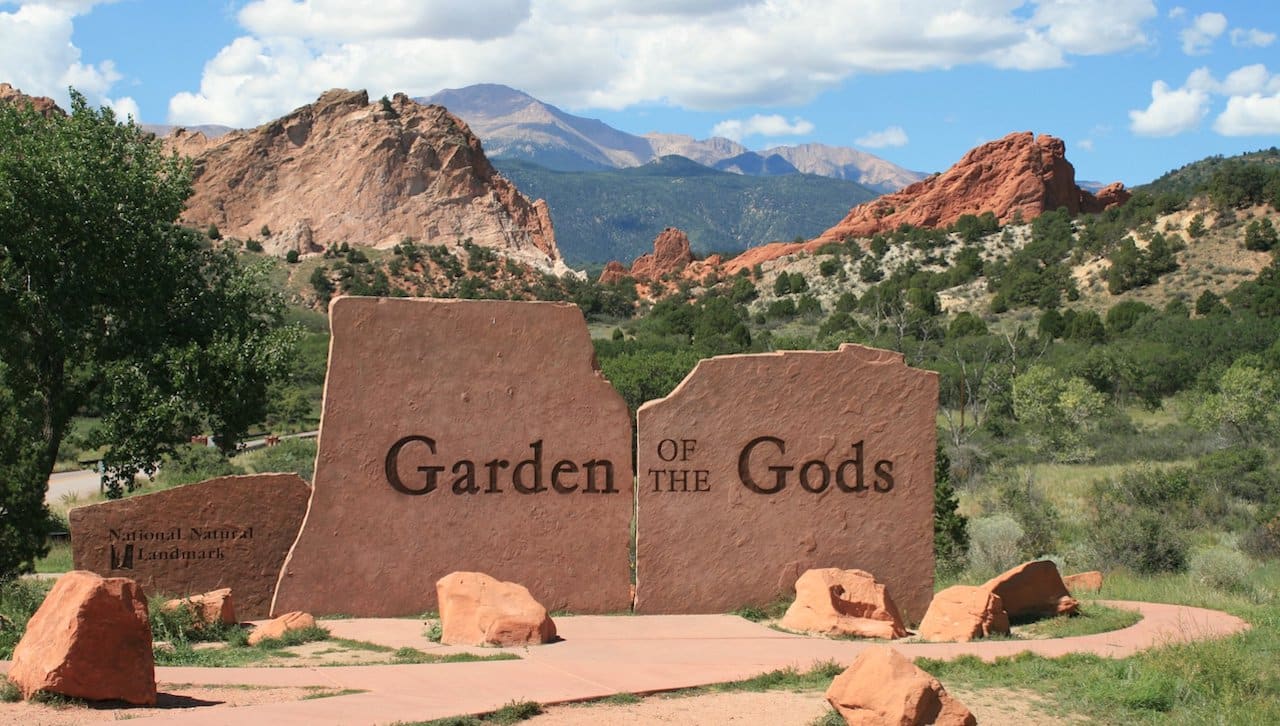
Literature, legend and lore have long held up the humble ant as a model insect citizen. Industrious, organized and future-focused, the tiny creature has a stature grown from its work ethic.
Most people know the famous fable, penned by Aesop, titled “The Ant and the Grasshopper.” As the grasshopper whiles away the summer playing music, the ant busies herself procuring and storing food for winter. When winter arrives, the hungry grasshopper humbly begs for a bite from the scornful ant.
The tale has long sparked debate. Which was truly the wiser creature? And are ants as generous as scientists would have us believe?
That’s one basic question on the mind of University of Scranton Professor Emeritus John R. Conway III, Ph.D., a sought-after authority on a type of inarguably benevolent southwestern and Mexican honey ant (species name is mexicanus) that, in essence, has some greatly swollen workers, called repletes, that live to eat, as much as possible, not for personal pleasure, but for the very survival of the colony.
Dr. Conway’s original 1975 doctoral research on this fascinating ant has retained its relevance for more than four decades. In fact, owing plenty to increased visitor interest in his original research spot – The Garden of the Gods near Pikes Peak – the city of Colorado Springs recently awarded him a $30,000 grant to pick up where he left off.
The background story puts the renewed interest in better context.
The role of a honey ant replete might initially seem enviable: Hang around all day, from the ceilings of specially-constructed underground chambers, and ingest food regularly delivered by other colony workers.
But any images of a life of leisurely excess quickly disappear. Turns out all the hanging around happens because the honey ant repletes, whose abdomens can swell to the size of grapes, can do nothing else and become so engorged they can barely move.
“They spend their whole lives there, prisoners in their own nests, due to their immobility and the small size of the passageways” Dr. Conway said.
Their sole role is to function as living larders, storing food that otherwise would run scarce in arid, or semi-arid climates. Eventually, the honey ant replete, once fully swollen with stored sustenance, is drained.
And there’s the rub.
“As far as we know, once they are drained, they die,” Dr. Conway explained. “So they essentially sacrifice their lives for the good of the colony.”
The process, and these very unusual ants themselves, are cause for intense curiosity, in the scientific community and among the general populace, especially visitors to The Garden of the Gods, where the Rev. Henry Christopher McCook did the first extensive study of honey ants in 1882, Dr. Conway said.
“He was the first one to describe what was actually going on in some detail,” Dr. Conway said, explaining that’s why the Garden of the Gods was the first place he himself went when he decided to pick up McCook’s mantle and study this species of honey ant as part of his Ph.D. research while at the University of Colorado in Boulder.
“I wanted something that was not only of academic interest, but also of popular interest. I was interested in photography and had National Geographic and other popular scientific magazines in mind. Fortunately, I have been able to achieve that,” said Dr. Conway.
Now Dr. Conway, who served as a biology professor at The University of Scranton from 1985 through to his retirement in 2016, can add to his achievements as he revisits his work, especially to compare nest numbers and provide updated data to the city of Colorado Springs.
“They want to see if the number of colonies has increased or decreased and seek my advice on preservation of this unusual ant species for the future,” Dr. Conway said, noting, “One of my main chores is to see if I can relocate the nests I found in 1975.”
He has a vast collection of topographical maps and aerial photographs marking his original nest locations that he hopes will aid him.
If successful, Dr. Conway said, he will have a whole new set of data on how long nests can survive.
Dr. Conway, a world traveler, who during his Scranton tenure also received grants to study in Arizona and the Australian Outback, looks forward to returning to Colorado, but also will miss The University of Scranton and the other places it took him. In Australia, he led Earthwatch expeditions to study another honey ant, Camponotus inflatus, that independently evolved the same adaptation of storing nectar in swollen hanging repletes. Additionally, he investigated the use of these ants in the diet and culture of Australian Aborigines and found that they are still important in the Dreamtime of some tribes who paint them and have honey ant songs.
“One of the things I look back most fondly on from my time at the University was leading tropical biology trips to places such as Belize, Guatemala, Jamaica, Costa Rica and Panama every other intersession,” he said.
Currently, he is also working on lectures and a book on the biologists and naturalists who discovered the approximately 2 million known plant and animal species that constitute the Earth’s incredible biodiversity.
Professor Emeritus at The University of Scranton receives grant to resume a study that he first researched more than 40 years ago.
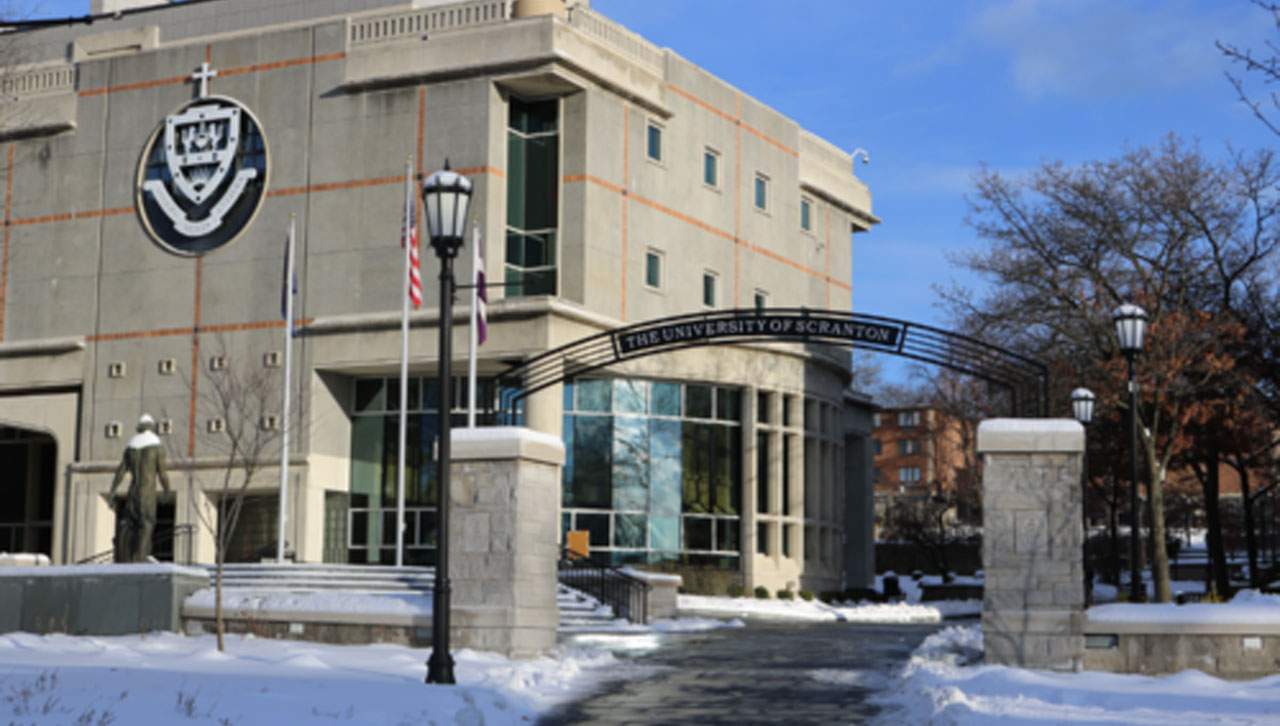
Returning to campus after a (rather long) intersession break can be just as hard as an adjustment as starting a new school year after a summer at home. That's why we asked Dean Rivera, the associate vice provost for Student Formation & Campus Life and dean of students, her thoughts on what students should keep in mind as they settle back into life on campus and hunker down for another semester at The University of Scranton.

Develop a schedule:
"As students return for the start of a new semester with new courses, it’s important to remember to develop a new schedule to manage your time wisely, establish relationships with your faculty, and ensure you are connected to the appropriate support, for example, tutoring and counseling. Don’t wait until you are struggling to do these things!"
Get involved:
"Sometimes people, especially first-year students, are reluctant to get involved in clubs, service, retreats, etc. in the fall semester for fear of being overwhelmed. With the fall semester behind you, challenge yourself to get involved in 1-2 positive campus social experiences. You won’t regret it!"
Help others:
"Remember how special our community is and do your part to foster this! Be active - in the classroom, in clubs and in service. Help others in need - it’s what Royals do! Honor your commitment to the Student Code of Conduct."
So, as we all look to the semester ahead keep Dean Rivera's advice in mind!
Have a great semester and welcome back!
Check Campus Corner periodically for more articles like this about life on campus!
Dean Lauren Rivera offers advice for the new semester.
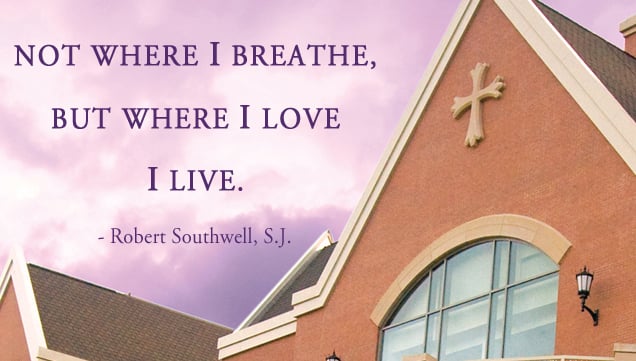
"Not where I breathe, but where I love, I live."
With those 10 words, Robert Southwell, S.J., expressed the importance of love and passion to the human condition nearly 500 years ago. Today, several University of Scranton alumni have chosen to share their love of Scranton with their Royal family by recalling some of their favorite memories, proving pieces of their hearts will always live on campus.
Paul Batt '66
"One of the most memorable experiences occurred during my senior year. Jim McNulty and John A. Walsh were vying to become student body president. At a planned debate on the steps of the now-defunct student center, John A., who was the play-by-play announcer for Royals basketball on our radio station, WUSV, was haranguing Jim about his lack of enthusiasm for attending the games. Jim, having had about enough, strode to the microphone and confirmed that in his mind John A. was indeed 'a huge athletic supporter.' Jim won the election and later became Mayor of Scranton. John A. went on to head ESPN.
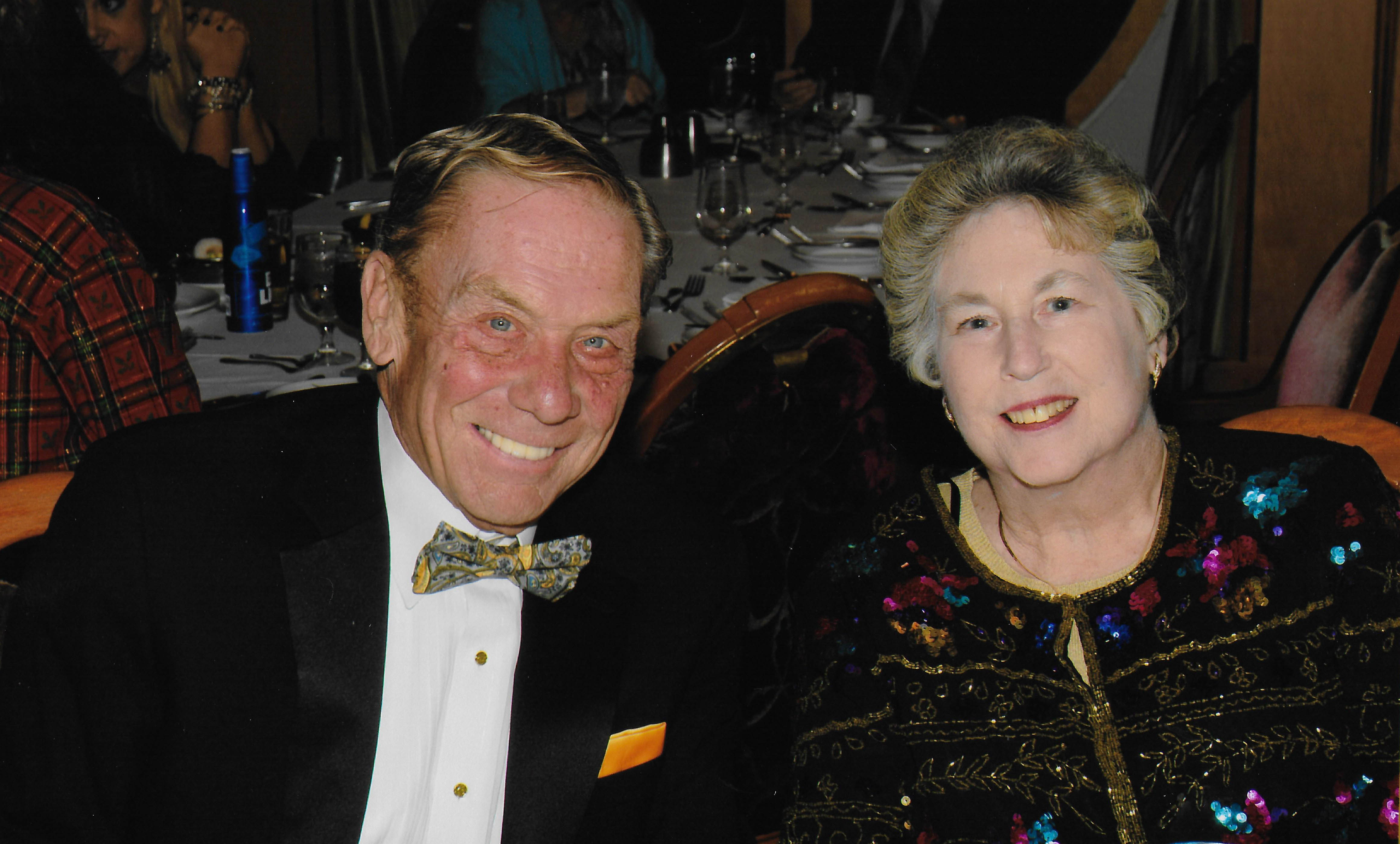
P.S. Picture of me and my wife, a Marywood grad. We met in October of my freshman year at a Scranton mixer and married 5 years later on April fool’s day in 1967."
Mary Beth D'Andrea '82
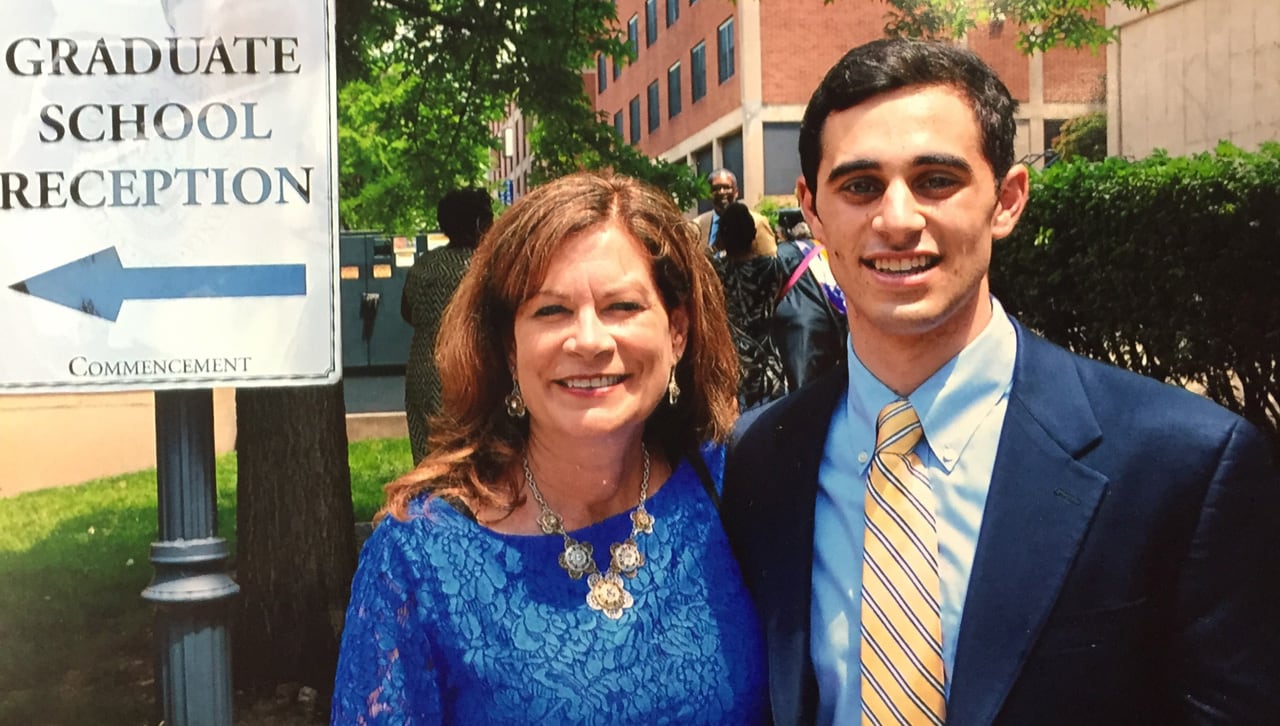
"2016 Graduate School Commencement. A memorable Scranton moment for my family was when Nicholas became a 'Double Royal.' He received his Master's Degree in Accounting in May 2016. He and I are both 'Double Royals.'"
Kevin Dermody '13
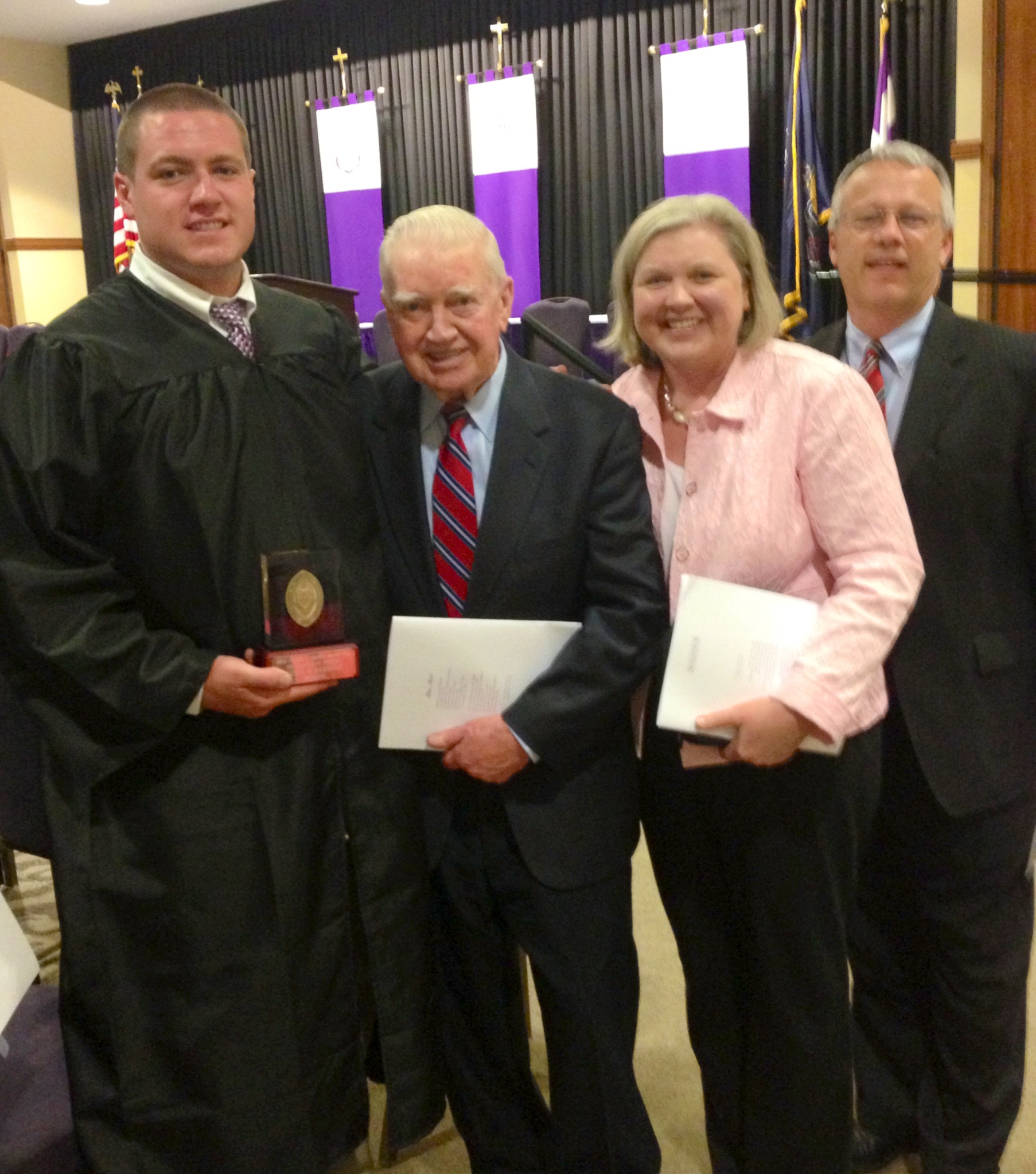
"Three generations of University of Scranton graduates, pictured at the 2013 Class Awards night: Thomas P. Cummings, Sr. '52; Ellen Cummings Dermody '84; Kevin P. Dermody '13; and George T. Dermody, Parent of Class of 2013 graduate. Tribute: 'Scranton runs in our family!'"
Michael Griffin '81
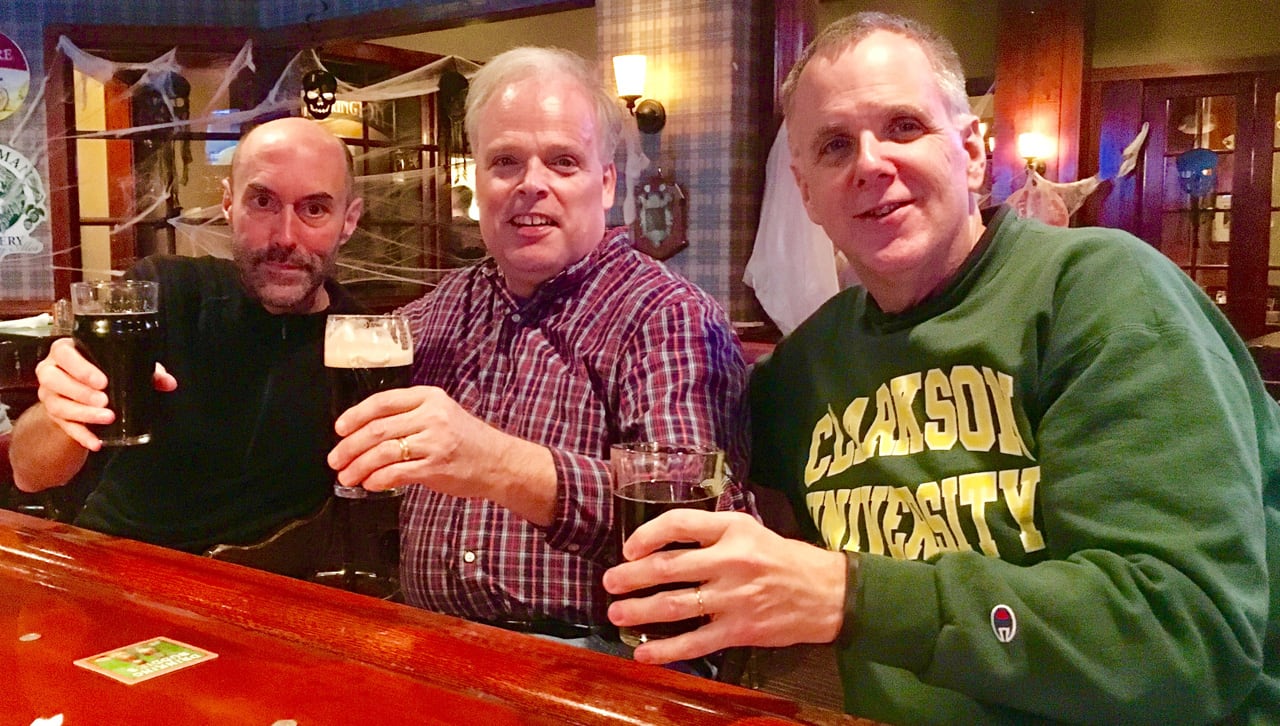
(From left, David Burns ’81, Donald Liotta ’81 and Griffin.)
"The University of Scranton cemented lifelong bonds with the best friends I have today!"
Christine Fanelle Gutekunst '85

"The mountains in view and nearby The University of Scranton inspired me to take up hiking, a lifetime joy that my family and I enjoy doing together at home and wherever we travel. No class reunion is complete without a walk up to Nay Aug Park!"
Theresa Rice Haughey '87
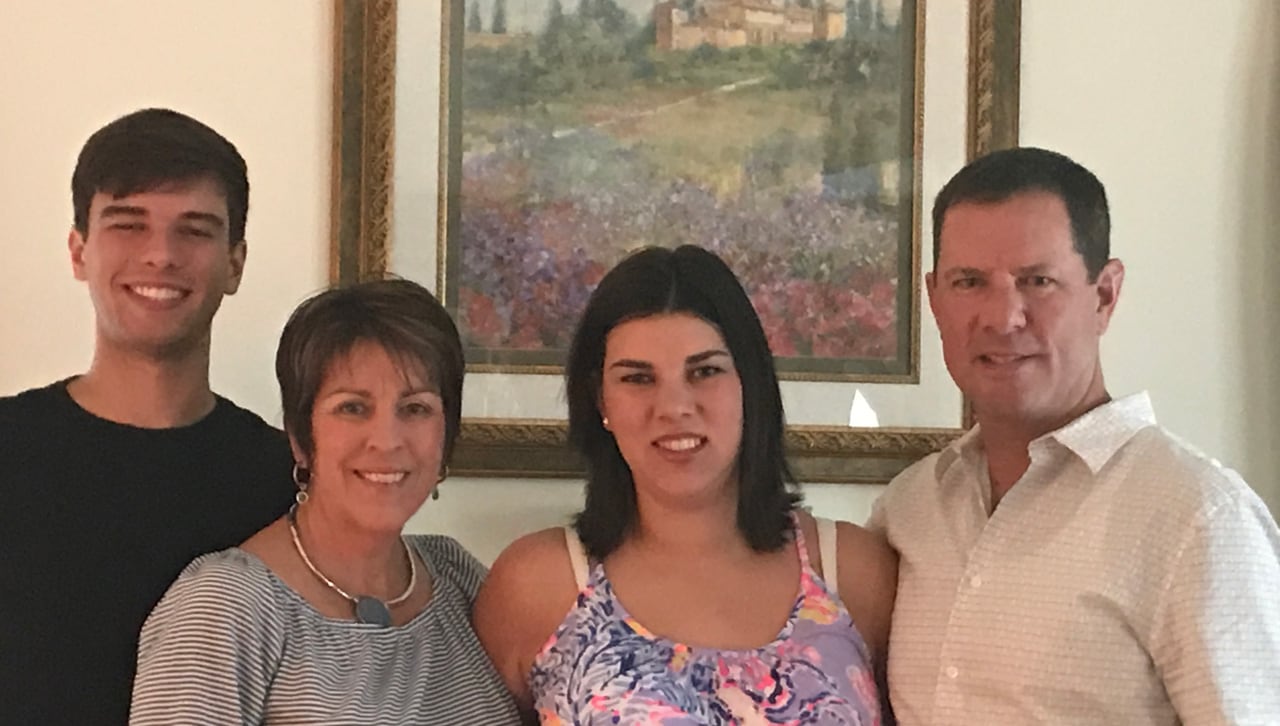
"Favorite memory - walking the Commons and seeing all the painted signs hanging over the Student Center informing us of parties, clubs, 'things going on' around campus prior to social media days! The outside steps of the student center were the heart of the campus; you could always find someone to hang out with in between classes."
Kevin Kucharski '85
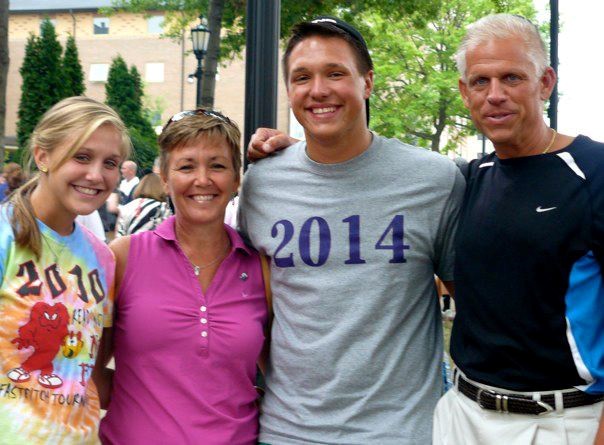
"1985, 2014 and 2016 represented!"
Stephanie Longo '03
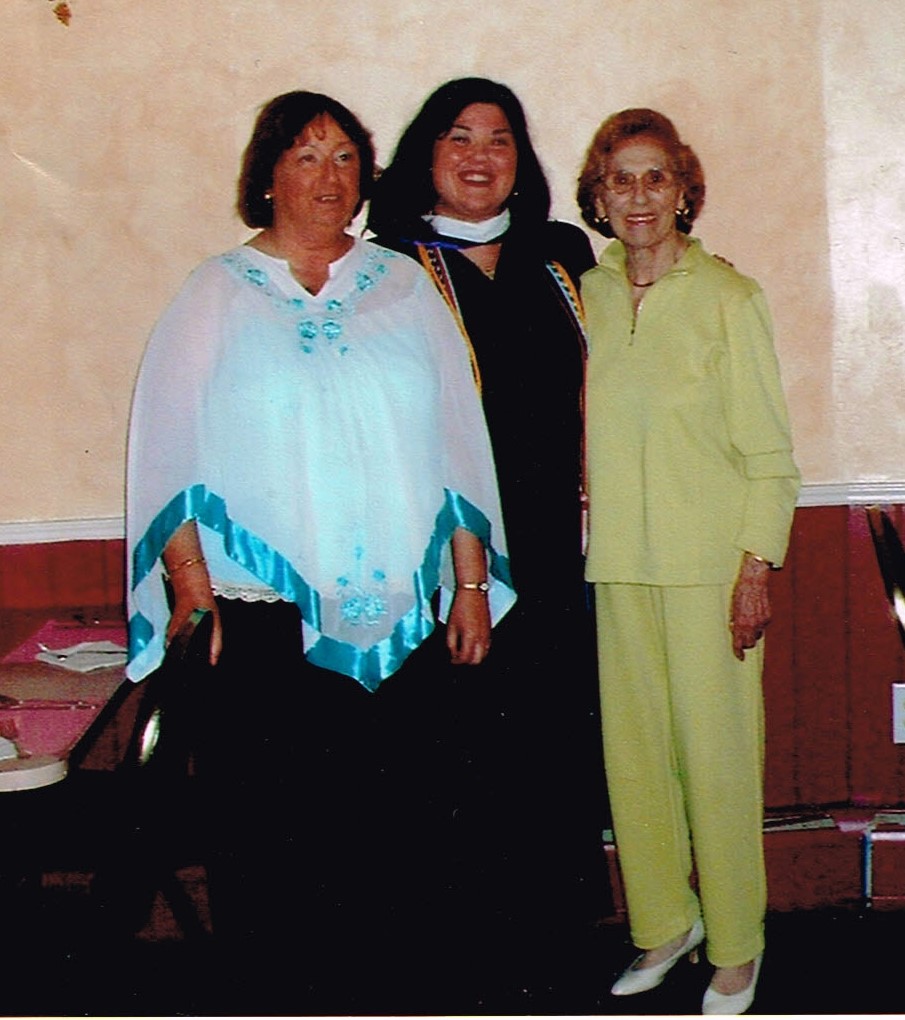
"My favorite memory at the University was when my Aunt Jennie, who immigrated to the United States from Italy, came to visit me on campus one day. I was an Italian major and we had to watch a movie for Italian class and she came down to watch with me. We ended up walking around campus a bit and she mentioned that she took sewing classes as a child in old Leahy Hall. Sewing was her passion! We went inside and she took me right to the room where her classes were held. She passed away in 2008 and when old Leahy Hall was torn down, I took a piece of the rubble so I could always have something to remember that day. The piece of rubble now sits on my desk in my home office."
Patrick McKenzie '06
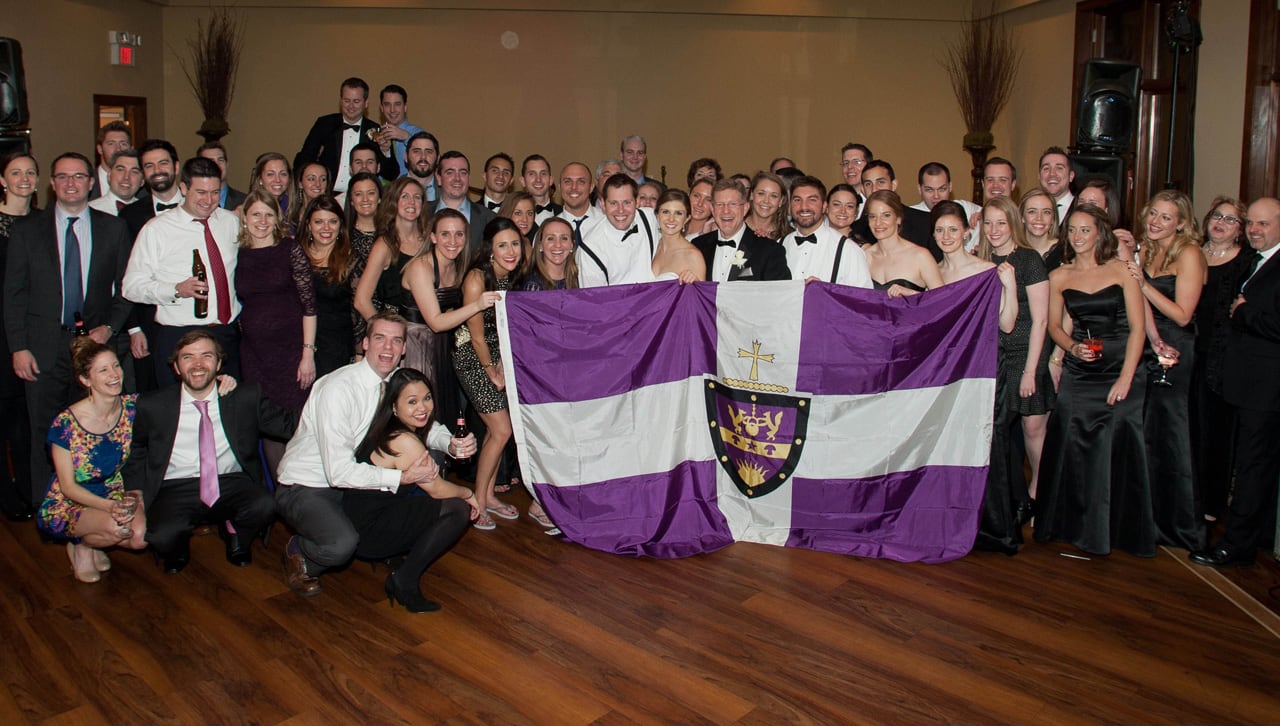
"When I am asked why I love the University so much, my response is because of the community. Every party, wedding, event, incorporates a picture of Scranton alumni because we are incredibly proud of that community."
Kathleen Bowe Mulderrig '87
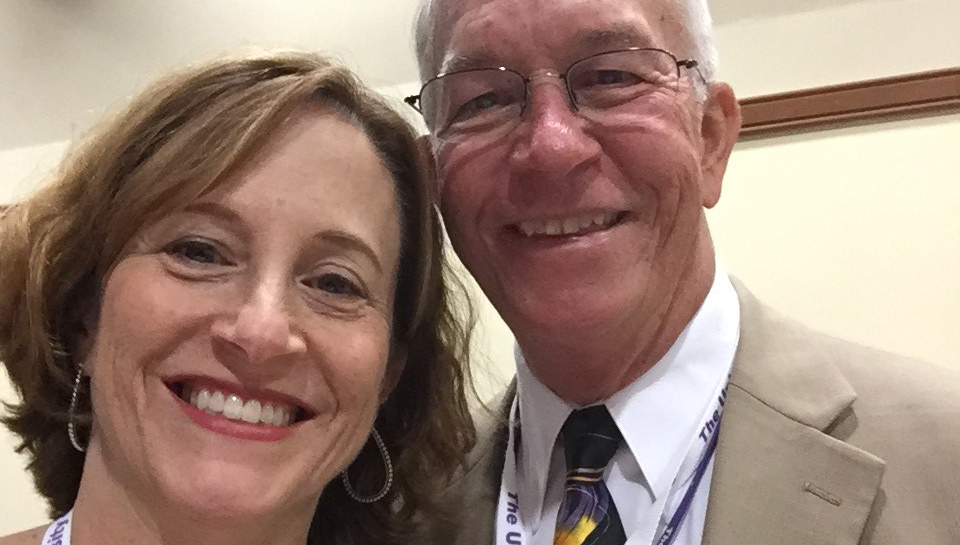
"I have too many fond memories of my time at Scranton to write about just one.The common theme is that I made so many friendships that will last me forever. I loved the community aspect of the school, where even the professors cared about the students as people. It was fun to attend and always fun to go back."
Colleen Neary '88
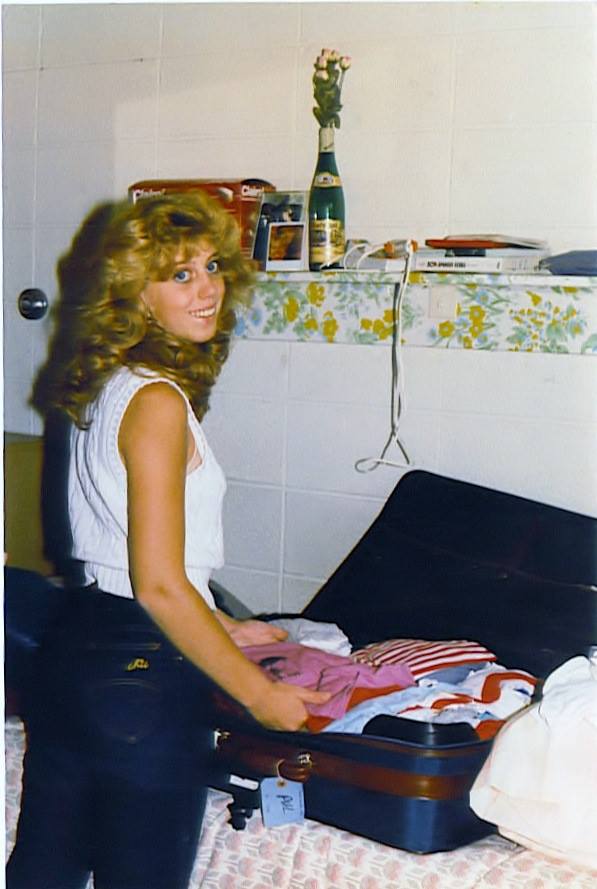
"First day of a lifetime of Scranton love. Nevil's Hall, August 31, 1984."
Joy Oliver '02
"My son James is 18 months old. His favorite article of clothing is his Scranton sweatshirt. He calls it 'Purple.' We have to wash it constantly because he asks to wear it so often. So here's to you, Scranton, on your 130th birthday. James and the Herrick Family wish you many more."
Jess Palmeri '11
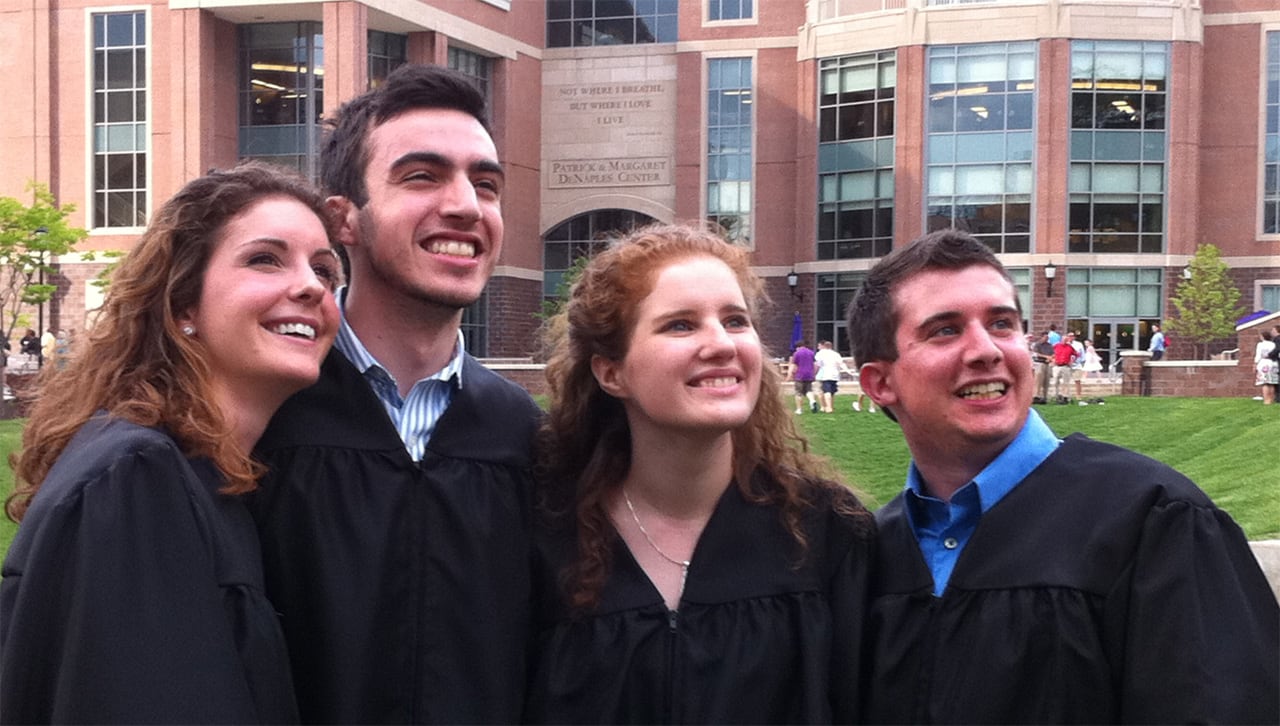
"Natalie Burke ’11, Chris Lantero ’11, Jessica Palmeri ’11, G’13 and Chris Ozoniak ’11 look off into their bright, beautiful futures after Baccalaureate Mass 2011."
Mary Roslonowski '92, G'95
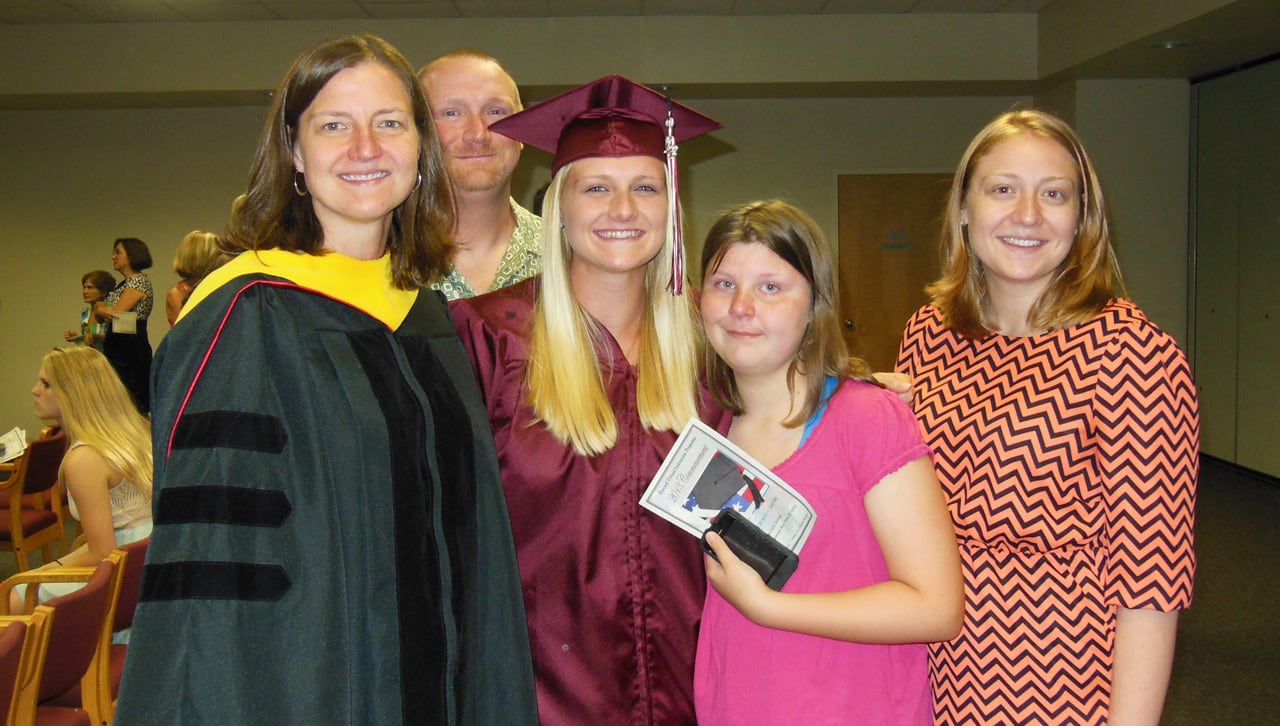
"One favorite memory of Scranton was attending the Smithereens Concert at the gym in February 1992. It was a packed house and it was a really cold night. We listened to their CD over and over again after the concert. The other favorite memory was eating breakfast at the dining hall where they would make you any omelette you wanted or those giant waffles. We loved going there after ROTC PT at 6 a.m."
Mike '99 and Susanna '01 Short
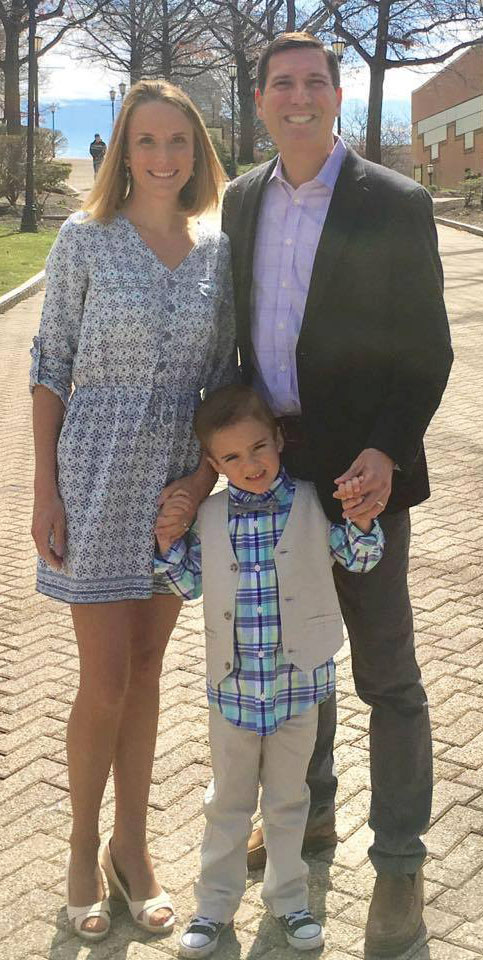
"About a year ago, Fr. Panuska passed away, and we reflected on his invitation to join the Scranton community years ago, so that we could 'grow not only in wisdom, but also in grace.' We are forever grateful to have responded to that invitation as our Scranton experiences have been woven into the fabric of our family's life. We remain good friends with many of the people we connected with on campus back in the late 90's and we've stayed involved in alumni networks. We were out to dinner recently with a non-Scranton friend who commented that he's met many Scranton alums over the years and that he's amazed by how every single grad he's met had a genuinely enriching and overwhelmingly positive experience at Scranton. Isn't it the truth? We proudly display the Gunster sign at our house, and we remember the life-changing experiences we had in a building that no longer exists - in The Aquinas office, in student government, in campus ministry, and even in the cafeterias. We often think of professors who challenged and inspired us. We reminisce about the parties and dorm room hangouts. We recall retreats at Chapman Lake and Masses at Madonna. In every memorable moment, there resides an intangible spirit of community, connectedness, and camaraderie. In essence, The University of Scranton is a good place where good people do good things. We were honored to bring our son to campus for the first time last year as we marked the endowment of our 'Men and Women For and With Others' Scholarship. As we walked the Commons together and remarked on changes to buildings and spaces, we noted that the spirit remains the same. How blessed we are to carry that spirit with us and to pass it along to a future generation. May we be persistent in our pursuit of wisdom and grace."
Mara Smith '13
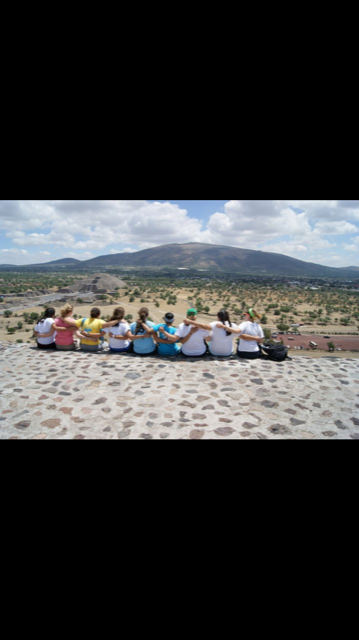
"During our final semester, our SJLA class went on a retreat at Chapman Lake. The entire weekend was filled with laughter and love, but the greatest manifestation of such came during one of our final afternoon sessions. We were each supposed to go around the room and anyone who wanted to could say something kind about the person whose turn it was. What was intended to be a one-hour session became FIVE hours of tears, hugs, laughter, apologies, forgiveness and so much love. I still get chills thinking of how beautiful it was to sit in true community with individuals I had spent my time at Scranton learning and growing with. Over our four years together at Scranton, I think we each fell in love with SJLA and each other, in whatever individual ways our souls allowed."
Joe Sorbera '08
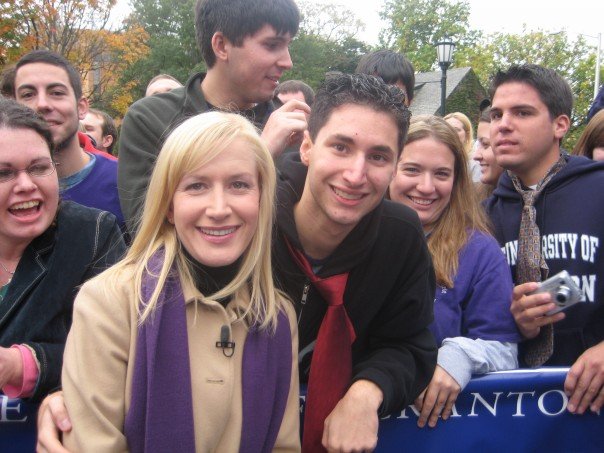
"Who can forget the first time The Office came to Scranton? The whole school (and city!) had such an exciting vibe. It was great waiting with almost the whole school form very early in the morning, being on the Today Show, and meeting the cast, who couldn't have been nicer (and, I think, more shocked at the welcome they received!)."
Share your Scranton love on social media with #LoveScranton. To see these stories and more, visit the #LoveScranton page.
Alumni Share Their Favorite Scranton Memories With Their Royal Family.

Join the Committee on the Status of Women and the Jane Kopas Women's Center for the Women of Courage and Vision celebration reception!
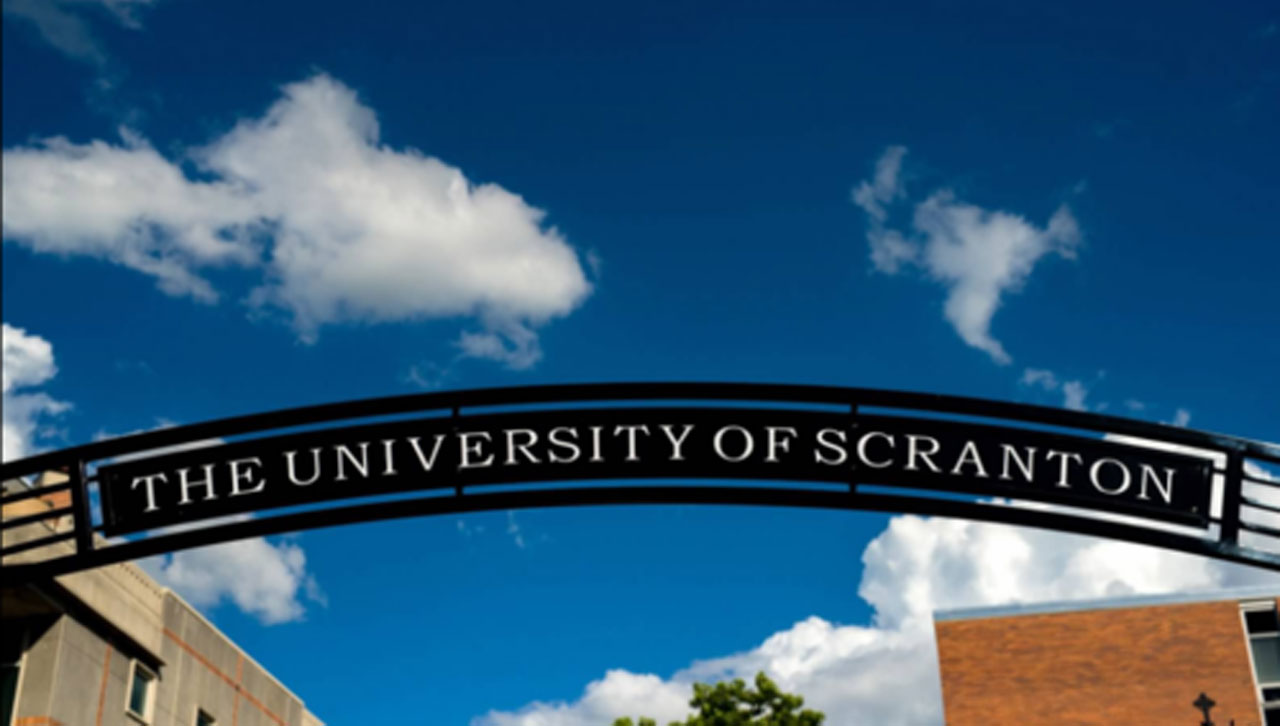
Schemel Forum World Affairs Luncheon Lecture
Friday, Feb. 9, 2018
12:00 p.m. - 1:30 p.m.
The Citizen's Share
Professor Blasi will talk about economic inequality and the concentration of wealth in the US that is destroying America's middle class. He will describe the role that broad-based employee share ownership and profit sharing in companies can play in addressing these problems as discussed in his new book, The Citizen's Share, published by Yale University Press. A book signing will follow the lecture.
Joseph Blasi, Ed.D., J. Robert Beyster Distinguished Professor, Rutgers University School of Management and Labor Relations and Rutgers Business School|New Brunswick
Edward Leahy Hall, Kane Forum, 2nd Floor; Noon to 1:30 p.m.
FREE to University of Scranton staff, students and faculty
Professor Blasi will talk about economic inequality and the concentration of wealth in the US that is destroying America's middle class on Friday, Feb. 9, 2018 12:00 p.m. - 1:30 p.m.

Join us at our Sunday Mass on Feb. 11 at 4:30 p.m. for a special guest and performance by Voices of Triumph Gospel Choir, a student organization visiting us from East Stroudsburg University.

“When I first met Berenice D’Vorzon I was 17, a freshman art major at Wilkes College in Wilkes-Barre, Pennsylvania, and she was my adviser. I was terrified of her,” Darlene Miller-Lanning, Ph.D., said. “Her reputation preceded her. She was thought to be a very tough teacher, very passionate, and she would not let you get away with taking the easy way.”
Dr. Miller-Lanning, director of the University’s Hope Horn Gallery spoke at an art gallery lecture for “The Berenice D’Vorzon Collection at The University of Scranton.” A collection of D’Vorzon’s work is on display in the Hope Horn Gallery through Mar. 9.
“If you told me that I would be standing here tonight talking about her work – that would’ve been unimaginable,” Dr. Miller-Lanning said.
D’Vorzon was an abstract painter, whose works mainly portrays nature through her eyes.
“She painted many images that dealt with the idea of landscape,” Dr. Miller-Lanning said. “The idea that life, death, nature and creative energy are very dynamic – that whole cycle and process is very important – that is what she wanted to address in her own work.”
D’Vorzon’s love for nature allowed her to do a series of works that featured swamps in Alabama and Florida.
“She would talk a lot about the idea that everything is born and lives, grows and dies but sometimes that takes a very long time,” Dr. Miller-Lanning said. “Things changed very rapidly in the swamp, so that was very interesting to her.”
D’Vorzon travelled frequently and the places she visited impacted her work.
“She liked water, rivers, volcanos, glaciers, storms, hurricanes and downpours in the tropics, all of these things were subjects that attracted her attention,” said Dr. Miller-Lanning.
D’Vorzon died in 2014 and many of painting were donated to The University of Scranton. Her memory still lives on in her abstract paintings of nature, which are displayed throughout the Loyola Science Center.
Darlene Miller-Lanning, Ph.D., discussed “The Berenice D’Vorzon Collection at The University of Scranton” at an art gallery lecture Feb. 2.
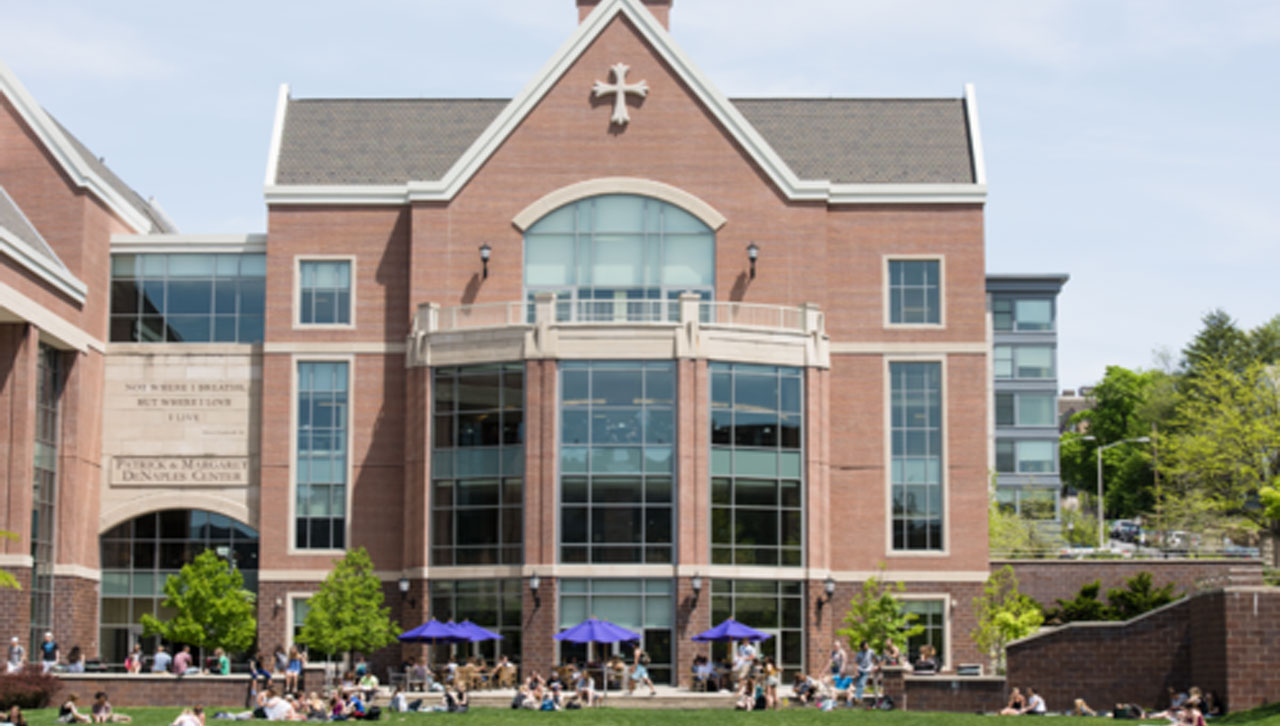
Join us for Dr. Cona's presentation "Staying in the struggle: Examining Social Justice Movements in America" on Thursday, Feb. 15 at 7 p.m. in 4th floor DeNaples Ballroom.
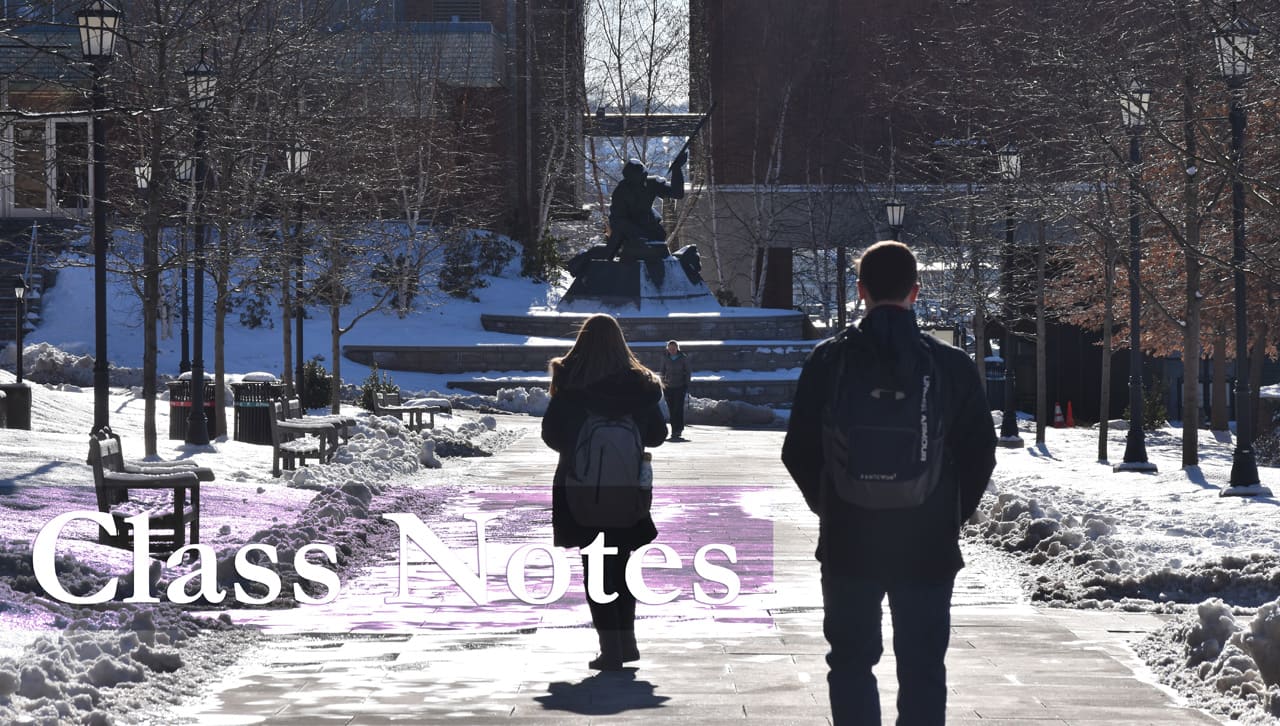
What's new with you? To submit a Class Note, visit the Class Notes Submission Page.
Stephen Brophy ’93, Arlington, Virginia, has joined the firm Husch Blackwell. Brophy will serve as senior counsel in the firm’s Technology, Manufacturing & Transportation industry group and International Trade practice team.
Justin Daly ’93, Great Falls, Virginia, was named, for the third consecutive year, one of the Top Lobbyists by The Hill. Daly founded Daly Consulting Group in 2012 after serving for over 15 years as a senior legal advisor to the US House of Representatives, US Senate, and Securities and Exchange Commission. The firm represents Fidelity Investments, Goldman Sachs, PwC, Travelers and other major financial institutions.
Kate Groark Shields ’97, Fort Washington, was named one of 2017’s “Top Women in PR” by PR News. Shields is president of Vault Communications, which was recently named to the Inc. 5000, the Philadelphia Business Journal’s “Soaring 76” list and the Philadelphia 100, a joint initiative of the Philadelphia Media Network, the Wharton Small Business Development Center and the Entrepreneurs’ Forum of Greater Philadelphia to recognize the 100 fastest-growing companies in the Greater Philadelphia region.
Deaths
Canio J. Sleyo ’41, Scranton
Robert K. Cavanaugh ’46, Scranton
Frank M. Lewis ’51, Washington, DC
Theodore Slachtish ’52, Moscow
Norman E. Woodworth, Lt. Col. (ret) ’52, Peckville
Joseph G. Huggler ’53, Bordentown, New Jersey
Stanley J. Exeter ’55, G’71, Moosic
Angelo A. Costanzo, D.D.S. ’57, Clarks Summit
James L. Horan ’58, Scituate, Massachusetts
Joseph Wascalis ’58, Binghamton, New York
Francis J. Pryal ’59, Edgewater, Maryland
Edward J. Earley, Ed.D. ’62, Fogelsville
Robert G. Meeker, Ph.D. G’62, Hazel Crest, Illinois
Terrence F. Gallagher ’63, Scranton
James P. McGraw, Jr. ’65, Scranton
Richard J. Carlonas ’67, Troy
Alfred Romitelli ’68, Peckville
Gerald J. McInerney, Jr. ’70, Elmira, New York
Clarence E. “Spud” Nachand, Jr. ’70, Dunmore
John W. Reckless ’70, Dunmore
John J. Ziskowski, M.D. ’70, Chillicothe, Ohio
Sr. Catherine Williamson, RSM G’72, Dallas
George MJ Petrus ’88, Sydney, New York
Craig K. Lockwood ’89, Pittston
Brian J. Musto ’12, Pittston
Friends' Deaths
Joseph Hardisky, father of Michael Hardisky, Ph.D. (faculty), father-in law of Debra Pellegrino, Ed.D. (dean of Panuska College),grandfather of Michael Hardisky ’00, G’02, Andrew Hardisky, DVM ’01, Denise Hardisky, DVM ’09 and Dana Hardisky, DVM ’10
Helen Skoritowski, mother of Joseph Skoritowski ’81
Births
A son, Kaius William, to Brian ’02, G’05 and Sharon Canale Eltz ’02, Millersville
A daughter, Morgan Abigail, to Michael ’05 and Sara Suchoski Carroll ’05, Montville, New Jersey
A daughter, Everly Susan, to Joseph ’08, G’09 and Susan Salisbury O’Connell ’08, Archbald
A daughter, Alice Joanna, to Michael ’11 and Elizabeth Lukowicz Sunkel ’11, Fieldsboro, New Jersey
Marriages
Kaitlyn Carey ’08 to Sean Kennedy
Diana Sorbera ’08 to James Wortman
Share Your Story With Your Royal Family.

Join us for Glynis Johns' presentation 'But You're Black: The Overlooked Community of Scranton, Pennsylvania' on Tuesday, Feb. 13 at 7 p.m. in DeNaples 4th floor, Room 405.

Join the Campus Ministries' office on Tuesday, Feb. 13 from 11:30 a.m.-1p.m. as we celebrate Fat Tuesday, the day before Lent. There will be King Cupcakes and if you get a BABY inside yours, you'll win a prize! We will also be hosting information tables on how we can help you observe the season of Lent using Pray, Fast and Give! For more information, please contact ellen.judge@scranton.edu.
Join the Campus Ministries' office on Tuesday, Feb. 13 from 11:30 a.m.-1 p.m. as we celebrate Fat Tuesday, the day before Lent.

Ashes will be distributed at three Catholic Eucharistic liturgies in the DeNaples Center Ballroom: 12:05 p.m., 4:40 p.m., and 8:00 p.m.

Mindfulness for Students, Staff
Through increased awareness of body sensations, thoughts and emotions and a reduction in stress sensations these introductory mindfulness practices are intended to enhance the participant's ability to more fully recognize and respond to the stressors of everyday life.
MONDAYS AND TUESDAYS
5pm - 5:30 p.m.
305 Weinberg Memorial LIbrary
Sponsored by the Center for Health Education and Wellness
for more information or to be added to the group email to get room changes and cancellations contact chew@scranton.edu.
These introductory mindfulness practices are intended to enhance the participant's ability to more fully recognize and respond to the stressors of everyday life.

A few spots are still available for the Study in Florence Summer Program sponsored by the Department of World Languages and Cultures and led by Drs. Caporale and Zanzana.

Are you interested in learning more about personal safety and basic self defense skills? If so please join UPD and register for the S.A.F.E. program!

Win free groceries next Friday! Grocery Bingo will take place on first-floor DeNaples at 9 p.m. Some of the prizes include free meal swipes, free food and other giveaways!

The Financial Aid Office surveys our current students residing in non-University owned off-campus housing to determine the expenses incurred so that an accurate student total cost of attendance may be determined.

Recommendations for the 2018-2019 Peter S. Graybar Memorial Scholarship are being solicited. The scholarship will provide assistance for students entering their junior social year next fall.
The Peter S. Graybar Memorial Scholarship was created by the class of 1993 to honor a beloved friend and classmate. The Scholarship will be awarded to a student who is active in extracurricular and community service activities and demonstrates personal impact on fellow students.
Recommendation forms and information sheets can be found in the Financial Aid Office or at scranton.edu/financialaid. Click on Scholarships and Grants; Additional Scholarship Opportunities.
DEADLINE: Friday, March 2, 2018.
Recommendations for the 2018-2019 Peter S. Graybar Memorial Scholarship are being solicited. The scholarship will provide assistance for students entering their junior social year next fall.

Our intensive summer course helps learners greatly improve their oral and written communicative abilities in Spanish. Students spend three weeks in Spain in the beautiful northern city of Pamplona, at the Universidad de Navarra.
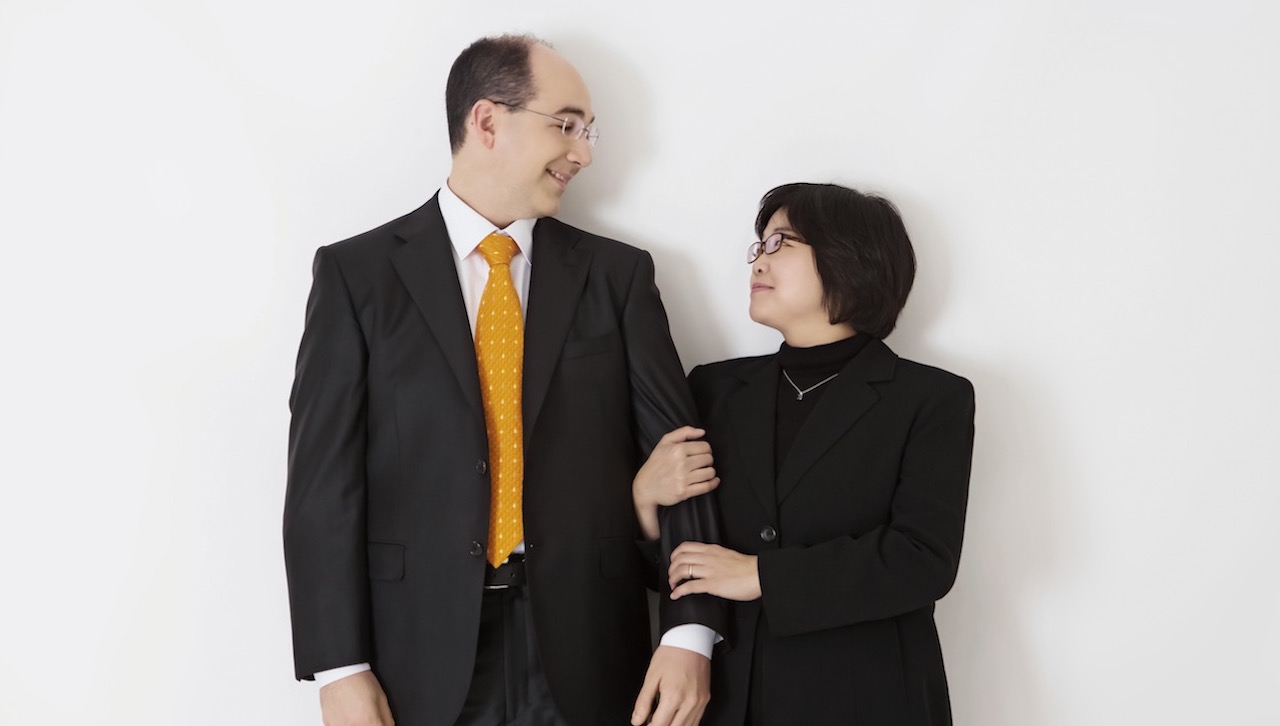
Performance Music at The University of Scranton will present a recital by the renowned husband-and-wife duo of cellist Mark Kosower and pianist Jee-Won Oh on Sunday, Feb. 18. The concert will begin at 7:30 p.m. in the Houlihan-McLean Center, Mulberry Street and Jefferson Avenue. Admission is free, with seating on a first-come, first-seated basis.
Earlier that day, Kosower will give a free masterclass for strings, with a primary focus on cello. The class is open to local amateur and professional string players, ages 16 and older. Those interested in taking part should email music@scranton.edu for more information.
This will be Kosower and Oh’s third performance at the University, said Performance Music Conductor and Director Cheryl Y. Boga, who first met the couple over a decade ago through her friend, Grammy Award-winning classical music composer, producer and recording guru Michael Fine.
“It’s not really cello with piano accompaniment when these two perform together. This is really more of a cello and piano duo. Everything they play, they play as a duo, and it’s remarkable,” Boga said. “He’s one of the greatest cellists alive and she is equally amazing.”
Kosower is currently the principal cellist for the Cleveland Orchestra, and has been called “a virtuoso of staggering prowess” by the Cleveland Plain Dealer. Early in her career, the South Korean-born Oh served as the studio pianist and assistant to the famed cellist Janos Starker for five years, and taught piano at Indiana University. Today, she gives recitals and chamber music concerts throughout the world.
The couple have performed together in concert throughout the United States and the world, with recent and upcoming engagements at the Great Performers Series at Lincoln Center, the National Gallery of Art in Washington, D.C., Philadelphia Chamber Music Society, Barge Music in New York City, the Kronberg Academy in Germany, the Sala Cecília Meireles in Rio de Janeiro, Kumho Art Hall in Seoul, South Korea, and many more.
In addition, Kosower and Oh have been frequent guests at numerous national and international chamber music festivals, and have recorded for the Ambitus, Delos, Naxos International and VAI labels.
Still, despite their very busy schedules, the couple has remained committed to teaching. Kosower is a member of the faculty at the Cleveland Institute of Music and the Kent/Blossom Music Festival, as well as a visiting distinguished professor at the University of Oregon. Oh, meanwhile, teaches and coaches clinics, workshops and masterclasses for solo and collaborative pianists.
“They’re in high demand all over the world, as players and teachers,” Boga said. “But when they play together, there’s this magic that, even if you didn’t know they were husband and wife, you would still know there was something amazing and extraordinary in their collaboration.”
For further information on the recital, call 570-941-7624, email music@scranton.edu, or visit scranton.edu/music. For more information on Kosower, visit colbertartists.com/mark-kosower. For more on Oh, visit pcmsconcerts.org/artist/jee-won-oh-piano.
Cellist Mark Kosower and pianist Jee-Won Oh to perform Sunday, Feb. 18, at 7:30 p.m. in the Houlihan-McLean Center at the University
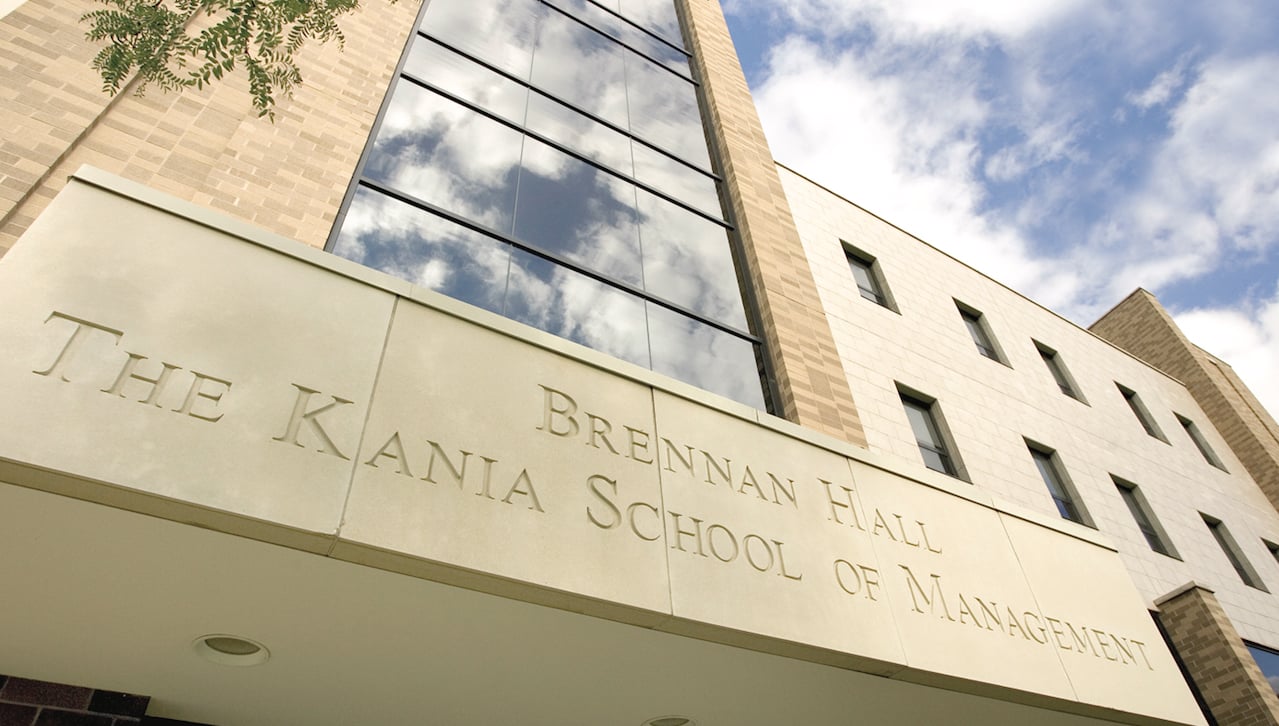
Accounting students from The University of Scranton will assist local residents with filing their federal, state and local tax returns as part of the Volunteer Income Tax Assistance (VITA) program. The students, joined by numerous professional volunteers organized by the United Way of Lackawanna and Wayne Counties with the support of several local organizations, will provide the free service to residents of Lackawanna and Wayne counties with household incomes of less than 54,000 for 2017. University students have participated in the VITA program for more than 30 years.
Walk-in VITA service without an appointment is available in room 111 of Brennan Hall, Madison Avenue, on the University’s campus on Mondays, Tuesdays, Wednesdays and Fridays from Feb. 5 to Mar. 7 and from Mar. 19 to Mar. 28. Service will also be offered on Tuesday, Apr. 3. Hours of service will be from 9 a.m. to 3 p.m. on Mondays and Wednesdays; from noon to 5 p.m. on Tuesdays; and from 9 a.m. to 1 p.m. on Fridays. Service on campus will be provided on a first-come, first-served basis and advance appointments cannot be scheduled. The University reserves the right to cap the number of walk-in residents they can serve within a single day.
Residents using the VITA service are asked to bring the following items: a valid photo ID; all W2 Forms; all 1099 forms (interest, dividends, pensions); real estate tax receipts for rent/tax rebate; Form 8332 for non-custodial parents; Social Security numbers or Individual Tax Identification Numbers (ITIN) for all taxpayers and dependents; W-7 forms if appropriate; information related to income and expenses (business, rental properties, sale of stocks); a personal banking account check if direct deposit is desired; and any documentation related to health insurance for themselves and anyone on the tax return, such as Form 1095-A, -B or -C, and paperwork from the Healthcare Market Place. Last year’s tax returns are also requested.
In addition to the University’s campus the VITA service is available by appointment only at the United Way of Lackawanna and Wayne Counties office at 615 Jefferson Avenue, as well as at additional locations in the area from February through the beginning of April. Limited appointments are available at some locations at this time. Appointments can be made online at uwic.net/taxes.
VITA program partners are The University of Scranton, The United Way of Lackawanna and Wayne Counties, Lackawanna College, United Neighborhood Centers of NEPA, the Lackawanna County Library System, the Consumer Credit Counseling Service of NEPA and the IRS.
Accounting students will join area professionals to provide free tax assistance to low and medium income residents through the VITA program.

Celebrate Earth Day with the Office of Sustainability throughout the months of March and April!
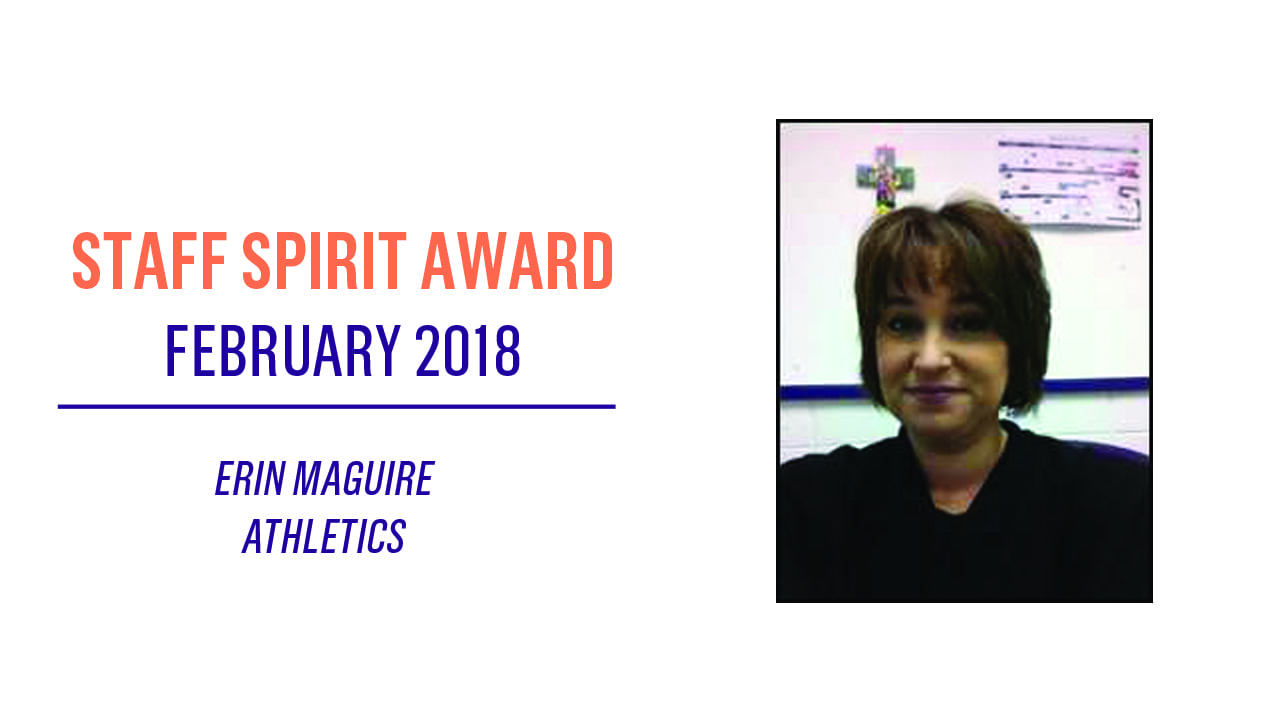
The University Staff Senate Recognition and Excellence Committee has picked the winner of the STAFF SPIRIT AWARD for FEBRUARY:
Erin Maguire
Athletics
Q&A With Erin:
How long have you worked at the University?
15 years
What is your title?
Athletics Operations Manager
What do you like best about your job?
Working with my co-workers
What do you like to do for fun?
Camping during the summertime
Other “Spirited” nominees this month were:
Susan
Eileen Notarianni, Human Resources
Charles Brown, Facilities Operations
Mehmed Okic, Facilities Operations
Creola Swanigan, Facilities Operations
John
James Savero, Facilities Operations
JoAnn Stavisky, Facilities Operations
Julia Leighow, Residence Life
Donald Bergmann, University Police
Lucy Grissinger, Office of Registrar & Academic Services
Frank Gilmartin, Center for Career Development
Sarah Connelly, Residence Life
Laura Richards, Marketing Communications
Karen Marx, KSOM Advising Center
Michael Ritterbeck, Center for Student Engagement
Joseph Anticoli, Facilities Operations
Lisa Cornell, Office of Registrar & Academic Services
Ann Keeler, Counseling and Human Services
Melissa Afshari, Graduate Admissions
Don McCall, IT Services
Erin will receive a certificate for $50 worth of complimentary food at our fabulous University food service outlets. Each monthly winner is also invited to the Senate Recognition luncheon in May to receive a certificate of appreciation. We congratulate our “winner” and all the other nominees for being recognized as “Spirited” employees.
We hope you will join the Staff Senate in recognizing and nominating employees in the future and share our excitement for giving individuals the opportunity to be acknowledged for their outstanding efforts on behalf of our campus community.
The nominations must be submitted by the 26th of the month for the next drawing to pick a winner.
You can use this link to obtain a nomination card.
The card may be completed online and forwarded to Mary Ellen Pichiarello (maryellen.pichiarello@scranton.edu). You may also print it out and send via mail to Mary Ellen in LSC, Room 580. In addition, Spirit Nominating Cards will be available to Facilities Operations and University Police personnel through their supervisory chains of command.
Erin Maguire is the Staff Spirit Award Winner for February!